FR ANCHISE


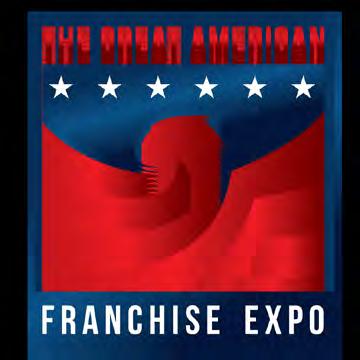












The Great American Franchise Expo is the USA's premier franchise expo series. Experience the power of virtual reality & tour the world's top franchise brands from the expo floor. Educate yourself with the largest & most comprehensive series of seminars on franchising & business ownership.
• Choose from hundreds of concepts in dozens of industries.
• Meet franchise law experts to guide you through the legal process
• Learn about financing options to fund your new business.
• Interact with quality franchise company executives.
PROUD MEMBER
















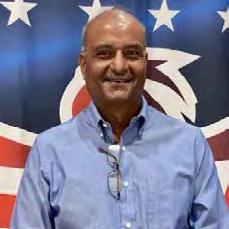



















Seema Govil: From Storytelling to Franchising – The Global Journey of a Franchise Visionary by Nick Neonakis
Franchising and Indian Americans: A Growing Force in Business Ownership by Seth Lederman
What I’ve Learned About Business, Culture, and Hustle from my IndianAmerican Friends by Alex Neonakis
Tradition reimagined, elegance redefined— Sanjh Dallas, a love Letter to Indian cuisine by Seema Govil
Bollywood Meets Hollywood: How Indian Dance & Music Studios Are Building a $500M Fitness and Wedding Franchise Empire by Jack

The Trinity of Indian Culture: Pathways to Personal Discipline and Collective Success by K G LeRoy
Brewing Boldness: How ThirsTea’s Founders Are Shaking Up the Boba Scene by Kapil Manocha 54 The South Asian American Impact: Demographics, Ownership, and the Next Generation of Business Leaders by Jack Tiwari
From Oncology to Optimal Wellness: Why Dr. Veena Chandrakar Chose The DRIPBaR Franchise by India Franchise Council
From Roots to Results: How Indian American Franchisees Are Shaping the Business Landscape by TJ Treat
66 The Visionary who transformed Adobe into a Global Tech Powerhouse by Jatinder Taneja 70 From Tamil Nadu to Michelin Stars: The Unapologetic Success of Chef Vijay Kumar by Sadish Kumar Jayachandran 74 Next Level Growth: What We Build, and What Builds Us by Rashmi Airan
78 Beyond the Indian Film Industry: India’s Expanding Footprint in Global Entertainment by Bhavana Taneja 82 Floor Coverings International is a Great Choice for Couples in Franchising by Rhonda Sanderson
What Happened When Cork & Candles’ Franchisor Stepped Up For His First Franchisee by Joshua
Chatime: Brewing Global Connection Through Boba—and Bold Heritage by Joe Carter
Indian Americans: A Leading Force in Business, Innovation, and Growth by
More Than a Meal: The Discipline of Indian Food Traditions by
Afghan Americans: A Community Rebuilding with Resilience and Resolve by
From Code to Core: Saurabh Choudhury’s Journey from Tech Exec to Fitness Franchisee by
Pouring Joy Into the Community: How One Couple Found Purpose Through Hawaii


Bangladeshi Americans: A Rising Community Driven by Education, Enterprise, and Ambition by
How Swimming Set the Course for My Leadership in Franchising by Amy Albiero
From Corporate Finance to Childcare Pioneer: The Jay Shah Story by India Franchise Council
India Wasn’t Just a Destination—It Was a Mirror, a Teacher, and a New Beginning by India Franchise Council
The Ambush Effect: How Well-Meaning Advice Can Derail Your Future by Mark Martuza
What is best for Veterans – Job, Career, or owning a Franchise? by Chuck Barson
Reel Discipline: What Indian Cinema Teaches Us About Success and Habits of Success by India Franchise Council
Aruna Miller: A Journey of Growth and Charting a Course of Progress and Inclusivity
Bhutanese Americans: Two Journeys, One Resilient Community by India Franchise Council
From Sari to Street Style: The Global Rise of Indian Fashion by India Franchise Council

162 Manjit Minhas: Brewing Success and Breaking Barriers in North America by India Franchise Council
166 At Bungalow, Chef Vikas Khanna Turns New York Into a Temple of Indian Tradition—One Sacred Dish at a Time by India Franchise Council
170 CLUB SCIKIDZ
Trailblazers in STEM Enrichment: Sourov & Tuli Bring Club SciKidz to Silicon Valley
174 Pakistani Americans: A Resilient Community Advancing in Education, Enterprise, and Civic Life by India Franchise Council
178 Sacred Roots, Global Reach: Honoring India’s Wellness Heritage Amidst Modern Appropriation by India Franchise Council
182 COREPOWER YOGA
The CorePower Effect: How One Brand Wrote the Playbook for Yoga Franchise Success by India Franchise Council
186 Maldivian Americans: A Tiny But Distinctive Community by India Franchise Council
190 From Code to Croissants by India Franchise Council
194 U.S. Navy Veteran Uses His Broad Skillset to Transition to Career with the No. 1 Home Inspection Franchise in North America by Rhonda Sanderson
198 Dylan Chatterjee’s Sweet Reinvention: From Hollywood Sets to Milkshake Magic by India Franchise Council
202 The Rise of Nepali Americans: A Community on the Move by India Franchise Council
206 Spices, Stories, and Soul: How Indian Cuisine Brings People Together by India Franchise Council
210 From Lunchtime Conversations to AI-Powered Video Disruption: The Hippo Video Story by India Franchise Council
214 India’s Timeless Traditions: How Ancient Culture Shapes Modern Identity by India Franchise Council
218 IBUY APP
A Game-Changer for Local Business Advertising — and a Recurring Revenue Engine for Franchisees by Harold Montgomery
222 CRAYOLA® IMAGINE ARTS ACADEMY™
Color, Culture & Commerce: Why Crayola® Imagine Arts Academy™ Resonates with South Asian-Inspired, Education-Minded Entrepreneurs by Vernon Gonsalves
228 ASK THE RESULTS GUY™
Why Signage Should Be Part of Your Strategic Growth Plan by Tony Jeary
232 Sri Lankan Americans: A Small but Exceptionally Educated and Thriving Community by India Franchise Council
236 First Generation. Global Impact. by Mevlut Hilmi Cinar




Walk into any boardroom in Silicon Valley, real estate conference in Dallas, or franchise expo in New Jersey, and you’ll see something undeniable: Indian-Americans are shaping the future of American business. Once considered a quiet immigrant group focused on medicine, academia, and engineering, Indian-Americans are now among the most influential entrepreneurial forces in the United States. From building billion-dollar tech empires to operating multi-unit franchise chains and launching venture-backed startups, they are rewriting the American dream in their own handwriting—often in more than one language. As someone who works closely with founders and franchisees across the country, I’ve witnessed firsthand the rise of Indian-American entrepreneurs—and their unmistakable impact on the franchise world and beyond. This isn’t a trend. It’s a transformation.
To understand the surge, it helps to understand the values. Many Indian-Americans are the children of immigrants who came to the U.S. with limited resources but boundless ambition. They grew up watching their parents work long hours in gas stations, hotels, motels, Dunkin’ Donuts, and Subway franchises. Those experiences didn’t just build work ethic—they planted seeds of ownership.
In Indian culture, business ownership isn’t just a career path. It’s a sign of self-reliance, family legacy, and upward mobility. Entrepreneurship is often viewed not as a leap, but as a duty.
The numbers back it up: While Indian-Americans make up roughly 1.5% of the U.S. population, they represent nearly 70% of hotel ownership (according to the Asian American Hotel Owners Association), are major players in convenience store and liquor store operations, and are increasingly active in franchising, private equity, and tech.
ROLE MODELS WHO PAVED THE WAY
To understand this rise, you have to look at the leaders who helped shape it.

Indra Nooyi – As former CEO and Chairperson of PepsiCo, Nooyi broke barriers not just as an Indian-American, but as a woman of color in the maledominated world of Fortune 500 leadership. Her rise from Chennai to Yale to the top of PepsiCo is the blueprint for a global business career. She emphasized sustainable growth, diversity, and longterm vision—values that many Indian-American founders now weave into their own companies.
the cornerstone of multi-unit development. Whether it’s owning 50 Burger Kings or building a regional empire with 7-Eleven, their operational discipline, financial prudence, and long-term thinking give them an edge in a competitive landscape.

Vivek Ramaswamy – Love him or disagree with his politics, Ramaswamy built a billiondollar biotech empire (Roivant Sciences) before the age of 35 and has become a cultural lightning rod. His journey from Harvard to hedge funds to founder is emblematic of a generation that’s not waiting for permission to speak up or take risks.

Rajinikanth “Raj” Bhakta – A lesser-known figure in mainstream circles but a fascinating one in the entrepreneurial world, Bhakta turned a reality TV appearance into a successful spirits brand, Bhakta Brandy, and before that founded WhistlePig Whiskey. His career shows how Indian-Americans are diversifying into heritage American industries—bourbon, anyone?—and making them global.

Jay Chaudhry – The founder of Zscaler, a cybersecurity firm now worth over $25 billion, is another reminder of how Indian-born entrepreneurs dominate Silicon Valley. Chaudhry’s humility is as notable as his success: he famously says he has never had to take venture funding thanks to sound fundamentals and timing.
In franchising, Indian-Americans have become
Why do Indian-Americans thrive in franchising? Simple. Franchising aligns perfectly with cultural values around stability, family, and scalable growth. Franchise models offer clear systems, brand recognition, and operational playbooks. For Indian-American entrepreneurs—many of whom come from STEM or finance backgrounds—these are dream frameworks. They understand SOPs, KPIs, and ROI instinctively. And they often pool family resources or community capital to fund multi-unit growth quickly.
One Indian-American couple I recently worked with built a 12-location hair salon franchise in less than four years, with two kids and full-time jobs on the side. Another family I met owns 27 convenience stores in Texas and is now moving into health and wellness franchising to diversify. These aren't anomalies. They're becoming the norm.
There’s also a unique structure of informal support within the community. Cousins, friends, and neighbors often share business plans, supplier tips, and even employees. Success, in this world, is contagious.
Another driving force is education. IndianAmericans have the highest educational attainment of any ethnic group in the U.S. Over 70% have at least a bachelor's degree. That translates into not just skills, but confidence. It’s one reason why Indian-Americans have launched companies like Google (Sundar Pichai), Adobe (Shantanu Narayen), and YouTube (Neal Mohan is the current CEO).
But degrees aren’t enough. It’s the execution that matters.
Indian-American founders are known for playing the long game. They often work 14hour days for 10 years without needing external validation. They favor ownership over flash. Cash flow over venture hype. Operational mastery over PR headlines.

They also build ecosystems. Attend any franchise investment seminar or commercial real estate summit, and you’ll see IndianAmerican entrepreneurs mentoring younger cousins, partnering with in-laws, or co-investing with lifelong friends. This ecosystem approach is powerful. It turns individual success into community uplift.
What’s next for Indian-American entrepreneurs? Scale and influence.
More are entering emerging sectors: EV charging stations, medical aesthetics, techenabled franchises, and pet services. Some are becoming franchisors themselves—building concepts rooted in health, wellness, Ayurveda, and hospitality, and bringing Indian cultural richness into mainstream consumer experiences.
We’ll also see a new wave of second-generation founders who grew up in U.S. suburbs but carry their heritage with pride. They’re Ivy Leagueeducated, digitally fluent, and globally ambitious. They’ll fund their dreams not with loans from parents but with venture capital and pitch decks.
At the same time, Indian-American investors are now creating their own venture funds, private equity firms, and multi-family offices. They’re not just participants in the American economy— they’re becoming architects of it.
The Indian-American entrepreneurial journey is still unfolding, but it’s already one of the great American success stories. What started with corner stores and motel ownership has evolved into boardrooms, billion-dollar startups, and national franchise footprints.
As we look to the future of business ownership—especially in franchising—IndianAmerican entrepreneurs will be at the center of it. They bring discipline without rigidity, ambition without arrogance, and tradition without limits.
And perhaps most importantly, they remind us that the American Dream is still alive. You just have to be willing to work for it.
Nick Neonakis Editor, Franchise Journal



DESIGN DIRECTOR
Pete Neonakis
DIGITAL DIRECTOR
Chantae Arrington
ART DIRECTOR
Brenda Lesch
SENIOR EDITOR
Steve Belko
SENIOR CONTRIBUTING
EDITOR
Joe Fox
ONLINE EDITOR
Seth Lederman
STAFF WRITER
Megan Neonakis
SOCIAL MEDIA
EDITOR
Ted O'Shea
ASSOCIATE EDITOR
Mariel Miller
ONLINE EDITOR
Greg Gasparini
VIDEO PRODUCER
Matt Panepinto
CONTRIBUTORS
Amy Albiero
Rashmi Airan
Chuck Barson
Joshua Best
Vernon Gonsalves
Seema Govil
Sadish Kumar
Jayachandran
Tony Jeary
Seth Lederman
K G LeRoy
Kapil Manocha
Mark Martuza
Harold Montgomery
Alex Neonakis
Nick Neonakis
Rhonda Sanderson
Bhavana Taneja
Jatinder Taneja
Jack Tiwari
TJ Treat





by Nick Neonakis, Founder, The Franchise Consulting Company

Seema Govil’s journey is as dynamic and inspiring as the many stories she’s told—as an author, filmmaker, and now a globally recognized Franchise Consultant with The Franchise Consulting Company. She also serves as Vice President of the India Franchise Council. Once behind the camera interviewing world leaders and celebrities, Seema now sits across from aspiring entrepreneurs and visionary founders, guiding them through the transformative world of franchising.
Seema Govil’s early career reads like a cinematic script— journalist,Podcaster, author, and documentarian with a keen eye for uncovering human stories. Her roles as a correspondent with TV Asia and host of the podcast Fablife360 provided her with opportunities to interview top-tier individuals. Her passion for storytelling led her to travel extensively, capturing voices from every corner of society: artists, politicians, scientists, and visionaries. At the height of
her media career, she conducted interviews with high-profile figures.She also flew to India in 2022 to create a documentary for the non-profit Akshaya Patra.

But storytelling for Seema was never just about documentation—it was about transformation. Her natural curiosity and empathetic approach allowed her to unearth the deeper truths behind people’s journeys. Over time, she recognized a recurring theme: people are hungry for purpose, ownership, and freedom. That realization would eventually lead her to her next act—one that’s just as transformational, but in a very different industry.
The pivot from PR Media consultant, a filmmaker, journalist and a podcaster to a franchise consultant might seem unusual, but for Seema Govil, it was a natural evolution. “Every business has a story,” she says. “Franchising is simply another form of storytelling— except now, we’re helping people write the next chapter of their own lives.”
Today, Seema is a leading consultant at The Franchise
Consulting Company, one of the most respected franchise brokerage firms in the world. Based in Texas with her family, she serves clients across continents, helping aspiring business owners find the right franchise and guiding companies through the process of scaling through franchising. Her background in media gives her a unique edge: she listens deeply, asks the right questions, and finds the heartbeat of a brand—whether it’s a local coffee shop or a multinational service franchise.
Franchising can be overwhelming, especially for first-time entrepreneurs. With hundreds of industries, thousands of brands, and a constant influx of new concepts, it’s easy to feel lost. That’s where Seema Govil comes in. Her approach is rooted in clarity, education, and alignment.
“I see myself as a matchmaker,” Seema explains. “It’s not about selling a franchise. It’s about helping people make informed decisions that align with their goals, lifestyle, and vision of success.”
She takes the time to get to know each client—what drives
them, what their risk tolerance is, what kind of legacy they want to build. From there, she curates franchise opportunities that meet their criteria, often presenting options they hadn’t previously considered. Whether it’s a home-services brand with low overhead or a boutique fitness concept with explosive growth potential, Seema focuses on sustainable models that offer both personal fulfillment and strong returns. Her clients span the globe— from India to Dubai, India, London to Los Angeles. Many are professionals transitioning from corporate roles, while others are immigrants or veterans looking for a path to independence. Seema’s multicultural background and global mindset allow her to work seamlessly across cultural boundaries, making her a trusted advisor in both domestic and international franchise deals.
In addition to helping people buy franchises, Seema also works with business owners who are ready to franchise their own companies. This side of her work involves strategic advisory—developing franchise models, helping with documentation, marketing

strategies, and creating scalable systems.
This is where her storytelling skills shine once again.
“Franchising is more than a financial model,” Seema says. “It’s about brand culture. It’s about what makes this business unique and replicable. My job is to help business owners translate their values, their systems, and their essence into something another entrepreneur can follow and succeed with.”
One of her recent projects involved helping a boutique wellness brand expand into three countries within its first year of franchising. Another, a food-tech company based in New Delhi, is now preparing
“EVERY BUSINESS HAS A STORY. FRANCHISING IS SIMPLY ANOTHER FORM OF STORYTELLING—EXCEPT NOW, WE’RE HELPING PEOPLE WRITE THE NEXT CHAPTER OF THEIR OWN LIVES.”
— Seema Govil
to enter the U.S. market with Seema’s guidance. Seema is also all charged up to take American companies to open locations in India.
Seema’s work ethic and vision are deeply influenced by her family and cultural roots. Living in Texas with her husband and children, she balances her global business with a grounded home life. Her family is actively involved in community service, and she often mentors young women looking to enter entrepreneurship. She has received numerous awards and accolades, with the most recent presented on Women’s Day at the Capitol in Washington, D.C., where she was honored for her outstanding leadership by U.S. Congressman Danny K. Davis. One of Seema's philanthropic endeavors took her to Jaipur, India, where she filmed the documentary Let's Rewrite Their Story, highlighting the impactful work of the Akshaya Patra kitchens and schools
As someone who has navigated multiple careers, countries, and industries, Seema serves as a role model for adaptability and purposedriven success. She often speaks at franchise expos and entrepreneurship conferences, inspiring others to think beyond traditional careers and take control of their financial futures.
Seema Govil is not just building a career—she’s building

a legacy. With her unique blend of media savvy, global perspective, and business acumen, she’s reshaping how people approach franchising. To her, every person who finds the right franchise, every business that successfully scales, is a story worth telling. She is also developing a podcast -FranchisingZen focused on entrepreneurship through franchising—sharing the stories of clients who’ve built multi-unit empires, left corporate burnout behind, or created generational wealth through business ownership. Just as she once gave voice to underrepresented stories through film, she now gives people the tools to shape their own entrepreneurial narratives.
SEEMA, IS A FORCE WRAPPED IN FINESSE — A POETIC POWERHOUSE WITH AN EYE FOR DETAIL AND A HEART FOR IMPACT. Seema Govil exemplifies the modern franchise consultant:Her journey— from interviewing the most powerful voices in India to empowering everyday people around the world—is a testament to the power of reinvention, connection, and purpose.
In an era where people crave autonomy and impact, Seema offers something invaluable: not just a business opportunity, but a blueprint for freedom, ownership, and transformation. Seema’s world is a vibrant mix of style, strategy, and soul.
To reach out to Seema pls call 512-762-7387 or email her at Seema@ thefranchiseconsultingcompany.com and see how she can help you.













by Seth Lederman, Consultant, The Franchise Consulting Company
The American dream of entrepreneurship is alive and thriving among Indian Americans—one of the fastest-growing and most economically successful immigrant groups in the United States. According to the Pew Research Center, an estimated 5.2 million people in the United States identified as Indian in 2023. While various ethnic groups have made their mark on franchising, Indian Americans (and South Asians more broadly) are increasingly standing out for their high rates of ownership, strong
community networks, and strategic approach to business. From hotel chains to fast food restaurants to senior care services, Indian Americans are not just participating in franchising—they’re dominating key sectors and reshaping the landscape.
While official data specific to Indian Americans in franchising is sparse, anecdotal evidence and broader business statistics paint a compelling picture. According to the U.S. Census Bureau and Pew

Research Center, Indian Americans are the highestearning ethnic group in the country, with a median household income surpassing $120,000 as of 2023. This financial leverage, combined with a strong entrepreneurial spirit, has led many to invest in franchising as a path to scalable, stable business ownership.

With Indian American-owned hotels across the United States numbering around 34,000— nearly 60 percent of all hotels located in the U.S.—the influence of Asian Americans in this sector is extremely strong. Need further evidence? The Asian American Hotel Owners Association (AAHOA) has more than 20,000 members and represents more than 60% of U.S. hotel ownership. In the quick-service restaurant space, Indian Americans are increasingly visible as owners of many convenience and food brands.
Though national franchising success rates vary by industry, Indian American franchisees are often reported to outperform peers in profitability and longevity. The reasons for this lie in a distinctive cultural mindset and a highly strategic, longterm approach to wealth creation.
“SELF-BELIEF
HARD
— Virat Kohli
• Family and Community Networks: Indian American families often operate franchises as multigenerational enterprises, pooling capital and labor. This communal approach reduces operational costs and provides built-in succession planning—key for franchise sustainability.
• Education and Professional Backgrounds: Many Indian Americans come from STEM and finance backgrounds and apply data-driven decisionmaking to their franchise investments. Their ability to manage books, analyze market trends, and run operations efficiently gives them an edge.
• Risk Appetite and Resilience: Unlike individualistic entrepreneurial ventures that depend on a singular founder’s idea, franchising offers a playbook. Indian Americans—many of whom are first- or secondgeneration immigrants— are drawn to this blend of structure and risk mitigation. They're not afraid of hard work but prefer systems that reward persistence.
• Work Ethic and Operational Rigor: Whether managing long shifts or upholding franchise
brand standards, Indian Americans often bring a level of discipline and operational intensity that translates into customer loyalty and profitability.
Certain industries have proven especially attractive to Indian American franchisees. These are the top five:
1. Hospitality and Lodging
This remains the largest concentration of Indian American franchise ownership. The sector's high upfront costs are often offset by long-term asset appreciation and familyrun efficiency.
2. Quick-Service Restaurants (QSRs)
Brands like Dunkin’, Subway, Taco Bell, and Pizza Hut are favored for their replicable operations and name recognition. Indian Americans often buy into multiple units at once or scale over time.
3. Gas Stations and Convenience Stores
Combining retail and food services, these operations appeal to multi-business operators and those with real estate knowledge.
4. Senior and Home Health Care Franchises
These brands are gaining traction among secondgeneration Indian Americans who prefer service-based businesses with community impact.

5. Education and Tutoring Franchises
Given the cultural emphasis on academic achievement, franchises like Kumon, Mathnasium, and Sylvan appeal to Indian Americans seeking mission-aligned investments.
If you’re a franchisor aiming to reach this influential demographic, the path forward involves respect, relevance, and relationship-building.

As with any minority group, representation matters. Showcase success stories of Indian American franchisees in your marketing materials. Representation not only resonates—it builds trust.
Consider engaging prominent Indian American owners as brand ambassadors.
Understand key cultural values like family legacy, education, and longterm wealth. For example, promoting how your franchise can support multigenerational involvement or offer legacy planning can be highly persuasive.
While most Indian Americans are fluent in English, marketing materials that show awareness of cultural celebrations (like Diwali or Holi), family values, and community ties can signal authenticity.
Many Indian American investors are sophisticated capital planners. Offering financing tools or tiered multiunit agreements will appeal to their growth mindset. Additionally, Indian American franchisees often look for dependable ROI and strong operational support. Be clear about the franchisee success rate, available mentorship, and training programs.
What’s especially exciting is the evolution of Indian American franchising into new frontiers. Secondgeneration Indian Americans, born and raised in the U.S., are increasingly blending cultural heritage with modern entrepreneurship. Some are stepping into legacy businesses but
transforming them with tech, digital marketing, or service innovation. Others are moving beyond traditional sectors into fitness, beauty, pet care, or fast-casual concepts that align with newer consumer trends. This generation brings a dual identity—rooted in immigrant values but fluent in American consumer culture. Franchisors who want long-term partners should start planning not just for franchisee recruitment but for intergenerational continuity. Indian Americans have carved out a formidable space in the American franchising landscape through hard work, strategic investment, and cultural cohesion. They represent one of the most promising— and underleveraged— demographics in franchising today. For franchisors, the message is clear: engaging Indian American entrepreneurs is not just good optics—it’s good business. By understanding the values that drive this community and offering inclusive, culturally aware pathways into franchise ownership, brands can tap into a demographic known for high performance, strong loyalty, and a passion for long-term success. Want to learn more? Contact Seth Lederman with Frannexus.
Seth Lederman, CFE, a Franchise Acquisition and Development Specialist, is a multi-faceted entrepreneur with over 30 years of experience in small business success, including ownership and sale of his business enterprises. He is a frequent contributor to The Franchise Journal and is on the exclusive Forbes Business Council. Contact Seth at seth@ thefranchiseconsultingcompany.com.













































































































































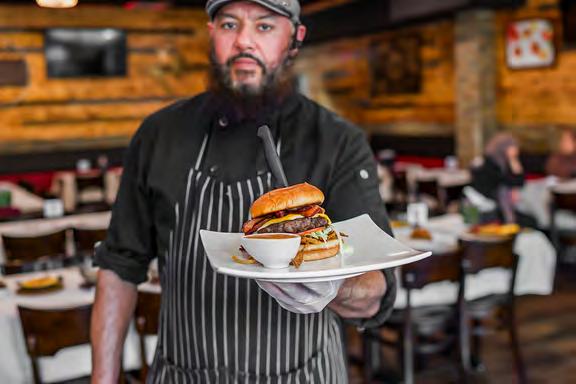



by Alex Neonakis, Writer
When you’re a kid growing up in America, you start noticing patterns early. You notice who stays late after class, who asks the hardest questions in math, who already has their own YouTube channel, and who somehow manages to get straight A’s while running a tutoring business on the side. In my school, more often than not, those people are my Indian-American classmates. As someone who wants to study business in college and maybe own my own company one day, I’ve started paying more attention to who’s doing what—and why. And I’ve realized something pretty eyeopening: Indian-Americans are playing a huge role in the future of business ownership in the United States. They’re not just starting companies. They’re dominating in a quiet, disciplined, no-excuses kind of way that’s honestly inspiring. I’ve also realized something else: I love Indian food. Let me explain.
OVER 50% OF ALL MOTELS IN THE U.S. ARE OWNED BY INDIAN-AMERICANS, MANY OF WHOM COME FROM A SMALL GROUP OF VILLAGES IN GUJARAT.


At my high school, a large percentage of the students in AP classes, robotics club, and math league are IndianAmerican. These aren’t just smart kids—they’re driven
in a way that’s hard to put into words. They take their schoolwork seriously. Really seriously. While most kids might cram the night before a test, my Indian-American friends start preparing two weeks out, doing extra practice problems for fun.
Some of them have parents who are doctors, engineers, or small business owners. And they talk about those jobs with pride, but also with this sense of responsibility—like they’re
expected to build on what their parents started. There’s a quiet pressure in their lives, but also a sense of purpose. It’s not just about getting into college. It’s about doing something meaningful after college. I asked one of my friends once why he studies so hard, and he said, “Because my parents left everything behind so I could have opportunities. The least I can do is take them seriously.” That stuck with me.
What’s interesting is that a lot of Indian-American families in my town own businesses. Some own Dunkin’ Donuts or gas stations. Others run tech consulting firms or own multiple real estate properties. These aren’t flashy Instagram businesses—they’re the kind that run smoothly, turn a profit, and pay for college tuition, family trips, and future investments.
I started researching more and learned that IndianAmericans make up less than 2% of the U.S. population, but they own a huge portion of the hotels, convenience stores, and franchise restaurants across the country. In fact, over 50% of all motels in the U.S. are owned by Indian-Americans, many of whom come from a small group of villages in Gujarat. It blew my mind. I used to think of business ownership as something only big-shot CEOs did. But it turns out, owning a franchise or a local business is just as powerful—and often more sustainable. IndianAmerican families have figured that out.
Now, about the food.
If you haven’t had homemade butter chicken, dosas with chutney, or fresh biryani cooked by your friend’s mom, you are seriously missing out. I’ve been lucky enough to be invited to a few Diwali parties and family dinners, and the food is nextlevel. But it’s not just about the flavors (which are awesome)— it’s the culture around the food that stands out.
There’s always a sense of community, tradition, and hospitality. Whether it’s grandparents, cousins, or younger siblings, everyone’s included. And a lot of the conversations end up being about goals—who’s applying where, who’s launching a business, who’s trying to become a doctor or coder or entrepreneur.
It’s a different kind of dinner table. You leave feeling full— and motivated.
As I get ready to apply to college and think about my future, I find myself looking to my Indian-American classmates as examples. They’ve taught me that:
• Hard work isn’t optional—it’s the starting point.
• Education matters, not just for getting into college, but for building confidence and credibility.
• Owning a business isn’t about ego—it’s about independence and opportunity for your family.
• Culture and community make you stronger, not weaker.
There’s something powerful about seeing your friends take things seriously. It makes you want to rise to the occasion too.
I think one of the best things about growing up in the U.S. is getting to see so many different kinds of people succeed in so many different ways. Diversity isn’t just a buzzword. It’s what makes the business world more creative, more competitive, and more interesting.
It also means there’s no one right path. But watching how Indian-American families invest in education, support each other, and build generational wealth through business has made me think differently about what success can look like. It’s not just about getting rich. It’s about building something that lasts—and sharing it with the people you care about.
I don’t know exactly what I’ll do yet. Maybe I’ll go into finance. Maybe I’ll launch a business. Maybe I’ll franchise something cool and bring it to new cities. But I know this— whatever I do, I want to take it as seriously as my IndianAmerican classmates take their schoolwork, their families, and their futures.
And when I finally make it, I’m celebrating with samosas.
Alex Neonakis is a high school student who loves business, history, basketball, and butter chicken. He’s passionate about entrepreneurship, exploring different cultures, and finding the best food spots with his friends.


Founded by entrepreneurial brothers Nealesh and Nimesh Dahya, Mesh Brands was born from a shared passion for restaurants and a proven ability to scale franchise operations. Their combined experience across ownership, operations, and development ensures that every brand under the Mesh umbrella is poised for strategic, sustainable expansion.
When you franchise with a Mesh Brands concept, you’re backed by a powerhouse team of seasoned restaurant professionals. Our leadership has built and operated hundreds of successful restaurants across the country, and that experience goes directly into supporting your success. From site selection to grand opening and beyond, you’ll benefit from hands-on guidance, responsive communication, and systems that are built to scale.







Artistic Edge is a mobile art studio that offers a variety of creative workshops, team-building events, and private parties. Our classes are designed for all skill levels, with instructors providing guidance throughout the process. Many of our projects result in functional art pieces that can be used in daily life. We emphasize community, creativity, and care, aiming to make art accessible and enjoyable for everyone.



High margins
Low overhead
Low initial investment
Flexible Schedule


No artistic experience needed










by Seema Govil, Consultant, The Franchise Consulting Company
I've had my fair share of Indian meals in Dallas, but the new menu at Sanjh genuinely left an impression. The restaurant
itself feels like an occasion— lavish without being overdone, warmly lit, with a modern elegance that mirrors what’s happening in the kitchen.

Under Executive Chef Sarabjit Singh Assi, the new menu strikes a thoughtful balance between
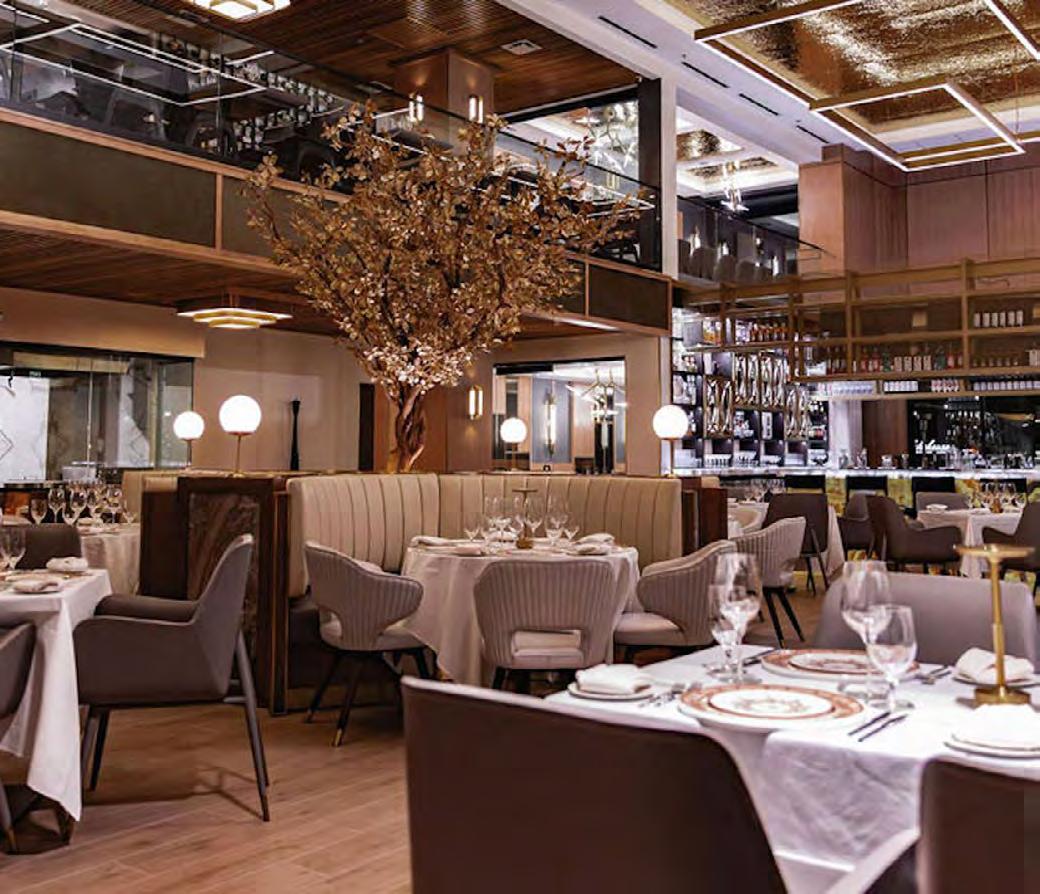

tradition and technique.
Chef Assi and his team—14 chefs, each specializing in a distinct craft—aren’t just cooking; they’re curating an experience. And it shows. Take the Dahi Puri, for instance: crisp spheres filled with tangy yogurt foam and topped with seasonal berries. It’s a playful, precise bite— light, unexpected, and deeply satisfying. The Truffle & Blue Cheese Kulcha is one of those dishes you think you’ll just sample, only to find yourself finishing it. Rich, earthy, and indulgent, yet never overwhelming.
What I appreciated most was the restraint. The flavors are layered, but never crowded. Dishes like the Prawn Mango Curry and Saag Anjeer ke Kebab showcase spice with clarity—not heat for heat’s sake. The tandoors (yes, plural—three, each with its own heat profile) lend a subtle smokiness that ties many dishes together.
Seema Govil, a Versatile Leader: Bridging the Worlds of Franchise Consulting, Media, and Philanthropy as the Founder and CEO of Cosmo City Media. For franchising help, contact Seema at Seema@thefranchiseconsultingcompany.com.












by Jack Tiwari, Consultant, The Franchise Consulting Company
In a repurposed warehouse in downtown Los Angeles, a group of sweat-drenched professionals kick and spin to the infectious beat of Naatu Naatu. Across the country in Miami, a tech CEO perfects his Kathak footwork over Zoom, while in New Jersey, 12 bridesmaids rehearse a choreographed sangeet performance for a multimilliondollar Bollywood wedding.
This isn’t Mumbai or Delhi—it’s the new frontier of American fitness, entertainment, and weddings, where Bollywoodinspired dance studios, music academies, and event producers are crafting a half-billion-dollar franchise niche. What started as a cultural preserve for Indian immigrants is now a scalable business model attracting Gen Z gym-goers, high-spending wedding clients, and Hollywood talent scouts alike.
Driven by cultural pride, social media virality, and a global appetite for theatrical flair, Indian dance and music ventures in the U.S. are raking in revenue. According to IBISWorld, U.S.-based Indian dance studios alone generate

over $220 million annually. But when you factor in event choreography, streaming platforms, and high-budget weddings, that number climbs closer to $500 million—with projections nearing $1 billion in the next decade.
Three business models dominate the space:
1. Fitness Franchising: Bollywood as Cardio Studios like BollyX have turned bhangra into boutique fitness gold. With 45 U.S. locations, classes range from $25 to $35 per session and draw a 90%

non-Indian audience. The franchise recently inked a deal with Apple Fitness+, signaling growing mainstream interest.
Harvard studies show bhangra can burn 450+ calories/hour, rivaling spin classes and boot camps. Studios now pitch Bollywood fitness as “fun functional wellness”—the perfect hybrid of culture and cardio.
2. The Celebration
Economy: Dance as a Premium Wedding Service Indian weddings in the U.S. are no longer niche.
They’re the crown jewels of the $80 billion American wedding industry. From choreographing sangeet performances to managing jaw-dropping entrances (think brides descending from the ceiling), Bollywood-themed weddings now command $125K–$2M+ budgets—well above the national average of $30K.
Studios like Nasha Entertainment and Taal Dance Academy have systemized this chaos into profit centers, offering everything from “Wedding Prep Intensives” to $25K sangeet packages. The most successful even franchise their model across states, training instructors to replicate their signature routines and style.
3. Digital Gurus: Scalable Subscription Models
Bollywood icon Madhuri Dixit’s platform, Dance with Madhuri, exemplifies the rise of subscription-based dance training. At $29/month, users stream everything from beginner Garba to advanced Kathak, with partnerships across 14 U.S. gym chains. The platform boasts a 62%
retention rate—double the industry average.
This digital layer not only extends reach but also builds loyalty through flexible, anytime access. Other studios have followed suit, offering Zoom classes, video tutorials, and downloadable choreo kits.
Bollywood weddings are evolving from intimate cultural affairs to theatrical extravaganzas. Meena Kapoor of Bollywood Brides LLC has produced over 30 crosscultural weddings, many for non-Indian couples attracted to the glamor and storytelling of Indian traditions. According to The Knot, 47% of Bollywoodstyle weddings are booked by non-South Asians.
Vendors have adapted, offering “Bollywood-Lite” starter packages for $85K and pop-up “Shaadi Weekends” in Vegas and Miami. Fontainebleau Miami now has a dedicated Shaadi Concierge, and Marriott is experimenting with 72-hour Bollywood transformations in select venues.

1. Choreography Services –With demand peaking around weddings and TikTok virality, studios charge $5K–$25K for event choreography.
2. Cultural Catering – Indianfusion food vendors like Rasoi Wagon report $3M+ annual revenue, serving chai-tinis and masala mac-n-cheese.
3. Vendor Ecosystems –Specialized decorators, mehndi artists, and costume rental companies now operate in niche silos, offering items like floating peacock thrones ($8,500).
4. Content Creation –Event photos and sangeet performances routinely go viral, turning one wedding into 18+ vendor contracts, as seen with the Singh-Wilkinson nuptials in Napa.
• Low Overhead – Most classes and events require minimal equipment.
• Built-In Differentiator – The cultural element sets studios apart in a crowded fitness or wedding market.

• Recurring Revenue – From recurring Zoom classes to long-term event contracts, income streams stay active year-round.
But challenges persist:
Music Licensing complexities
Regional style differences (e.g., Punjabi vs. South Indian)
Balancing authenticity and accessibility for a diverse customer base
The crossover potential is massive. Broadway choreographers now scout talent from Indian dance studios. Companies like Deloitte and Google are booking “Slumdog Millionaire”–themed team-building workshops.
Retirement communities are adding “Bollywood ChairDance” programs for seniors. Hollywood isn’t far behind— rumors swirl of a Bollywood musical number in Deadpool 3, reflecting how Indian dance is now influencing global entertainment narratives.
Whether it’s a quinceañera set to Chaiyya Chaiyya or a Napa vineyard wedding echoing Padmaavat, Bollywood’s blend of spectacle, rhythm, and emotional resonance is redefining American entertainment. For aspiring franchisees and investors, the roadmap is clear:
• Package culture as accessible lifestyle
• Digitize for scalability
• Own a niche—be it weddings, fitness, or kids’ classes
As Ravi Patel of Jai Ho Music Academy puts it, adjusting his headset mic before a class: "Americans used to ask if we teach snake charming. Now they want our 8-week ab challenge and wedding flash mobs." The credits are just beginning to roll. And this show is destined for a sequel.
Jack Tiwari is a seasoned business consultant, community leader, and cultural advocate. With a deep understanding of the franchise industry, he helps entrepreneurs achieve success in franchise sales and acquisitions, business development, and social impact. Contact Jack at jack@ thefranchiseconsultingcompany.com.













Purpose-Based Entrepreneur & Founder, EtherLife – Purpose, Leadership & Abundance
by K G LeRoy, Consultant, The Franchise Consulting Company
Success in any sphere—be it personal growth, leadership, or community development—is rooted in one timeless principle: discipline. The journey toward meaningful achievement begins with a commitment to self-discipline, which, when cultivated consistently, evolves into habitual action. These habits, over time, create the foundation upon which long-term success is built.
Importantly, anything truly worthwhile demands time, patience, and sustained effort. In this issue dedicated to Indian heritage, I explore how the cultural trinity of India— Spirituality, Food, and Cinema— nurtures this very journey of discipline, consistency, and success. These three pillars are not just cultural expressions; they are lived experiences that shape character, build habits, and unite people across generations.

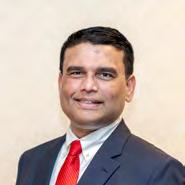
Indian spirituality offers more than religious practice—it provides a framework for introspection, mindfulness, and personal growth. Through disciplines such as meditation, yoga, and devotional practices, individuals develop focus, resilience, and clarity. These are essential traits for any leader. Spirituality teaches us to live with intention and purpose, laying the groundwork for consistent, values-driven action.
Food in Indian culture is much more than sustenance—it is a ritual that embodies care, discipline, and community. From the Ayurvedic principles of balance to the traditional customs of preparing and sharing meals, food practices encourage mindfulness, health consciousness, and connection. The regularity of these culinary traditions fosters habits of attention, preparation, and patience— qualities mirrored in any successful endeavor.
THE
WE CULTIVATE THROUGH SPIRITUAL SEEKING BECOMES THE COMPASS FOR OUR OUTER ACHIEVEMENTS.

Indian cinema has long been a powerful tool of storytelling and cultural transmission. Movies encapsulate moral lessons, celebrate resilience, and reflect the aspirations of a diverse population. They bring people together, spark conversations, and often serve as motivational forces. The heroes and narratives portrayed become symbolic guides, encouraging audiences to strive, persist, and believe in transformation.
In weaving together spirituality, food, and movies, Indian heritage provides not only cultural richness but also a roadmap for personal and collective success. By drawing from these traditions, individuals can develop the self-discipline needed
for consistent action— transforming effort into habit, and habit into achievement. And as we build ourselves, we also build stronger, more connected communities.
In a fast-paced world driven by instant gratification and constant distraction, the pursuit of long-term success—rooted in meaningful, consistent habits—can feel elusive. Yet history and modern times alike offer us a quiet truth: true success begins from within. The inner discipline we cultivate through spiritual seeking becomes the compass for our outer achievements. This is not a new idea. Indian culture has long upheld
spirituality as not only a path to inner peace but also a tool for shaping resilient, focused, and purpose-driven individuals. The rituals, philosophies, and meditative traditions of India provide practical methods for self-mastery—an essential precursor to personal and professional success.
What is striking is how this inner journey has appealed to some of the most accomplished minds in modern history. Steve Jobs, in his youth, traveled to India in search of spiritual enlightenment. Deeply influenced by Zen Buddhism and Indian philosophies, Jobs once remarked, "Your time is
limited, so don’t waste it living someone else’s life." His minimalist design principles and deep intuition were sharpened not just by innovation, but by introspection.
Mark Zuckerberg followed a similar path when, on Jobs’s advice, he visited a temple in India during a pivotal time in Facebook's early years. That journey, he later said, helped center him with clarity and conviction about his mission.
Jay Shetty, a former monk turned global mindset coach, has made it his life’s work to share spiritual teachings through a modern lens.
Drawing from his years living in an ashram, his bestselling books and viral videos show how ancient wisdom can guide contemporary life with simplicity and discipline.
Even Elon Musk, a symbol of technological audacity, has publicly explored philosophical and spiritual questions, including the nature of consciousness and the potential higher order of intelligence that might be shaping our universe. While his path is unconventional, it echoes the same curiosity that has driven mystics and scientists alike to look inward. These figures represent more than personal stories—they reflect a universal truth: when the mind is trained to be still, the individual becomes unstoppable.
While some seek solitude in Himalayan caves or Zen monasteries, millions today

are turning to spiritual guides who offer practical wisdom for modern living. Among them, three stand out for their global impact—two rooted in Indian tradition, and one who has brought Indian spiritual systems into a truly international framework.
Master Choa Kok Sui, though not Indian by origin, was a spiritual scientist born and raised in the Philippines, with a Catholic and Buddhist background. What makes his work extraordinary is how he seamlessly integrated Indian spiritual teachings— particularly the energy systems of prana, chakras, and karma— into a comprehensive and accessible path for healing and transformation. Through his systems of Pranic Healing and Arhatic Yoga, he made esoteric wisdom understandable and usable, empowering individuals around the world to live happy, healthy, and spiritually fulfilling lives. I speak from personal experience. After several years of practicing techniques from the Art of Living, I found myself drawn to Pranic Healing in March of last year. That journey became a turning point. Under the guidance of Dr. Prashant Ganapathy, a former medical doctor now based in the Netherlands who has dedicated his life to healing and teaching, I experienced a profound shift—not just in my energy, but in my life’s direction. His mentorship, and the clarity of Master Choa’s teachings, opened a new dimension of purpose for me. Opportunities like franchising service that have since come my way align with my higher purpose of helping people
become very successful—both spiritually and financially. This realization has affirmed one of the deepest truths I’ve come to embrace: What you are looking for is looking for you too.
Sri Sri Ravi Shankar, founder of the Art of Living Foundation, emphasizes breathwork, meditation, and service as gateways to peace. His Sudarshan Kriya has transformed lives globally, offering powerful tools for managing stress, anxiety, and emotional turbulence in today’s hyperconnected world.
Sadhguru, founder of the Isha Foundation, has brought yogic sciences to the forefront of global conversations through his accessible and unorthodox style. His Inner Engineering program teaches that transformation begins with inner alignment—an approach that appeals to seekers from all walks of life, from Silicon Valley engineers to rural farmers. These teachers offer something rare: a bridge between ancient inner technology and the modern-day need for clarity, resilience, and purpose. Their teachings are not escapes from reality—they are roadmaps for navigating it.
Indian spirituality is not separate from life—it is a way of living life fully, attentively, and meaningfully. At its heart lies discipline: the regularity of meditation, the structure of rituals, the accountability of self-reflection. When practiced consistently, these elements cultivate inner clarity, which eventually becomes outer mastery.
In a world beset by war,

division, and digital overload, these teachings remind us of what endures: presence, peace, and purpose. They tell us that success is not about chasing more—it is about becoming more.
In the pursuit of success, the world often encourages action first. But Indian wisdom teaches us that stillness
precedes right action. Before strategy comes silence. Before leadership comes self-mastery. Spirituality, when practiced with sincerity and consistency, becomes the engine of transformation. It fosters the kind of discipline that doesn’t just help us achieve—it helps us align. And in that alignment, true success unfolds—not just for the individual, but for the community, the culture, and the world.
K G LeRoy is a purpose-driven serial entrepreneur and seasoned data and technology leader with over 25 years of experience across some of the world’s most respected organizations — including Tata Consultancy Services, Merrill Lynch, the Federal Reserve Bank of New York, and Deloitte Consulting. An MBA graduate of the prestigious NYU Stern School of Business, K G has built an illustrious career in both the corporate and entrepreneurial arenas — leading high-impact teams, delivering strategic transformations, and cultivating trusted relationships across a vast network of professionals from all walks of life. In parallel with his professional success, K G has undergone a profound personal transformation — evolving into a spiritual and business leader with a higher mission: To help individuals and families transform their lives through purpose-driven collaboration and financial professional, real estate, and franchise services, starting with their own. He is now dedicated to enabling others to align with their inner calling or reconnect with long-lost dreams, create meaningful income streams, and co-build a caring and prosperous world for all. Many others with a similar purpose are now joining him on this journey to fulfill his higher mission. Contact K G LeRoy at kg@thefranchiseconsultingcompany.com.



Weekend PE is more than a business opportunity it’s your chance to build a stronger, more active community Since 2015, we’ve delivered high-energy events for all ages, from sports parties and summer camps to community gatherings and classes. Now, you can help bring that mission to life where you live.
Email us at to learn more.

• High Profit Margin Potential
• Easy Training & Staffing
• Semi- Absentee Model
• Diverse Revenue Streams
• Scalable Business Model
addition Wow! A wholesome and exciting to our neighborhood. Coaches were H ighly recommended!








Maya Ratcliff, founder of Hawaii Fluid Art, started by using art to support healing. Inspired by its impact, she developed her own fluid art style, blending acrylics with a special pouring technique. What began at home soon led to Hawaii Fluid Art’s first studio in Waikoloa, HI, where guests now create unique, beautiful pieces and uncover their inner artist.


by Kapil Manocha, Consultant, The Franchise Consulting Company

When ThirsTea opened its doors in 2019 in Temecula, California, it had more on its menu than bubble tea—it had vision. Co-founders Sonny Paul and Keerthy Sunder, fueled by a shared love for premium beverages, launched a bold brand rooted in creativity, quality, and community. Since then, their brand has bubbled into a refreshing force in the fast-casual beverage world.
“ThirsTea was born from a profound love for bubble tea and a dream to share that passion with the world,” Sonny reflects, underscoring how the venture combines personal zeal with entrepreneurial

intent. From classic milk teas and bubble teas to slushies, inventive milkshakes, rolled ice cream, frappes, smoothies, and acai bowls, ThirsTea’s vibrant menu is a testament to their commitment to flavor and fun—an approach that quickly won hearts in Temecula and caught the eye of investors and tea aficionados alike.
By 2023, Sonny and Keerthy were ready to scale their vision, launching a national franchising initiative in response to growing demand.
With two company-owned locations in Southern California as launchpads, the brand began offering franchises across the U.S. The timing couldn’t be better—bubble tea
industry revenues are projected to reach $2.46 billion this year, and ThirsTea is poised to ride the wave.

What gives the franchise its competitive edge isn’t just its flavorful lineup—but its franchise model. Sonny highlights the benefits:
“Franchising ThirsTea is a strategic move that offers accelerated growth, risk diversification, and increased brand visibility”. Their streamlined operations, USbased supply distributor, and low overhead model make it an attractive option for new business owners .
Behind every tempting menu item lies the duo’s keen eye for identifying product gaps in the market, combined with decades of industry experience. Sonny holds an MBA degree and has spent 18 years in the food and beverage sector, working with major corporations like Pepsi and Coca-Cola. Sonny and Keerthy have developed strong instincts for quality sourcing—like freshly brewed teas and organic milk options—as well as a fierce passion for innovation. Flavors rotate seasonally, and franchisees can customize local

menus to reflect regional tastes without losing the brand’s signature vibe.
Equally vital to their philosophy is an emphasis on community. ThirsTea stores are more than beverage stops— they’re social hubs. Whether partnering with local vendors, supporting charity events, or simply crafting Instagramworthy drinks, Sonny and Keerthy have made community cultivation a brand cornerstone.
Today the brand is actively scouting franchisees across states, and for entrepreneurs looking to capitalize on the booming bubble tea trend, ThirsTea offers compelling appeal: quality, innovation, support—and a proven framework for fast, scalable growth.
For Sonny and Keerthy, launching a business was a natural extension of their shared passion for entrepreneurship and long-standing desire to shape their own future. ThirsTea offered more than just a business opportunity—it provided a platform to exercise creative autonomy, make meaningful decisions, and build something lasting. Through the brand, they saw the chance to not only create a thriving enterprise, but also to build a valuable asset and leave a legacy rooted in passion, purpose, and community.
Their advice for anyone looking to get into franchise ownership – “A franchise offers a strong brand, an established support system, and a proven business model—but success still requires a franchisee’s commitment. Be prepared to work hands-on, especially in the beginning, to understand your operations and customers, and to build a strong team”, says Sonny. Equally important is financial acumen. “Understand your costs, margins, and breakeven point. Good products and branding matter, but strong financial discipline will keep your business thriving”, he adds.
From handcrafted boba
to rolled ice cream artistry, ThirsTea delivers more than sweet treats—it offers an experience shaped by passionate founders, strong systems, and a communityfirst mindset. As the bubble tea wave keeps rising, Sonny Paul and Keerthy Sunder are brewing momentum—one cup at a time.
Kapil Manocha is a multi-unit franchise owner, a leading franchise coach, a public speaker, and an author. Drawing on years of experience Kapil has helped hundreds of people gain personal and financial independence through franchising. Contact Kapil at kapil@ thefranchiseconsultingcompany.com.



Paramount is an end-to-end solution from inception through completion. The Paramount Team will provide the convenience of a single point of contact from furniture design, specification and procurement through installation and coordinated commercial moves.
SUPPORT COMMITMENT ONE SOURCE

Furniture & Design
Installation & Warehousing
Architectural Interiors
Facility Services




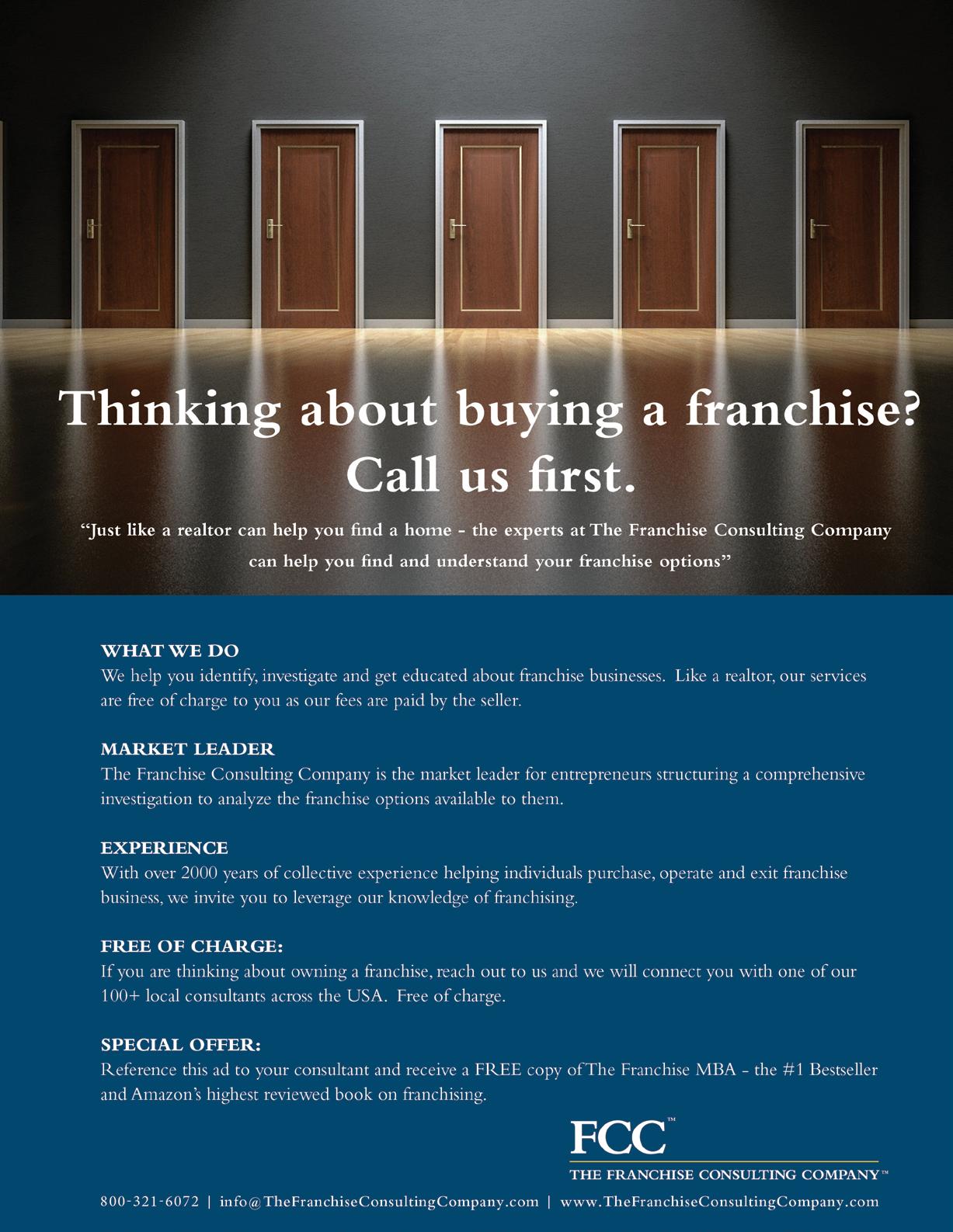
by Jack Tiwari, Consultant, The Franchise Consulting Company
In today’s evolving American economy, immigrant entrepreneurship continues to be one of the most powerful engines of growth. Nowhere is this more evident than among the South Asian American communities—dynamic populations whose collective contributions to business, culture, and innovation
remain underreported and underleveraged.
At Franchise Nation, we’re launching a dedicated series to profile, quantify, and spotlight the growing influence of individuals with roots in India, Pakistan, Bangladesh, Nepal, Sri Lanka, Bhutan, Afghanistan, and the Maldives.
This series is more than just a data project. It is a strategic

lens into the business ownership trends, market readiness, and economic positioning of each group—meant to inform franchise developers, lenders, community organizations, and policymakers working to close equity gaps and unlock new market segments.
Sources: U.S. Census (ACS 2023), Pew Research Center, UNHCR, and community estimates
Whether through convenience stores, franchises, tech startups, or consulting firms, South Asians are increasingly turning to business ownership as a path to economic freedom. Many are first-generation immigrants who arrived with limited networks but have built thriving enterprises through education, persistence, and family support.
As franchise consultants, we recognize that market expansion must be culturally aware. South Asian Americans often bring:
• Multigenerational wealthsharing models
• Community-based referral ecosystems
• A focus on education, service, and scalability Understanding the nuances across these national origin groups—from Bhutanese refugee entrepreneurs to Indian tech founders—is key to crafting the next phase of inclusive franchising.
Some groups (e.g., Bhutanese, Bangladeshi, Afghan) remain underbanked or underserved in traditional franchise and lending markets. This is not due to lack of drive or skill—but lack of tailored outreach and mentorship.
Each profile in this series explores:
• Demographic composition

(age, nativity, citizenship)
• Language and cultural assets
• Educational and economic attainment
• Business ownership rates and industries
• Geographic distribution (key metros and states)
• Market-readiness for franchising or expansion We also highlight notable individuals from each community to inspire the next wave of leaders and showcase the diversity of success stories emerging from South Asia’s diaspora.
South Asian Americans— whether newly resettled or born in Silicon Valley—share
one thing in common: a belief in ownership as empowerment. By aligning franchise education, capital pathways, and culturally attuned business models, we can help transform this belief into intergenerational wealth and localized economic growth across every major metro in the United States.
This is not just a series—it's a roadmap. And it starts here.
Jack Tiwari is a seasoned business consultant, community leader, and cultural advocate. With a deep understanding of the franchise industry, he helps entrepreneurs achieve success in franchise sales and acquisitions, business development, and social impact. Contact Jack at jack@ thefranchiseconsultingcompany.com.









As North America’s largest and most-trusted deck building franchise, Archadeck Outdoor Living is a proven franchise model that boasts a 40-plus year track record and nearly $1 billion in projects completed. In addition to offering you a business model built on proven best practices in the thriving outdoor living industry, Archadeck also has you “covered” with the support you need to have booming business, including innovative technology & programs, robust marketing & lead generation, business & financial support, production management, and more. For entrepreneurs looking to achieve their personal and professional goals within a growing industry, Archadeck is the perfect choice.
•
•
by India Franchise Council
Dr. Veena Chandrakar, a medical oncologist based in Houston, has dedicated over two decades to treating patients and advancing cancer care. Through her years of practice, she began to notice a common thread among nearly all her patients and even among healthy individuals that chronic dehydration and widespread nutrient deficiencies were part of their issues with overall wellness. Whether due to poor diet, stress, medical conditions, or the demands of modern living, most people simply weren't getting what their bodies needed to function optimally. This growing

awareness led Dr. Chandrakar to explore complementary avenues of care that could support overall health and healing. She was initially drawn to The DRIPBaR franchise as a way to incorporate high-dose vitamin C into her cancerfighting arsenal. However, once she opened The DRIPBaR Houston Heights, it quickly became clear that the benefits extended far beyond oncology. What started as a targeted medical solution soon evolved into a broader wellness mission. Dr. Chandrakar found that the IV vitamin drips offered at The DRIPBaR were improving her clients' energy, immunity, mental clarity, inflammation levels, and even their sense of well-being. The positive impact on everyday health was undeniable.
More unexpectedly, the experience of operating her DRIPBaR franchise has reignited Dr. Chandrakar's passion for medicine. She juggles several important jobs: the most important is being a mom of a 1year old boy, the next is a position as a medical director of a Cancer Center and the final role is the owner of the Dripbar Houston Heights. The days she comes to The DRIPBaR and interacts with clients are some of her favorite

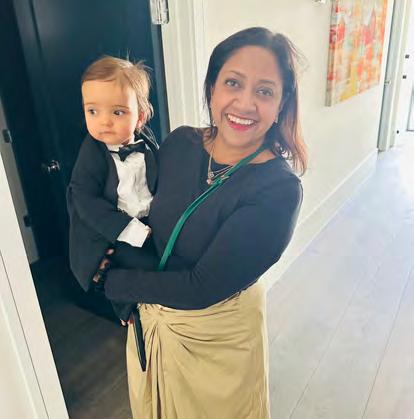
days of the week, reminding her of why she chose this path in the first place which is to help people feel better, live longer, and thrive.
For people considering franchising in the wellness space, Dr. Chandrakar's journey highlights how a clinically grounded model like The DRIPBaR can be both personally fulfilling and professionally rewarding. It's not just a business - it's a new way to care for people in today's fast-paced, wellnessfocused world.
Seema Govil, a Versatile Leader: Bridging the Worlds of Franchise Consulting, Media, and Philanthropy as the Founder and CEO of Cosmo City Media. For franchising help, contact Seema at Seema@ thefranchiseconsultingcompany.com.

SkyRun Vacation Rentals is the EASY-TO-USE all-in-one Professional Property Management Platform with the backing of a proven national brand
Revenue in the Vacation Rentals segment will amount to US $87,099M in 2020
Revenue is expected to show an annual growth rate (CAGR 2020-2023) of 3.7%, resulting in a market volume of US $97,010M by 2023.
User penetration is expected to hit 11% by 2023.
Source: www.statista.com











by TJ Treat, Consultant, The Franchise Consulting Company
Indian Americans have quietly become one of the most influential communities in American franchising. From single-unit operators to multibrand empires, their presence is particularly strong in industries like hospitality, food service, convenience retail, and home services. This success is no accident. It is the product of values, vision, and a systemsbased mindset that fits naturally into the franchise model.
Franchising offers a unique opportunity: the structure of a proven business with the freedom to operate and scale. For Indian American entrepreneurs, many of whom come from a cultural background that emphasizes
discipline, long-term planning, and family collaboration, franchising offers more than just income. It offers a pathway to legacy, a chance to build something lasting, not just for themselves, but for generations to come.
The influence of this community is especially visible in industries that rely on operational consistency and community engagement. Often, franchises owned by Indian Americans become pillars of their neighborhoods, employing dozens, reinvesting in local causes, and supporting family members to build financial independence. These businesses are not just profit centers; they are community

anchors that provide services, stability, and opportunity.
This

momentum is not just generational. It is strategic. Many Indian American franchisees bring a high level of intentionality to brand selection, location strategy, and reinvestment. Multi-unit and multi-brand ownership is common, as is the practice of involving family in operations, which keeps costs low and decision-making agile. Franchising is rarely seen as a side venture. It is a core family enterprise, often with the future in mind from the very first investment.
KEY TRAITS INDIAN AMERICAN FRANCHISEES
BRING TO THE TABLE
1. Long-Term Mindset
Many Indian American business owners approach franchising with a multigenerational vision. Decisions are not made for short-term gain but with an eye toward building something lasting, often with the intent to pass it on to children or extended family. Success is not measured quarter to quarter, but decade to decade.
"THE GREATEST USE OF LIFE IS TO SPEND IT FOR SOMETHING THAT WILL OUTLAST IT."
With a strong respect for systems, consistency, and process, Indian American franchisees often thrive in brands that value structure. They are quick to implement SOPs, follow brand standards, and find efficiencies that drive profitability. Operational excellence becomes the standard.
Franchises are frequently run by multiple family members, which allows for flexible staffing, shared investment, and built-in trust. This family model can create a competitive advantage in both cost structure and cultural cohesion. It is not unusual to see parents managing operations while their children handle marketing or technology, creating a true team effort.
Business decisions are backed by deep research, due diligence, and calculated risk. Indian American franchisees are known for thoroughly evaluating Franchise Disclosure Documents, running the numbers, and seeking advice before making major moves. Caution is seen as strategy, not hesitation.
Giving back and being visible in the local community is often a priority. Whether through local chambers, school sponsorships, or hiring from
— William James
within the neighborhood, Indian American franchisees frequently become cornerstones of the communities they serve. Business thrives when people thrive.
A high value is placed on learning, not only for personal growth but for passing along knowledge to the next generation. Many successful Indian American franchisees mentor others in their community and help new immigrants find pathways to ownership. Education is not just academic; it is generational empowerment.
Despite their outsized contributions, Indian American franchisees have historically been underrepresented in media coverage and industry leadership narratives. Yet their impact is undeniable. From revitalizing local economies to building multi-unit enterprises that span states, they are a quiet force helping define what modern franchise success looks like.
The early years often involved long hours, living above or behind the business, and working shoulder to shoulder with family members. Over time, these efforts have created financial independence and new opportunities, not only for relatives, but for employees and the community. What began as necessity has become legacy.

As franchising evolves, this community’s influence will continue to grow in new industries such as education, senior care, and health and wellness. With a blend of cultural heritage and business acumen, Indian American franchisees are uniquely positioned to lead the next chapter of franchise expansion and innovation.
Their stories remind us that the American Dream takes many forms. Franchising, when paired with the right values and vision, can turn first-time business owners into multiunit operators, brand builders, and legacy makers.
Franchising has always been about scale, systems, and support. Indian American entrepreneurs bring all three to the table. As the industry continues to spotlight diverse ownership and inclusive opportunity, the example set by this community serves as both a model and a call to action.
T.J. Treat is a franchise consultant, multi-unit franchise owner, and former marine engineer. He helps individuals and business owners navigate the path to successful franchise ownership through strategy, systems, and storytelling. Contact T.J. at TJ@ thefranchiseconsultingcompany.com.





PitaMania intertwines the most popular Greek and American favorites wrapped in warm buttery pitas with a twist! Seasoned to perfection with all homemade dips and sauces. Our Salads are super fresh, and our famous fries that are tossed in our Signature Seasoning that you cant find anywhere else. You eat with us once, you will want to eat with us again guaranteed!
Mediterranean is one of the most popular cuisines
Low initial investment - starting at $140K including franchise fee
Simple Operation: 2-3 employees needed
Homemade recipes passed down from generations
Training and support through out the journey
Minimal prep work, most of the preparation handled by us
High profit margins




F o u n d e d i n 2 0 1 5 , J u n i o r C h e f s o f A m e r i c a ( J C O A ) t e a c h e s k i d s
a g e s 4 – 1 8 a p a s s i
f
h o s p i t a l i t y t h r o u g h c u l i n a r yf o c u s e d S . T . E . A . M . e d u c a t i o n . W i t h f i v e p r o g r a m s u n d e r o n e
s c h o o l , J C O A h e l p s s t u d e n t s








by Jatinder Taneja, Consultant, The Franchise Consulting Company
In the dynamic world of technology, where innovation meets relentless competition, few leaders have made as profound an impact as Shantanu Narayen, the Indian-origin Chairman and CEO of Adobe Inc. As the driving force behind one of the world’s most influential software companies in US, Narayen exemplifies what can be achieved through vision, perseverance, and global perspective. We celebrate his journey, from Hyderabad to the boardrooms of Silicon Valley, and the legacy he’s building in reshaping the digital experience for billions across the globe.
Born in Hyderabad, India, in 1963, Shantanu Narayen was raised in a modest yet intellectually rich household. His father ran a plastics business, while his mother was a teacher of American literature—perhaps a fitting beginning for someone who would later helm a company known for empowering creative expression. Narayen pursued a Bachelor’s degree in Electronics and Communication Engineering

before heading to the US for higher education. He earned a Master’s in Computer Science from Bowling Green State University, and later, an MBA from the Haas School of Business at the University of California, Berkeley. His combination of technical depth and business acumen would later prove to be a potent force.
Before joining Adobe, Narayen held product development roles at Apple and Silicon Graphics, and was co-founder of Pictra Inc., a pioneer in digital photo sharing. These early experiences deepened his understanding of user needs and product ecosystems in the emerging world of digital media. Narayen joined Adobe in
1998 as a senior vice president of worldwide product development. His rise through the ranks was rapid and well-deserved. In 2007, he was appointed CEO, and in 2017, he became Chairman of the Board.

Shantanu Narayen’s leadership at Adobe is widely regarded as transformational. He successfully shifted the company’s core business model from selling boxed software to offering cloudbased subscriptions, launching the Adobe Creative Cloud suite in 2012. This strategic pivot, once considered a high-risk move, became a textbook case in corporate reinvention. Under his leadership:
• Adobe’s market capitalization grew from around $20 billion in 2007 to over $250 billion at its peak.
• The company expanded beyond its flagship products like Photoshop and Illustrator, acquiring tools like Figma, Magento, and Marketo, turning Adobe into a comprehensive platform for creative, document, and digital experience solutions.
AS THE DRIVING FORCE BEHIND ONE OF THE WORLD’S MOST INFLUENTIAL SOFTWARE COMPANIES IN US, SHANTANU NARAYEN EXEMPLIFIES WHAT CAN BE ACHIEVED THROUGH VISION, PERSEVERANCE, AND GLOBAL PERSPECTIVE.
• He championed the use of AI and machine learning, embedding Adobe Sensei into core products and enabling personalized content at scale.
By focusing on customercentric innovation, Narayen has ensured that Adobe remains at the forefront of digital transformation across industries, from media & entertainment to retail and education.
Shantanu Narayen’s achievements have not gone unnoticed. He has repeatedly featured in Forbes’ lists of top CEOs, and in 2018, he was named one of the world’s bestperforming CEOs by Harvard Business Review. He serves on the board of Pfizer, and was appointed by President Joe Biden to the National Security Telecommunications Advisory Committee.
In 2019, he was awarded India’s Padma Shri, one of the

nation’s highest civilian honors, recognizing his contributions to trade and industry.
Beyond the boardroom, Narayen is known for his calm demeanor, clear strategic vision, and inclusive leadership style. He is a vocal advocate for diversity in technology, digital literacy, and ethical AI—topics that are reshaping the tech landscape in profound ways.
Narayen’s success story is emblematic of the Indian diaspora’s global rise in the technology sector. Alongside peers in Microsoft and Google, he represents a generation of Indian-origin leaders who have not only excelled in USA but have also helped shape the future of technology itself with
purpose driven innovation.
For young Indian professionals and entrepreneurs, Shantanu Narayen stands as a powerful symbol—proof that with a strong foundation, a global mindset, and relentless dedication, borders are no barrier to greatness. And that, values deeply embedded in Indian culture—education, resilience, and adaptability— can serve as cornerstones for global leadership.
With two decades of leadership in business development and management, Jatinder Taneja brings a powerful blend of entrepreneurial insight and strategic expertise to help individuals achieve success through franchise ownership. As a trusted consultant and coach, he delivers personalized guidance that aligns each candidate with the right opportunity, tailored to their goals, strengths, and lifestyle.

















No Credit Check Required.

by Sadish Kumar Jayachandran, Consultant, The Franchise Consulting Company

In the dynamic world of culinary entrepreneurship, where trends come and go, Chef Vijay Kumar stands as a beacon of authenticity and unwavering commitment to his roots. His journey from the humble villages of Tamil Nadu, India, to the glittering Michelinstarred kitchens of New York City is a testament to the power of passion, persistence,
and an unapologetic embrace of one's heritage. For any franchising consulting company seeking to highlight a true success story, Chef Vijay Kumar's narrative offers a compelling blueprint for how a singular vision can translate into global acclaim.
Born and raised in a small town near Dindigul, Tamil Nadu, Kumar's earliest culinary
education came not from prestigious schools, but from the open-fire kitchens of his mother and grandmother. He foraged for ingredients, learned the art of cooking over wood fires, and absorbed the intricate flavors and traditions of Southern Indian cuisine. This foundation, deeply rooted in family recipes and regional practices, would become the bedrock of his future success.
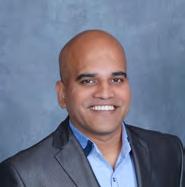
While his initial aspirations might have leaned towards engineering, destiny, fueled by the aroma of spices and a profound connection to his culture, had other plans. Kumar pursued hotel management in Tiruchirappalli, followed by formative years at the Taj Connemara in Chennai and then on a cruise liner, where he honed his precision and efficiency. His move to the United States marked a pivotal moment. He worked in California at Dosa and then at Rasa, where his contributions helped the latter secure a coveted Michelin star.
However, it was his partnership with Unapologetic Foods, helmed by restaurateurs Roni Mazumdar and Chintan
Pandya, that truly unleashed his vision. In 2021, Kumar packed his bags and drove crosscountry to New York City to open Semma. The name itself, "Semma," meaning "super" in Tamil slang, encapsulates the restaurant's ethos: a bold, unyielding celebration of Southern Indian cuisine.
At Semma, Chef Kumar isn't just cooking; he's telling stories. The menu is a deeply personal expression of his childhood, featuring dishes like nathai pirattal (snail curry) and kudal varuval (goat's intestines)— dishes once considered "poor people's food" in his youth, now elevated to fine dining experiences. He consciously avoids catering to Westernized palates, instead inviting diners to immerse themselves in the authentic, robust flavors of Tamil Nadu. This commitment to authenticity, often perceived as a risk, proved to be his greatest strength.
The accolades poured in. Semma quickly earned a Michelin star, a distinction it has proudly retained, becoming the only Indian restaurant in New York City with this honor. It was also lauded by the New York Times, making their prestigious "100 Best Restaurants in New York City" list, and received numerous other commendations from leading culinary publications. Most recently, Chef Kumar won the highly prestigious James Beard Award for "Best Chef: New York State," a historic achievement for both Indian and Tamil cuisine in the US. His emotional acceptance speech, where he reflected on his journey as "a dark-skinned boy

MOST RECENTLY, CHEF KUMAR WON THE HIGHLY PRESTIGIOUS JAMES BEARD AWARD FOR "BEST CHEF: NEW YORK STATE," A HISTORIC ACHIEVEMENT FOR BOTH INDIAN AND TAMIL CUISINE IN THE US.
from Tamil Nadu," resonated deeply, highlighting the power of his cultural narrative.
Chef Vijay Kumar's success is a powerful lesson for the franchising world. It demonstrates that genuine passion, a compelling personal story, and an unwavering commitment to a unique and authentic product can not only find a niche, but dominate it. His ability to translate deeply personal culinary memories into a globally recognized
brand, without compromising on tradition, offers invaluable insights into building a successful and sustainable enterprise. He proves that true greatness isn't about following trends, but about staying rooted, celebrating your origins, and allowing your culture to shine through every plate.
Contact Sadish Kumar Jayachandran at sadish@ thefranchiseconsultingcompany.com.
FRANCHISED BY


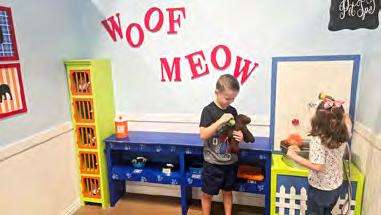
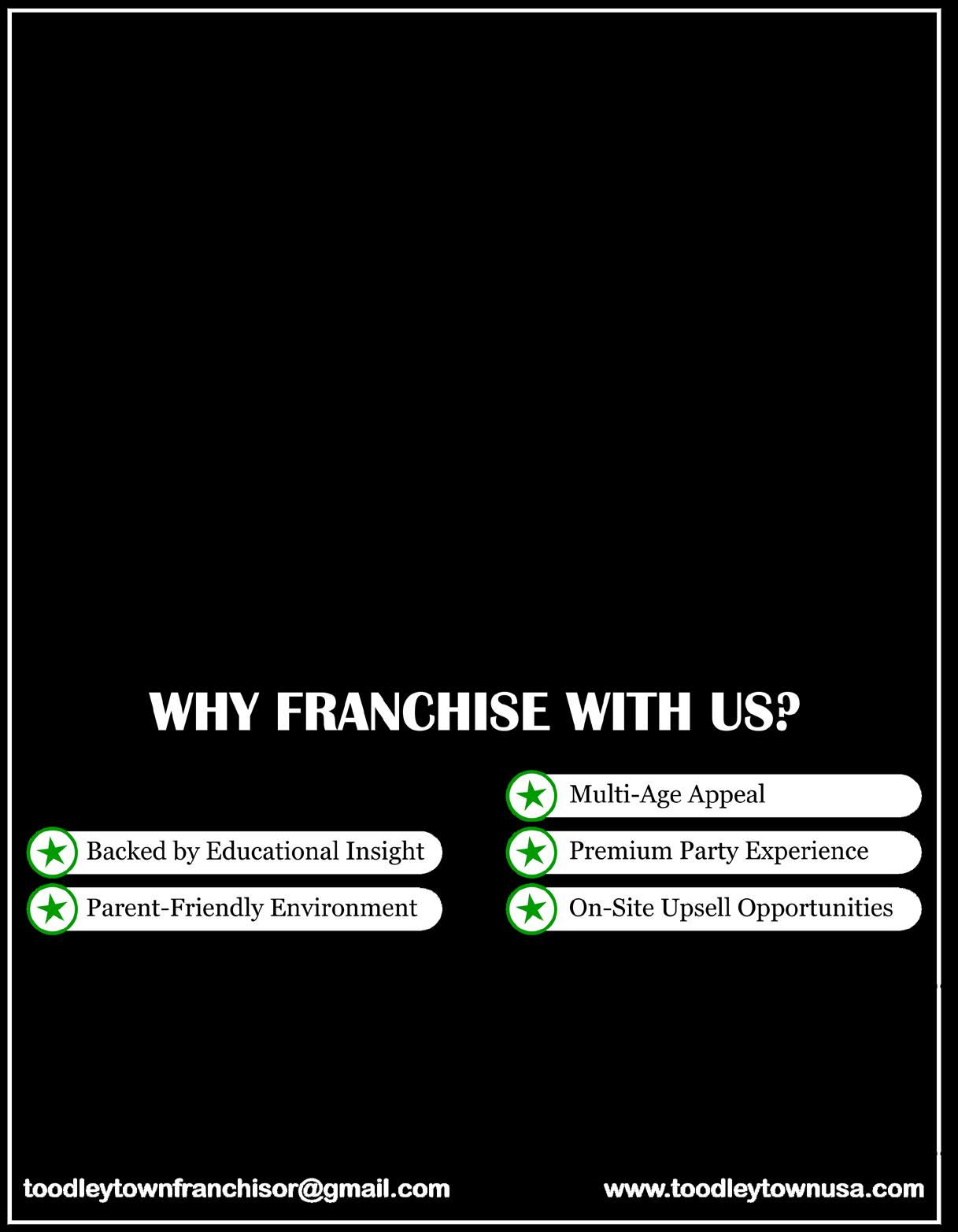


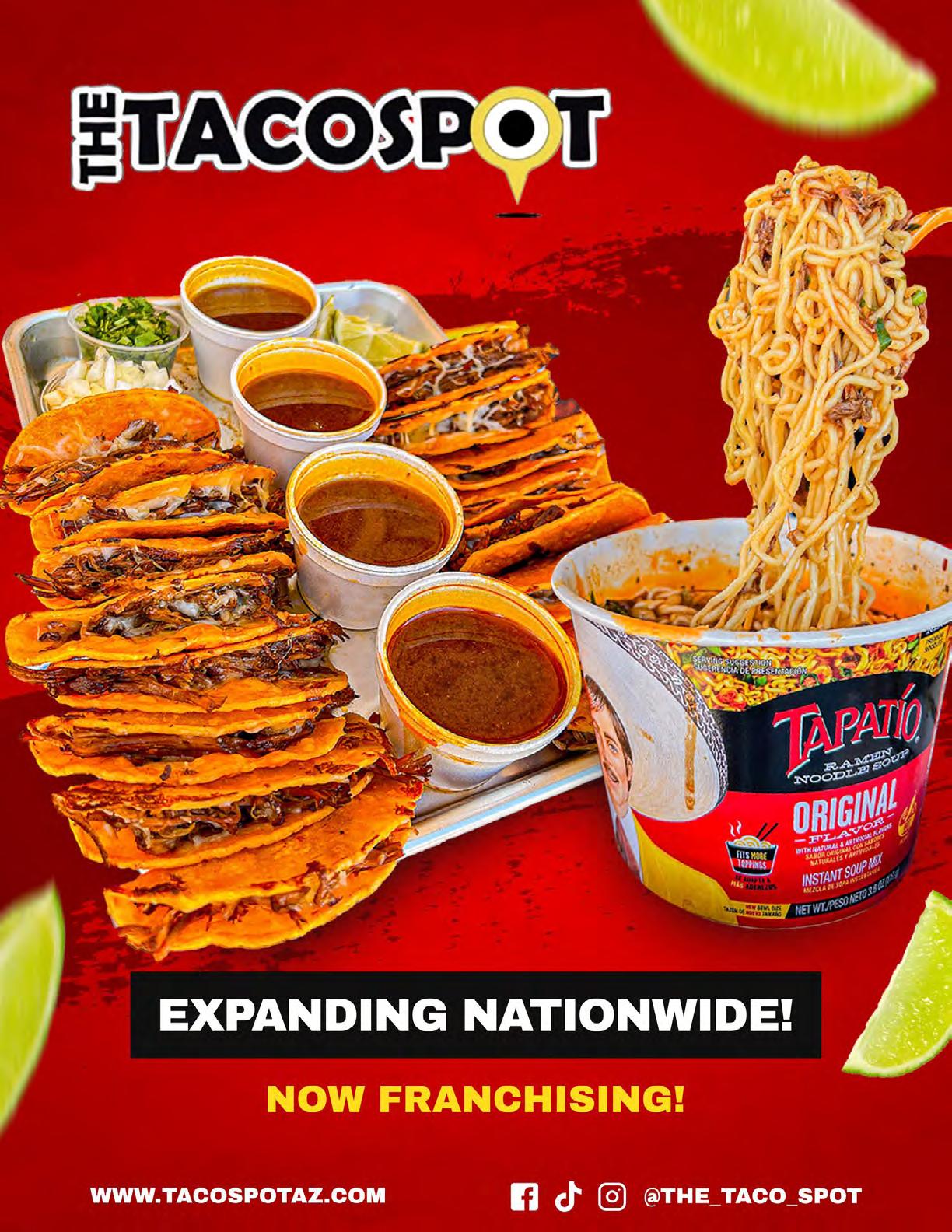

by Rashmi Airan, Consultant, The Franchise Consulting Company
My mother’s youngest brother, Bharat Aggarwal, came to the United States from India with very little. One suitcase. A few hundred dollars. No backup plan. He opened a single Subway franchise and learned every piece of the business by doing it. He struggled, adjusted, and kept going. Today, he owns more Subway restaurants than anyone else in the country.

That story isn’t just about business growth. It’s about inner growth.
The kind that happens through discipline, hard decisions, and steady courage. I call it Next Level Growthnot just scaling numbers, but expanding capacity, alignment, and integrity.
It’s the kind of growth I teach through my Rise Through It™ framework.
I grew up in a first-generation Indian-American home in North Carolina. My parents were immigrants who came here with ambition and heart. But their journey wasn’t smooth. They faced racism, financial struggle, failure, and loss. And instead of hiding it, they showed us how to live through it - with faith, hope, love, and an unshakable refusal to give up.
That’s what I carry with me now. Not a blueprint for perfection. A model for rising, no matter how far you fall.
I followed what I thought was the path to success: Ivy League law school, high-stakes dealmaking, entrepreneurship, motherhood. But underneath the accomplishments, I was chasing approval. I ignored my intuition. I made choices I regret. I violated my own values and was sentenced to federal prison.
Prison stripped everything away - titles, credibility, certainty. But it gave me space to be honest. I started to ask better questions. I started to rebuild, from the inside out.
That process led me to create the RISE Through It™ framework, the foundation of my work today with leaders,

franchise owners, and teams who want to grow in a way that’s sustainable and real.
Reframe: When it breaks, ask what it’s trying to teach you. Don’t rush to fix. Start by listening.
Identify: You can’t grow in isolation. Surround yourself with people who tell the truth and hold space.
Surrender: Let go of the grip of ego. Control and perfection are illusions. Clarity begins when you release them.
Evolve: Tweak and test. Build better systems. Make better choices. Grow forward.
This is the path I live now. Not because it’s easy - but because it’s honest. And because it honors where I come from. My uncle didn’t become
the country’s top Subway franchisee by playing it safe. He worked relentlessly, made mistakes, and kept going. More than that, he mentored others. He helped fellow immigrants launch their own franchises. He shared what he knew. He stayed rooted in his values while building something that created opportunity for others.
This August, as we celebrate India’s Independence Day, I think about what real freedom looks like for this generation of entrepreneurs. It’s not just about how much we own or how far we’ve come. It’s about building lives and businesses that reflect who we are, even when the path breaks open beneath us.
Next Level Growth isn’t a straight line. It’s a decision to keep going, to stay open, to let the hard moments shape us instead of shut us down.
My parents taught me that. My uncle lives it. And I try to walk it every day.
I want every franchise owner, every leader, every reader to know this:
You don’t have to hide the struggle. Your rise is already happening.
And it’s worth building from there. I believe in you.
Rashmi Airan is a keynote speaker and leadership consultant who helps entrepreneurs identify the right franchise fit while building the mindset to lead through uncertainty and growth. With a background in law, business, and franchise strategy, she delivers powerful insights to help franchise owners rise through challenges and lead with clarity, courage, and connection. Contact Rashmi at Rashmi@ thefranchiseconsultingcompany.com.
D r y w a l l r e p a i r s p e c i a l i s t s o f f e r i n g
h i g h - q u a l i t y , s a m e - d a y r e p a i r
4 0 + Y e a r s o f f r a n c h i s o r e x p e r i e n c e
N o i n v e n t o r y h e a d a c h e s o r
h i g h p a y r o l l , w h i c h l e a d s t o
p o t e n t i a l l y s p e e d y p r o f i t a b i l i t y
N i c h e h o m e s e r v i c e b u s i n e s s
o p p o r t u n i t y w i t h m i n i m a l
c o m p e t i t i o n
P r o p r i e t a r y b u s i n e s s d e v e l o p m e n t
t o o l s f o r c o n t i n u e d g r o w t h
6 0 - 9 0 r a m p - u p








by Bhavana Taneja, Consultant, The Franchise Consulting Company
For decades, the Indian Film Industry was often reduced to a single narrative in global conversations, colorful song and dance sequences, dramatic plotlines, and stories that celebrated family and emotion. But as India Heritage Month reminds us, the scope and depth of Indian entertainment reach far beyond these popular depictions. With a dynamic landscape of regional cinema, a booming streaming presence, and global collaborations across genres, Indian entertainment is undergoing a renaissance with worldwide impact.
India’s film industry is not a monolith. What’s commonly known in the West as “Bollywood” refers only to the Hindi language film industry. Similarly, the terms “Kollywood” and “Tollywood”, used for Tamil and Telugu language cinema are Western coined nicknames that fail to capture the originality, scale, and artistic heritage of India’s diverse film cultures.
Regional cinema in languages like Tamil, Telugu, Malayalam, Kannada, Bengali,
and Marathi continues to produce globally acclaimed films that reflect the diversity of Indian society and storytelling. Films like “RRR” (Telugu), which became an international sensation and won an Oscar for Best Original Song in 2023, demonstrate the global appeal of these regional stories. Directors like S.S. Rajamouli and Mani Ratnam have earned international recognition, while platforms like Netflix and Amazon Prime have brought these cinematic gems to audiences around the world.

Streaming services have democratized Indian entertainment. Once confined to diaspora communities or art-house festivals, Indian content now reaches viewers worldwide. Series like “Delhi Crime,” “Made in Heaven,” and “Sacred Games” have garnered international acclaim for their bold storytelling and high production values. While global directors have occasionally engaged with Indian stories, these efforts have been sporadic and often filtered through a narrow lens,

typically emphasizing poverty or hardship. This skewed narrative can overshadow India’s vibrant diversity, cultural sophistication, and economic dynamism. Many of these collaborations perpetuate outdated colonial tropes rather than engaging with the modern realities of India’s creative ecosystem.
In fact, the Indian film industry is prolific and powerful enough to stand on its own. Major global entertainment giants such as Sony, Warner Bros., Fox, and Disney have already invested in Indian studios and production houses. Conversely, Hollywood blockbusters rely on India as a key international market, where box office returns can rival or exceed domestic numbers.
Indian creators are now reclaiming the narrative through streaming platforms, tackling complex themes such as gender, caste, corruption, and identity. These stories offer a nuanced and multifaceted portrayal of modern Indian life, attracting diverse global audiences and reshaping global perceptions.
Indian entertainment is not limited to film and TV. Music from India, ranging from classical and devotional to hip hop, indie pop, and EDM is
gaining traction globally. Artists like Divine, Armaan Malik, and Prateek Kuhad are charting on international platforms. India’s massive YouTube scene has also elevated influencers, musicians, and comedians to global celebrity status.
Meanwhile, Indian fashion inspired by cinema, from Anarkalis to lehengas, has found its way to red carpets and runways in Paris and New York. Designers like Manish Malhotra and Sabyasachi have become global fashion icons. However, it’s worth noting that Indian styles such as the sari, bandhani prints, or Kolhapuri chappals are often adopted by global fashion houses without proper attribution, reminding us of the need to recognize the original cultures behind these trends.
Indian entertainment’s growing global footprint isn’t about validation through Western recognition, it’s about asserting cultural and creative leadership in a multipolar world. While collaborations with Indian origin creatives such as Priyanka Chopra Jonas, Mindy Kaling, Dev Patel, and Kal Penn continue to flourish, the momentum is equally driven by India’s self-sustained ecosystem of storytelling. Indian directors are increasingly being invited to international festivals, and co-
productions between Indian studios and global platforms are on the rise, not as a form of dependency, but as a meeting of equals. The influence flows both ways: India is as much a creative export powerhouse as it is a market leader in entertainment consumption.
As we celebrate India Heritage Month, we see that India’s storytelling traditions rooted in history, music, and drama, have found new life and global relevance. It’s important to recognize that many of these narratives, often labeled as 'mythology' in the West, are actually grounded in rich historical traditions and texts that continue to shape Indian cultural identity today. Beyond narrow portrayals lies a vibrant, multi-dimensional, and rapidly expanding entertainment landscape that reflects the country’s complexity, creativity, and cultural confidence.
Bhavana Taneja is a franchise consultant who helps aspiring entrepreneurs navigate the complex world of franchising through strategic guidance tailored to their goals and strengths. With over a decade of experience in business development and client engagement, she is passionate about empowering individuals to make confident, informed decisions that lead to sustainable business ownership. Contact Bhavana at bhavana@ thefranchiseconsultingcompany.com.













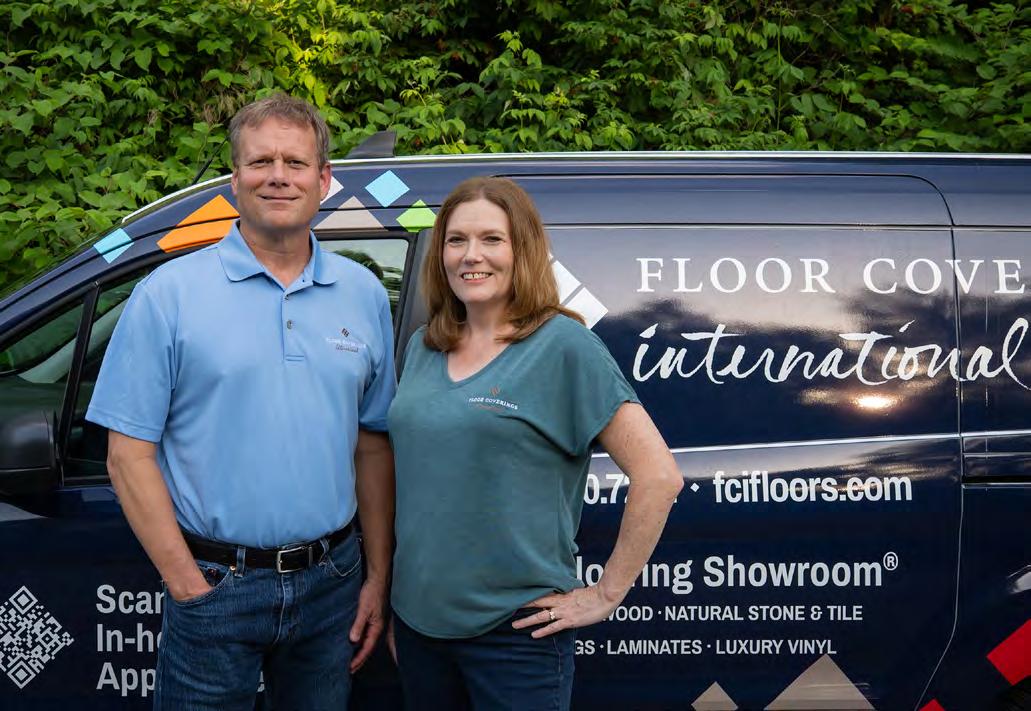
by Rhonda Sanderson, CEO, Sanderson & Associates
Appleton Wisconsin residents Glenn and Angela Wells recently brought Floor Coverings International (FCI), the leading mobile flooring business, to the Fox Valley region.
The Wells’ were inspired to bring FCI to their area because of their own flooring project. “A recent installation of luxury vinyl plank flooring has completely transformed our three-season room into a comfortable and beautiful space. Unfortunately, it took many trips to the flooring
store to select the right product. When we learned about the FCI mobile showroom and turnkey project management, we recognized an opportunity to build a local business that makes flooring easy,” said Angela.
With a unique Mobile Showroom concept, FCI eliminates the hassle of visiting multiple stores and transporting heavy samples. Customers can explore over 3,000 flooring options right in their own homes or offices,
allowing them to view products alongside their existing décor and lighting. This innovative service simplifies the decisionmaking process and ensures a personalized, convenient shopping experience.
The Wells’ bring a diverse background to their business and a passion for highly personalized solutions and customer service. They previously owned a custom metal fabrication business where Glenn was known for his problem-solving talent
and highly attentive customer service. Prior to becoming business owners, the Wells’ built successful careers in Engineering and Supply Chain Management.
“I have a passion for problem solving and find it rewarding to help others,” said Wells. “We hold ourselves to exacting standards to ensure every project exceeds our customers’ expectations. It’s what the brand is all about-the company mission statement.”
Glenn takes a consultive approach with each project, getting to know the customers and the vision they have for the rooms in their homes. He crafts personalized solutions through expert product recommendations and keen attention to installation details to create a result that looks fabulous and provides lasting value and function for the customer.
"Angela and Glenn are glowing examples of what we’d love to see in our franchisees,” said Tom Wood, President & CEO of Floor Coverings International. “We have a terrific business model for couples who come from different walks of life but want to own a business together for their second careers. After an extraordinary year, the energy across our network is at an all-time high. The exceptional

efforts of our franchisees, combined with strategic investments in marketing and support, have set the stage for a landmark year ahead. With more than 100 launches on the horizon, 2025 is set to be a pivotal chapter as we solidify our presence as the most recognized flooring provider in North America."
Floor Coverings International's unique business model –offering a personalized inhome experience with mobile flooring showrooms – has set it apart in the $450 billion home remodeling industry. With an industry-leading Net Promoter Score of 82%, FCI remains committed to empowering its franchisees to achieve maximum success.
With total investment costs ranging from $154,400 to $341,000*, Floor Coverings International offers an affordable and scalable opportunity for entrepreneurs looking to make a lasting impact in their communities. FCI is seeking entrepreneurs who think in the multi-millions, are forever learners, and have an empire builder mindset.

FCI’s product offerings reflect current market trends and customer preferences, including eco-friendly laminate flooring made from recycled wood fibers, authentic woodlook floors, waterproof laminate options ideal for changing weather, and advanced vinyl flooring that mimics natural wood and stone. Additionally, carpet remains popular for its cozy appeal, while engineered hardwood flooring offers luxury with real wood veneers of exceptional quality.
The Wells’ look forward to many years of helping their Fox Valley neighbors bring their home improvements visions to life through flooring. “There is nothing more satisfying than experiencing a customer’s delight from a completed flooring project that is both beautiful and functional for the customer’s family, pets, and lifestyle,” said Glenn.
Based in Norcross, Georgia, Floor Coverings International is the No. 1 Mobile Flooring Franchise in North America, as ranked by Entrepreneur Magazine. With 300 franchisees and several more in development. FCI offers a unique in-home shopping experience featuring a fully equipped Mobile Showroom. The company continues to expand across the United States and Canada, delivering convenience, selection, and expert guidance directly to customers’ doors. For franchise opportunities, visit www. flooring-franchise.com
Rhonda Sanderson is a franchise expert who has owned and operated Sanderson & Associates and Sanderson PR, both specializing in, traditional, social media and crisis PR in the franchise space since 1986. She has authored many articles, helped grow numerous franchise chains is considered one of the Top 30 Small Business Influencers (Fit Business) in the U.S. Find her at Rhonda@ sandersonpr.com or on LinkedIn where she is the author of Franchise Stars at https://www.linkedin.com/in/rhonda-sanderson-a6b658/

This is a BLUE CHIP brand, owned by FirstService Brands. Extremely stable, long term oriented, reputable, & ROCK solid corporate structure


Be part of something different - Align with Amazon. The Flooring industry is the LARGEST interior remodeling industry. 70% of flooring sales are retail We are a disruptor and provide female decision makers a preferred shop-at-home experience.

The top 50% of our franchisees average more than $1 5 million in sales with the Owner Operator, Office Admin, & 1-2 Salespeople. We Scale by adding Mobile Showrooms. Installation is done by SKILLED LABOR
Our diversified marketing programs with online marketing automation, realtors, restoration, etc. makes us recession resistant Also our shop at home model is particularly appealing versus our competitors who are mostly retailers. We have doubled over the last 4 years.
Thinks BIG: Multi-Million Ambitions Stretches limits.
Gets JUICE Leading a Team:
Gets JUICE from Leading a Team: They’re culture builders They’ve hired and fired, some of their biggest career successes come from leading others.
Forever Learner: They have a stack of business books Jump at opportunities to learn and practice continuous improvement.
Can Make the Investment: $250-300k investment heavily weighted towards working capital, so that they’ve quickly built themselves a team within the first few months.








Since 2019, Pasta di Guy has been serving gourmet Italian cuisine in a fastcasual setting at affordable prices Founded by Chef Guy Carmeli, a graduate of the esteemed Cordon Bleu culinary school, our journey started with a successful food truck venture, leading to multiple thriving locations in different states. Winner of the "Best Italian Restaurant in Tampa Bay" for 2023 and 2024, we now offer franchise opportunities to expand our family.
Our Vision is to become the Italian Eatery of Choice for all American Families.
Proven & unique cu




Quality - Foo
Freshness - F pared Daily, Made to Order.
Family - Customers and Employees feel at Home.

Community - Be part of the community and contribute to it

by Joshua Best, Consultant, The Franchise Consulting Company
When Chris Holloway became Cork & Candles’ first franchisee, he was full of excitement and purpose. But soon after, he learned his 2016 kidney transplant was failing. Co-founder David Straub was quietly tested as a potential donor. Though not a match, what followed went far beyond business.
Q: CHRIS, CAN YOU SHARE HOW YOUR KIDNEY DISEASE WAS DISCOVERED AND HOW IT PROGRESSED?
Chris Holloway: I was first diagnosed with kidney disease in 2005, completely by accident. I had gone to my doctor for a referral and discovered my blood pressure was extremely high, like 190/140. A biopsy later determined that I had FSGS (focal segmental glomerulosclerosis), a rare kidney disease. At the time, my youngest son Jacen had just been born.
I was terrified. I constantly wondered what life would be like. I was thinking about taking care of my wife, our oldest son, and everything a parent would want to experience in their life.


"THIS WAS A CHANCE TO BUILD A LEGACY ALONGSIDE MY WIFE AND CREATE SOMETHING SPECIAL. IT GAVE ME THE ABILITY TO FOCUS EVEN WHEN I FELT LIKE I COULDN'T EAT OR GET OUT OF BED."
— Chris Holloway, Cork & Candles’ franchisee
It wasn’t until 2013, after eight years of managing the disease, that I qualified for the transplant list. I got my first transplant in 2016. Things were stable until July 2024 when I was told the kidney had run its course. Just three months earlier, my labs had looked fine, so the news was devastating. I began in-center dialysis in October for four to five hours, three days a week. Now I do peritoneal dialysis at home, about 12 hours a day.
Q: HOW MANY PEOPLE HAVE TRIED TO DONATE A KIDNEY TO YOU?
Chris Holloway: The first time, several people got tested, but no matches. This time has been even harder. It's like asking to borrow money twice. Some people also feel unsure or afraid, and I get it. It's not just a personal decision; it's a family decision. I’ve been more open this time and, with help from the Cork & Candles team and the University of Pennsylvania, I’ve been able to share my story publicly.
Q: DAVE, WHAT MADE YOU DECIDE TO GET TESTED AS A POTENTIAL DONOR?
David Straub: In December of 2024, I said a prayer, “God deliver a kidney to Chris.” I felt a push to donate my kidney and at the same time

I was thinking, “Did you say me?" Chris said there was a promising candidate, so I thought maybe I wasn’t needed. Later, the candidate’s donation was no longer viable before Kenny, my son, and I went away to Adventure Club. Adventure Club is a group of about 50 people, all founders of companies or executives. The first night, everybody was asked to give an introduction. When it was my turn, I looked at a group of relatively young entrepreneurs, and I pulled out my Medicare card and said, “I believe I'm probably the oldest person here.”
Everyone was talking about climbing higher mountains, building their business, and making more money. I believe there’s more to life than making millions and accumulating toys. When you want to do something that's hard, make a verbal commitment. I told everyone my decision to donate my kidney and saying it out loud helped me move from “I’m thinking about it” to “I’m doing this.”
Q. WHAT WERE YOUR FRIENDS AND FAMILY MEMBERS TELLING YOU WHEN YOU MADE THE DECISION TO GO THROUGH THE PROCESS OF DONATING YOUR KIDNEY?
David Straub: A few weeks later, my family and I were on vacation. I hadn’t told them yet, but I had already started the donor process online. I finally told my wife, “Sheelagh, there's something on my mind I want to tell you about. I've decided to donate my kidney.” She answered, “Why do you want to do that?” I responded, “I've prayed about it, and I have two. I only need one, so I want to give one to Chris.” I had made my decision, but I wanted my family to be part of that decision. I scheduled a call with Nicole, a donor consultant, and invited Sheelagh and our kids, Kenny and Ashleigh, to join. Kenny said, “Way to go, Dad. I don’t need to be on the call.” Nicole had donated to her own father, so she answered every question to reassure all of us.
Q: WHAT STEPS DID YOU GO THROUGH TO DETERMINE IF YOU COULD BE A DONOR FOR CHRIS?
David Straub: After the consultation, I signed up for blood work. I was told there would be further testing: psychological evaluations, a

colonoscopy, and more. I'm in good shape, in good health, and I'm not on medication. I felt confident. That same week, I got a voicemail from the University of Penn letting me know that my kidney was not of a quality that I could donate, and I was shocked. Two blood markers were out of range. It took me a week to call Chris because I didn’t want to let him down.
Chris Holloway: Dave was more than willing to go through the process, which means a lot. Most people aren’t. Since we started sharing this story in September, over 3,500 people visited my donor site, but only 12 registered. There’s a lot of fear and not enough awareness about living donation.
David Straub: I was told that being a donor doesn’t reduce your life expectancy. That’s something people should know. They're not shortening their life by extending someone else's.
Q. WHAT ARE THE TYPICAL REASONS WHY A DONOR WON'T QUALIFY?
Chris Holloway: Blood type is a factor, but I’m A/B positive, which is compatible with all blood types. The bigger issue is overall health. If a potential donor’s labs are off, it could mean risks for both them and the recipient. The process is thorough for a reason.
Q. HOW HAVE YOU MANAGED TO OPEN AND RUN YOUR FRANCHISE LOCATION WHILE NAVIGATING SUCH A SIGNIFICANT HEALTH CHALLENGE?
Chris Holloway: Cork & Candles has helped me be positive about my health. After 30 years in mortgage banking, I was ready for something more meaningful. This was a chance to build a legacy alongside my wife and create something special. It gave me the ability to focus even when I felt like I couldn't eat or get out of bed. It's brought me closer to God, and it’s changed my perspective on many things.
Q: WHAT HAS THIS EXPERIENCE TAUGHT YOU ABOUT RESILIENCE?
Chris Holloway: I want to be a good example for my kids. My youngest son is enrolled
at the United States Military Academy, and I know how challenging that path is. I remind myself that if they can see me stay strong through all this, they’ll carry that strength forward into their own lives. That’s what keeps me going.
Q: WHAT ARE THE TWO WAYS YOU CAN DONATE A KIDNEY?
David Straub: You can give a kidney directly to someone if you’re a match, or you can give a kidney through what’s called the swap program. If you aren’t a match for the person you intended, your kidney goes to someone who is, and the person you wanted to help receives a certificate that moves them higher on the transplant list. That way, your donation still makes a difference.
WATCH CHRIS TELL HIS STORY: https://youtu.be/kJtlCQrSR4M
KNOW A MATCH? CLICK THE LINK TO LEARN MORE.
https://nkr.org/TLX698
Joshua Best is a multi-unit franchisee and proud member of the Veteran Franchise Council, dedicated to helping others find the right franchise opportunity for their goals and lifestyle. Drawing on real-world experience and a personal commitment to service, he educates clients throughout the franchise discovery process with clarity, honesty, and strategic insight. Contact Josh at josh@ thefranchiseconsultingcompany.com.

HOMEstretch is creating a NEW HOME PREPARATION INDUSTRY that helps homeowners and real estate professionals by providing a consultative, single-solution for all of the cosmetic improvements a house needs prior to listing for sale. HOMEstretch incorporates technology to refine the experience, providing innovative ways to connect with our clients and utilize technology to make the business scalable.
• $180 Billion in residential real estate was sold in 2022 - we support this industry!
• Five core revenue streams: Flooring/Carpet, Painting, Home Clear Outs, Move Out Cleans, Landscape Clean Up
• Business development playbook and strategies
• National partnership with Sherwin Williams (flooring and paint)
• Quoting Tools with HOMEstretch’s proprietary algorithm
• Owner/Operator or Semi-Absentee
• Minimal employees
• Home-based
• 60-Day fast track to open
• Low investment, high revenue
$1,937,459














Advertise in Today's Restaurant Digital Edition online and have your ad delivered to thousands of restaurant and foodservice buyers each month. From full page display ads to classifieds we have a size and price to fit your ad budget.

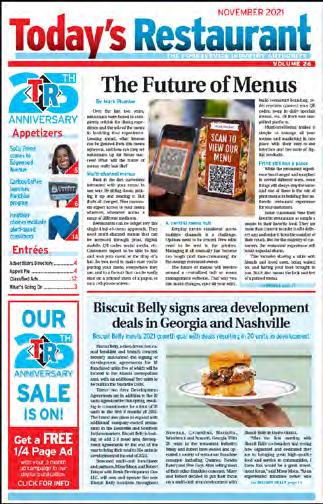

Advertising on the Today's Restaurant Website will expose your corporate or individual message to every visitor. Banner ads can be interactive animated messages. We’ll meet your ad needs and price point.
We’ll email your ad or video to our verified database of over 15,000 restaurants in Florida, Georgia, Texas and around the country. A 10%-20% open rate can be expected with each Eblast and all Eblasts are posted on our social media sites for even more exposure.
Video is hot! Show the industry what your company can provide with a Video Eblast featuring a great product or video interview. Ask to see a sample or call for pricing.
A few days after your initial Eblast, reach out to your Eblast recipients with another special offer. A higher open rate of 40%-70% is often achieved with Eblast Follow-Ups.
Subscribe to our Restaurant Leads Report and every month receive valuable industry sales leads on restaurant openings, restaurants under construction and under new management in an Excel spreadsheet format. Reports include the buyer’s name, phone number, zip code and email when available. Reports for Florida and Georgia are now available.
by Joe Carter, Consultant, The Franchise Consulting Company
"Cha" means tea. But at Chatime, it also means culture, curiosity, and connection.
Founded in 2005 in Taiwan and now franchising in 63 countries across six continents, Chatime has become one of the world’s largest and fastestgrowing bubble tea brands. With more than 1,500 global locations, including a footprint in India, Chatime’s presence feels both modern and deeply rooted—making it a perfect brand to spotlight during India Heritage Month. Because in many ways, Chatime’s story mirrors the diaspora’s: international, inventive, and proudly tied to tradition.
Chatime isn’t just tea—it’s global tea culture reimagined. Whether it’s mango milk tea in Mumbai, coconut lychee in Kuala Lumpur, or Thai-style boba in L.A., Chatime flexes flavors to fit local palates. Its expansion in India underscores a powerful truth: tea isn’t a product—it’s an identity. And with Chatime’s format, founders can serve that identity with innovation, speed, and scale. And it’s working.
In the crowded boba world, Chatime stands out through:
• Cha Lab – R&D powerhouse

creating new flavors and limited-time offers
• ChaSmart Go-To-Market Engine for local, regional, and global campaigns
• Scalable supply chain managed by Ten En Tapioca, the world’s top tapioca producer
• Low labor model: no full kitchen required, no grease traps
• Versatile formats: from 800–1,200 sq ft, fitting kiosks, malls, and urban corners And the kicker? You don’t need restaurant experience.

NO FOOD BACKGROUND? NO PROBLEM.
Chatime welcomes driven operators from any background. Their 3-week training program includes:
• On-the-job learning at HQ and in-store
• Site selection consulting
• Ongoing access to operations manuals and video training
• Full on-site support for your store opening You bring curiosity and drive. They bring the systems.
FRANCHISEES WELCOME. NO TEA SOMMELIER NEEDED.
Chatime isn’t looking for master chefs or celebrity mixologists.
Ideal owners?
• Former managers in retail or food & beverage.
• Operators who know how to hire, train, and lead a young team.
• People with $150K liquid and $500K net worth. You can be an owneroperator, go executive with a GM in place, or stack units as a multi-unit investor.
They even offer a $5,000 veteran discount on the initial franchise fee.
Chatime may be Taiwanese in origin, but its success in India makes it a global ambassador for tea culture.
Why does this resonate?
• India is the second-largest tea market on Earth
• Indian consumers are rapidly adopting premium
and international beverages
• Chatime’s flavors adapt beautifully—think cardamom, saffron, or mango pearls
• The Indian-American community brings generational passion for tea—and the business chops to scale it
Chatime is modern tea with cultural gravity. It’s tradition with a twist.
Chatime’s parent company, La Kaffa International, was the first tea franchise to IPO in Taiwan. It manages:
• Global distribution logistics
• Owned ingredient production (including the largest pearl factory in Taiwan)
• Digital tools and loyalty programs tailored by region
• Award-winning global CSR initiatives, from biodegradable packaging to health-focused community events
From Malaysia to Manhattan,

the brand is equipped to deliver scale with quality.
If you want a boba shop with low complexity, high demand, and global infrastructure—this is it.
If you’re looking for a way to honor India Heritage Month by serving culture in a cup—this might be your calling.
And if you're a builder ready to scale a brand that’s already resonating across continents, now’s the time.
Ready to stir up your own success?
Book a free discovery call with Joe Carter to explore if Chatime fits your growth goals:
Joe Carter is a strategic franchise advisor and founder of Twin Flame Group, helping entrepreneurs turn revenue into transferable value. With 27+ years in growth-stage ventures and M&A, he guides clients from discovery to opening their first location, scaling operations, and ultimately exiting at maximum value. Contact Joe at JCarter@ TheFranchiseConsultingCompany.com.


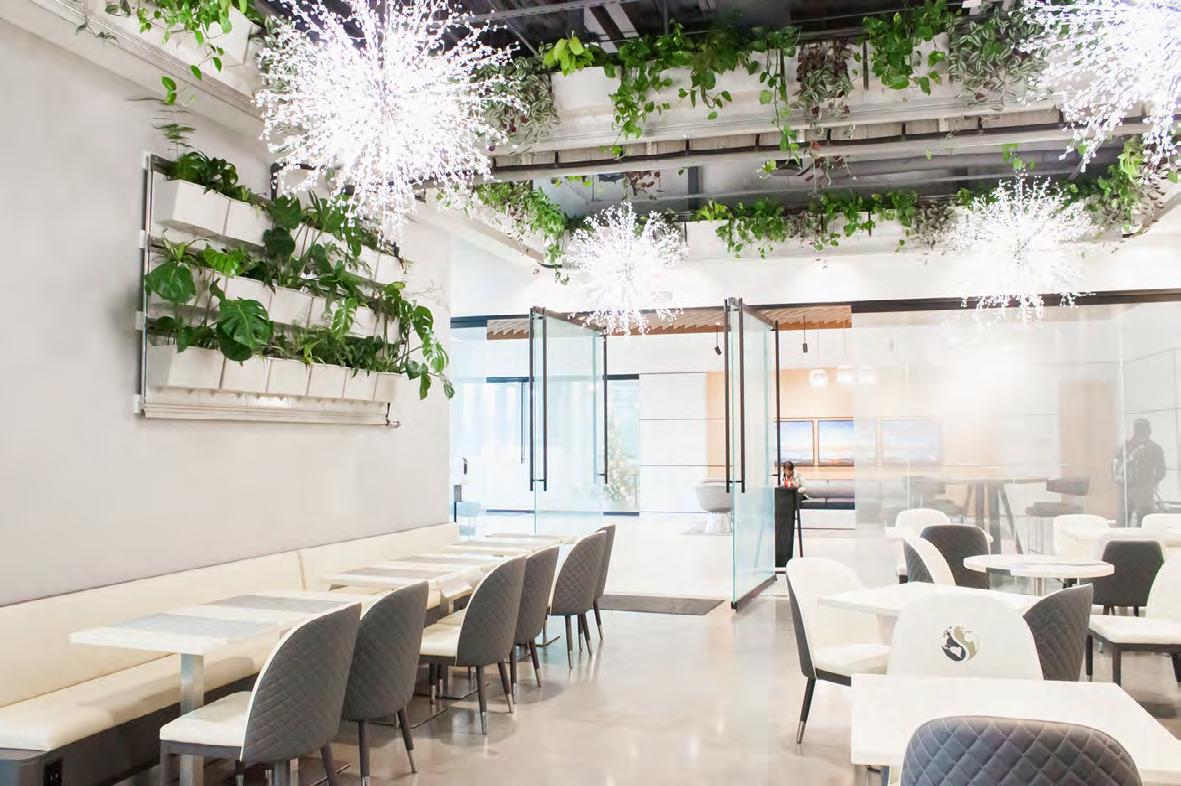

Lucrative Concept - optimized food and labor costs
Watch your profits and efficiency in real time
Quality Products - We offer homemade foods elaborated by a French team
Easy Concept to Install and operate - The concept is easy to set up and operates thanks to customized applications
Thorough & Continuous Training - dedicated and ongoing training. We are behind you at every stage
Proven Business Model - The successful European model received already 15 awards in the US since 2014

Coffee drinks sold in 2021
In 2020, the quick service restaurant (QSR) industry in the United States generated $239 billion in revenue, and roughly $12 billion of that was coming from South Carolina with $10 7 billion in estimated restaurant sales in 2018 Work closely with the founder & replicate this high revenue model A café with a 4-6 person team can gross over $1M and net almost $350k. Avg start-up investment is less than $200k

by India Franchise Council
The Indian American community represents one of the most dynamic and rapidly expanding Asian origin groups in the United States. With an estimated 4.8 million individuals as of 2023, Indian Americans are the second-largest Asian American group, constituting nearly 25% of the total Asian population nationwide. Drawing from a rich history of immigration tied to education, technology, healthcare, and entrepreneurship, Indian Americans have established themselves as a cornerstone of innovation and economic contribution. Their upward mobility, high educational attainment, and growing interest in business ownership make them a critical focus for franchise consultants, lenders, and community leaders alike.
POPULATION & GEOGRAPHIC DISTRIBUTION
• Population: Approximately 4.8 million Indian Americans in the U.S. (2023), with steady growth averaging 2-3% annually.
• Top states: California, New York, New Jersey, Texas, Illinois, and Florida host the largest Indian populations.
• Major metro areas: New York City, San Francisco Bay Area, Chicago, Houston, and Washington, D.C. metropolitan regions are key hubs.

DEMOGRAPHICS & EDUCATION
• Median Age: 35.5 years — slightly younger than the U.S. median (38.9) but older than the overall Asian median (34.7).
• English proficiency: Over 90% of Indian Americans age 5+ speak English proficiently, well above the Asian average (74%) and U.S. average (91%).
• Educational attainment: 75% of Indian Americans aged 25+ hold a bachelor’s degree or higher, the highest among all

Asian groups and well above the U.S. average (38%). This includes a strong representation in STEM fields, healthcare, and business.
• Median household income (2023): Approximately $130,000, significantly higher than both the overall Asian average ($105,600) and the U.S. average ($79,200).
• Median personal earnings: Around $65,000, reflecting strong labor force
participation and highpaying professions.
• Poverty rate: Approximately 7%, lower than the Asian average (10%) and the national average (11%).
• Homeownership rate: Near 70%, slightly above the Asian average (62%) and the U.S. average (66%).
• Indian Americans have long been recognized for their entrepreneurial spirit:
• Small businesses span sectors such as technology services, retail, healthcare, restaurants, and professional services.
• Increasing interest in franchise ownership, especially in sectors like food and beverage, health and wellness, and IT services franchises.
Indian American entrepreneurs contribute to a vibrant startup ecosystem, creating jobs and driving innovation.
• Active civic engagement across multiple states, with growing representation in government, education, and philanthropy.
• Strong community organizations providing mentorship, networking, and resources for aspiring business owners and young professionals.
• Growing emphasis on intergenerational wealth building through homeownership and business succession planning.
• Challenges: Despite high overall success, certain subgroups face language barriers, credential recognition issues, and access to capital hurdles for new immigrant entrepreneurs.
• Opportunities: Franchise consultants and lenders should tailor programs to support firsttime Indian American franchisees and small business owners.
− Community-based financial literacy and business coaching can unlock the next wave of Indian American economic growth. Leveraging tech expertise for scalable franchise models and servicebased enterprises presents a promising path forward.
Indian Americans exemplify a model of immigrant success built on education, hard work, and innovation. Their robust presence in high-growth industries and increasing appetite for franchise and business ownership offer tremendous opportunities for partnership and development.
As a franchise and business consultant, I see this community as a priority market — one that, with strategic support and inclusive outreach, will continue to shape the future of American entrepreneurship.
Jack Tiwari is a seasoned business consultant, community leader, and cultural advocate. With a deep understanding of the franchise industry, he helps entrepreneurs achieve success in franchise sales and acquisitions, business development, and social impact. Contact Jack at jack@ thefranchiseconsultingcompany.com.

Become a HobbyTown franchise owner today and take back your time, earning power and future.



With over 100 locations across 39 states, HobbyTown is the largest brick-and-mortar hobby retailer in the world. As a franchisee, you can help spread the joy that our products provide to thousands of our customers.
Chart your own course.
Build your team and take leadership. Set the pace and fill your day, your way.
(Plus, you'll get to write and cash your own checks.)
Franchise in a box, no assembly required.
New to franchising? No problem. With our extensive network of franchises, we help new owners get their locations up and running.
We've got your back with dedicated support.
As you grow your business, we’ll support you with advertising and marketing solutions, along with day-to-day resources like IT support and inventory management.



BETTERING THE LIVES OF EVERYDAY FAMILIES THROUGH THE CREATION AND DELIVERY OF INNOVATIVE AND CUSTOMIZED WELLNESS PROGRAMS, GOODS AND SERVICES.
• Outpatient mental health
• Medication management
• Children’s mental health specialists
• Group & workshops
• Web-based & mobile options
• Clinical training & supervision program
• Co-parenting institutes
• Mediation assistance
• Embedded services program
• We provide personalized treatment plans that address mind, body, and spirit
• We customize services to meet various, diverse, and multifaceted needs
• We provide “in-person” therapeutic services, AND we develop creative interventions to increase access for clients who experience barriers to a traditional format
• We use technology to integrate mental health services into the 21st century
• We place importance on having fun throughout the wellness process
• We have fully licensed providers who provide ethical, compassionate, and effective therapeutic services
• We have engaging up-and-coming professionals in training and develop innovative programs for future generations of practitioners and clientele
• We offer an income-based sliding fee scale for non-insurance covered services
JEN RIECK
email: jrieck@repmgroup.com phone: 720.245.1252
KELLY AMSHOFF
email: kelly@repmgroup.com phone: 773.484.7198
$250,000 $150,000 Initial investment range Net worth requirements Liquidity requirements
$201,013 - $404,957
Rep’M Group, LLC (“Rep’M”) is a franchise seller/broker representing Ellie Family Services (“Ellie”). This advertisement does not constitute a franchise offering or the solicitation of an offer to buy an Ellie franchise which may be made only after your receipt of Ellie’s Franchise Disclosure Document, which first must be registered with certain states. Ellie franchises are offered solely by means of the franchise disclosure document issued by Ellie Family Services, 1370 Mendota Heights Road, Mendota Heights, Minnesota 55120. Certain states and foreign countries have laws governing the offer and sale of franchises. If you are a resident of one of these states or foreign countries, Ellie will not offer you a franchise unless and until it has complied with all applicable legal requirements in your jurisdiction. Please consult with your franchise seller/broker at Rep’M for an updated list of jurisdictions where franchises can be sold. RESIDENTS OF NEW YORK: This advertisement is not an offering. An offering can only be made by a prospectus filed first with the Department of Law of the State of New York. Such filing does not constitute approval by the New York Department of Law. RESIDENTS OF MINNESOTA: MN Franchise Registration Number: TBD. Copyright© 2022. Ellie Family Sevrices, ALL RIGHTS RESERVED.
by India Franchise Council
In every culture, food nourishes the body. But in India, food also nourishes identity, habit, and community. It is meditation in motion—infused with intention, ritual, and deeply rooted values. In my own journey as an entrepreneur and someone who truly enjoys good food, I've come to realize how Indian food traditions subtly build the very habits we need for lasting success: attention to detail, routine, consistency, generosity, and above all, connection.
As a network marketing professional who travels frequently and thrives in the world of financial, real estate, and franchise services, I’ve come to appreciate just how central food is to forming relationships. Whether I'm in the U.S., India, or Europe, the most meaningful business conversations and personal connections often happen around a shared meal.
In multicultural environments, food becomes the bridge that dissolves barriers. No matter your background or beliefs, a great meal creates an opening—an opportunity to slow down, connect, and truly know one another. I’ve often said I’m a foodie who’s willing to pay a higher price for food that truly
satisfies my palate, not just fills the stomach. And in this world of fast connections and faster deals, that satisfaction—built on authenticity and flavor—is rare and valuable.
What makes Indian food stand out is not just the flavor, but the philosophy behind it. Spices are used not only for taste but also for their healing and digestive properties. Natural colors come from real ingredients—turmeric, beetroot, spinach, saffron. Even
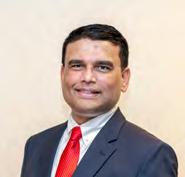
the structure of a traditional thali or meal plate reflects Ayurvedic balance: a harmonious mix of sweet, sour, salty, bitter, pungent, and astringent flavors. You’re not just eating—you’re aligning your body and mind.
For vegetarians and vegans especially, Indian cuisine offers extraordinary variety and nourishment. The plantbased options are not an afterthought—they are the main event, prepared with care, depth, and creativity.

As awareness grows globally about conscious eating, Indian meals are becoming more than ethnic food— they're becoming a cultural phenomenon.
One of the most heartwarming aspects of Indian dining culture is the tradition of eating together. Inviting families, friends, and even new acquaintances over for a meal is a form of love and respect. It builds emotional intelligence, community bonding, and long-term trust—qualities essential for both personal life and business success.
Recently, my journey led me to discover two extraordinary restaurants in New Jersey— both examples of how passion for food and cultural authenticity can lead to immediate success, even in a highly competitive market.
Gaurav Mathur, the head chef at Mannat https://www. mannatnj.com/ in Kingston, NJ, brings not only culinary expertise but deep emotional resonance to his food. His dishes reflect precision, flavor, and an artistic flair for presentation. What sets Mannat apart is not just the cuisine, but the experience— it’s curated, intimate, and welcoming.
Balaji, the owner of Balaji Bhavan https://balajibhavannj. com/ in Jersey Heights, has created a space that feels like home. The moment you step in, you feel a sense of warmth and community. The food is rooted in traditional South Indian recipes, yet there's

innovation in how the dishes are presented and paired. From the first day, the restaurant has seen packed tables and glowing reviews.
What makes these places special isn't just the food. It's the Chefs' passion behind the plate, not compromising on the freshness of the food prepared every day/intra day without letting in the frozen or packaged food, the thoughtful design of the ambience, and the disciplined consistency and care in service. These are qualities that make a strong foundation for franchise success, and I look forward to supporting them in scaling when the time is right—if they let me help them, of course. Their stories are living proof that when food is prepared with love and discipline, it becomes a force not just for personal enjoyment—but for cultural impact and business growth.
SPOTLIGHT ON CHEF
GAURAV MATHUR –CULINARY VISIONARY BEHIND MANNAT
From the opposite side of the country comes Chef Gaurav Mathur, a culinary leader who has redefined Indian fine dining in New Jersey. Mannat — formerly known as Urban Spice — stands as a beacon of excellence, where every dish is made from scratch using only fresh ingredients and never any frozen components.
Chef Gaurav has been recognized among the Top 25 Chefs in America, and his pedigree is backed by years of experience with India’s legendary ITC Hotels. He was a member of the pre-opening teams at iconic properties such as ITC Royal Bengal (Kolkata), ITC Sonar (Kolkata), ITC Grand Chola (Chennai), and ITC Grand Maratha (Mumbai).

A rare blend of art and analytics, Chef Gaurav is also Green Belt Six Sigma certified, combining culinary creativity with a disciplined commitment to precision and consistency. This ensures that every dish served not only reflects authenticity and care, but also delivers consistently outstanding quality.
At Mannat, guests are invited to taste the difference that passion, skill, and uncompromising standards can make. As someone who has experienced his work firsthand, I can confidently say that Mannat isn’t just a restaurant—it’s a tribute to Indian culinary excellence and hospitality.
Balaji Narasimhan Mani hails from Thiruthani, a spiritual town in India. Born into a family of traditional farmers, Balaji became the first in his lineage to pursue a career in hospitality. After studying hotel management, he honed his culinary craft with
the prestigious Taj Group of Hotels in India before settling in New Jersey.
In October 2024, he opened Balaji Bhavan, an authentic Tamil vegetarian restaurant in Jersey Heights. Since its opening, the restaurant has gained an almost legendary status in the community—with lines of customers waiting at least 30 minutes just to get a table or add their names to the next seating list.
Balaji has brought the essence of Tamil culture to life with a commitment to preparing fresh food several times a day. There is no compromise on quality, and the experience reflects his deep-rooted values of hospitality, tradition, and care.
Importantly, Balaji Bhavan is his third successful restaurant in Northern New Jersey—a testament to his vision, discipline, and culinary leadership. His other two restaurants have also developed strong customer loyalty through authentic food and heartfelt service.
Beyond the kitchen, Balaji is
deeply spiritual. His approach to food and hospitality is shaped by reverence, humility, and a sincere commitment to service.
As someone who experienced it personally, I absolutely enjoyed the authenticity of Tamil cuisine in his dishes—a beautiful blend of simplicity, flavor, and love.
In Indian culture, the guest is considered “Atithi Devo Bhava”—the guest is God. This attitude permeates every dining experience, whether in a small home or a five-star restaurant. It is a form of daily discipline—a commitment to care, to serve, and to uplift.
When you host with this mindset, it becomes a habit. And when you bring that habit into your work—whether in franchising, consulting, or leadership—it builds trust, reputation, and repeat success.
The discipline behind Indian food traditions teaches us something powerful: that success isn’t only built in boardrooms or spreadsheets— it can be cultivated in the kitchen, around the table, and in the habits of hospitality.
As we partner with each other to expand the financial services business, real estate investments, franchises, grow our networks, and deepen our purpose, let’s remember what food teaches us: to pay attention, to serve well, to nourish deeply, and to build together. After all, a great meal may last only an hour—but the relationship it creates can last a lifetime.
Franchising is a Beautiful Thing
Franchise Fees:
Single Unit: $51,900
Triple (Most Popular!): $104,900
Five Units: $165,700
Investment Range:
$214,662 (4 bed studio)
$460,480 (8 bed studio) (incl. 3 mos. cash flow)
Royalties: 6%
OUR IDEAL CANDIDATE
$500k Net Worth | $100k Liquid 35-60 Years Old
Couples and Professionals
Franchisees of Other Brands
Studios Currently Open 100
Studios In Development 119
Ricki Wilkins | Sr. Franchise Director 937-289-4050 | rw@lookgood-
Proven Semi-Passive Model
Corporate Call Center – books all appointments, takes customer service calls.
No Receptionist – all employees are revenue generating
EBITDA – Over $113k!
AI Innovations – New Smartphone App! Auto check-in, appointment scheduling and management, text your studio option
Exclusive TrueXpress: double the services, double the revenue – lashes in half the time!
Franchise Advisory Council
Lash Artist Training on-site: multiple career paths for lash artists
Brow Lamination: the perfect compliment to beautiful lashes
Average Gross Revenue: $554,973
TERRITORY:
Cincinnati, Cleveland, Phoenix, San Diego, Augusta, Charleston, Detroit, Philadelphia, Orlando, Houston, Nashville, Memphis, Knoxville, San Francisco, Las Vegas, WI, DE, CT, RI, NY, MA, CA, UT, IN, AL, MS, Canada.
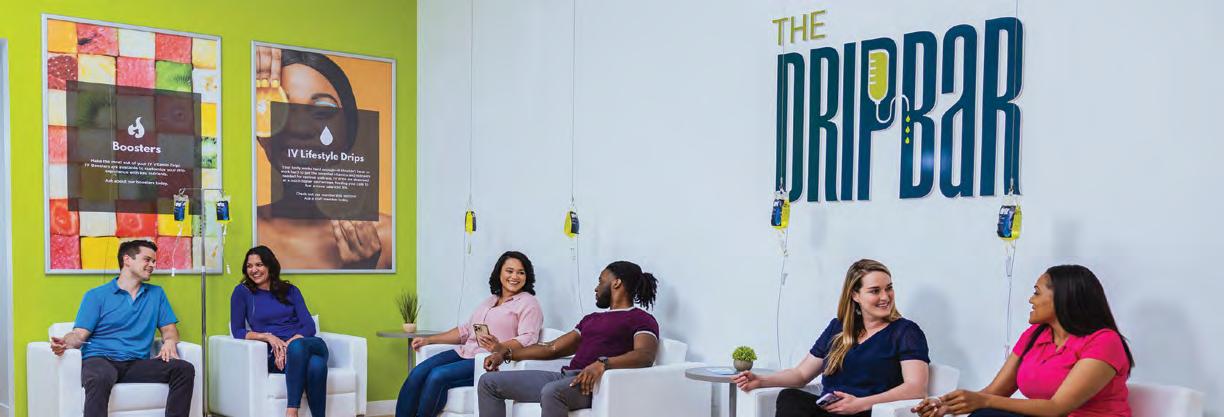




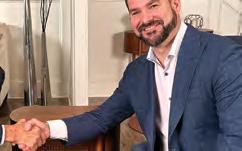





























After opening in 2017, 1611 Indoor Golf Club has quickly become the premier golf game improvement and entertainment facility in the Dallas- Fort Worth Metroplex. We offer something for golfers of all skill levels. Improve your golf skills using our state-of-the-art tracking Trackman technology or grab a drink at our full bar and choose from over 200+ world famous courses to play a full round.

by India Franchise Council
The story of Afghan Americans is one of courage, endurance, and rebuilding — shaped by decades of displacement, war, and forced migration. While recent global events have drawn attention to Afghanistan’s humanitarian crisis, Afghan Americans have been contributing to U.S. society since the 1980s — in education, healthcare, small business, and public service. According to 2023 estimates by the U.S. Census Bureau and Pew Research Center, the Afghan American population is approximately 160,000, making it one of the fastestgrowing Asian origin groups in recent years. Following the U.S. withdrawal from Afghanistan in 2021, tens of thousands of Afghan refugees entered the U.S. under humanitarian parole programs, increasing the urgency for economic and community integration. As a franchise consultant working with new Americans, I’ve seen how Afghan families — especially in places like Virginia, California, and Texas — are seeking financial security through small business, education, and homeownership. Here’s a comprehensive look at this community’s demographics, challenges, and opportunities.
• Estimated Population (2023): ~160,000
• 87% are foreign-born (vs. Asian Americans: 66%; U.S. overall: 14%)
• Many arrived in waves:
− 1980s: Soviet-Afghan war refugees
− 2000s: Post-Taliban professionals and familybased migrants
− 2021–2022: Tens of thousands entered as refugees, evacuees, or parolees under Operation Allies Welcome
Takeaway: Afghan Americans are a primarily refugee-origin community, with a growing mix of second-generation youth and skilled professionals seeking long-term stability.
• California (~60,000) –especially Fremont, Sacramento, and Los Angeles
• Virginia – particularly Northern Virginia (Fairfax, Alexandria)
• Texas, Arizona, and New York also have growing populations
Takeaway: Afghan communities are forming tightknit enclaves in states that offer refugee support infrastructure,
employment
access, and faithbased services.

DEMOGRAPHICS
• Median age: ~28 years
− vs. Asian Americans: 34.7 vs. U.S. overall: 38.9
• Large families and multigenerational households are common
• ~40% of Afghan Americans are under age 18
Takeaway: A young, familyoriented population with growing needs in education, childcare, healthcare, and youth services.
• Primary languages at home: Dari, Pashto, Farsi, and English (among U.S.-born youth)
• English Proficiency (ages 5+): ~52%
− vs. Asian Americans: 74% vs. U.S. overall: 91%
Takeaway: English barriers remain significant, especially among recent arrivals and older adults — making ESL programs essential for workforce participation and entrepreneurship.
• Only 28% of Afghan Americans age 25+ hold a
bachelor’s degree or higher vs. Asian Americans: 56%
− vs. U.S. overall: 38%
• Many arrived with incomplete formal education due to prolonged displacement
• Younger generations are making progress in college enrollment and STEM careers
Takeaway: Educational gaps reflect the refugee background — but strong cultural emphasis on learning is creating upward momentum among youth.
Median Household Income (2023):
• Afghan Americans: $65,000 vs. Asian Americans: $105,600 vs. U.S. overall: $79,200
Median Personal Earnings (16+):
• Afghan Americans: $36,000
− vs. Asian Americans: $52,400
− vs. U.S. overall: $44,200
Poverty Rate:
• Afghan Americans: 23%
− vs. Asian Americans: 10% vs. U.S. overall: 11%
Takeaway: Afghan households have relatively modest earnings and higher poverty rates. Still, a large share of adults are employed full-time, especially in transportation, food service, security, and manufacturing.
Afghan Americans are increasingly starting small businesses, particularly in:
• Grocery and Halal meat stores
• Transportation (rideshare, trucking)
TO 2023 ESTIMATES BY THE U.S. CENSUS BUREAU AND PEW RESEARCH CENTER, THE AFGHAN AMERICAN POPULATION IS APPROXIMATELY 160,000, MAKING IT ONE OF THE FASTEST-GROWING ASIAN ORIGIN GROUPS IN RECENT YEARS.
• Restaurants, bakeries, and catering
• Home remodeling and cleaning services
Takeaway: Entrepreneurship is often a preferred path due to limited credentials and language barriers. With better access to capital, many could scale into franchise models, retail operations, or contracting businesses.
• Homeownership Rate: ~49% vs. Asian Americans: 62%
− vs. U.S. overall: 66%
• Many live in rental housing, especially in high-cost cities or near refugee resettlement hubs
Takeaway: Access to culturallyinformed financial education, lending programs, and firsttime homebuyer support could dramatically improve long-term asset-building.
Afghan Americans are active in:
• Faith-based organizations and mosques
• Mutual aid networks for newly arrived refugees
• Local elections, school boards, and nonprofits (especially in Virginia and California)
Takeaway: While still gaining civic visibility, Afghan Americans are stepping into leadership roles — especially through youth, women, and second-generation leaders.
The Afghan American community reflects both the hardship of forced migration and the hope of a better future. With resilience as their foundation, Afghan families are laying down roots through hard work, cultural pride, and a desire to rebuild.
But the path ahead requires investment: in language access, vocational training, housing support, and small business infrastructure. As a business consultant focused on first-time buyers and franchise entrepreneurs, I believe Afghan Americans — particularly those in logistics, food, and retail — are ready for ownership opportunities that create long-term prosperity.
Let’s not just welcome Afghan families — let’s empower them to own, lead, and thrive.
Jack Tiwari is a seasoned business consultant, community leader, and cultural advocate. With a deep understanding of the franchise industry, he helps entrepreneurs achieve success in franchise sales and acquisitions, business development, and social impact. Contact Jack at jack@ thefranchiseconsultingcompany.com.










by India Franchise Council

After more than two decades shaping the future of technology at companies like Microsoft, Amazon, and IBM, Saurabh Choudhury is now focused on something closer to home—and heart: helping people in his community live stronger, healthier lives. As the owner of an Alloy Personal Training franchise in the Greater Seattle area, Saurabh has traded algorithms for accountability, boardrooms for barbells, and software for strength training. But his story starts much
earlier—thousands of miles away in the culturally rich region of northeast India. Growing up in a business family alongside two siblings, Saurabh was immersed in entrepreneurship from a young age. Summers spent working in his father’s pharmaceutical distribution business taught him the fundamentals of sales, operations, and, most importantly, the value of hard work and community connection.
That early exposure planted seeds that would grow
throughout his life. After earning an engineering degree, Saurabh took a leap of faith and moved to the United States in the early 2000s—a decision that opened the door to a dynamic, 25-year career in the technology sector. Along the way, he launched multiple software startups that helped fund his education and refine his leadership skills.
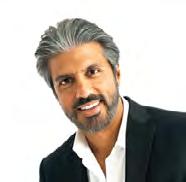
At Microsoft, where he served as a Group Product Manager and Director, Saurabh led global teams and played a pivotal role in building and scaling the Windows App Store, directly impacting billions of users. Yet, despite the professional success, a deeper desire had begun to take root.
“I found myself yearning for something more personal and impactful,” he shares. “I wanted to build something tangible, something that created meaningful change at a human level—and I wanted to do it within my own community.” That desire led him back to his entrepreneurial roots, and ultimately to Alloy Personal Training. The boutique fitness franchise, known for its science-based approach to personalized strength training,

offered the perfect mix of business simplicity and human connection.
At his Alloy studio, Saurabh and his team focus on empowering clients through expertly guided, personalized fitness programs. From weight loss goals to strength gains, each member’s journey is unique—and deeply supported. “We meet people where they are,” he says. “Our mission is to help them live more active, confident lives by providing the structure, accountability, and encouragement they need.”
3 key aspects always kept Saurabh motivated towards entrepreneurship –Autonomy—the freedom to make decisions and shape the direction of his business, Community Connection— being an active part of the local community, supporting others, building relationships, and Asset Building—securing his family’s future and leaving a legacy.
Saurabh finds immense value in being part of a larger system. He relies on the franchise system for expert guidance to help navigate challenges. The peer community of franchise owners share a sense of camaraderie and generously share their experiences, insights, and resources. “Franchising is not just about replicating a business model; it’s about joining a network of likeminded entrepreneurs, each contributing to and benefiting from collective growth and
innovation”, says Saurabh Now mostly retired from the corporate world, Saurabh finds immense satisfaction in his new role. Not only has it given him more control over his time and energy, but it’s also allowed him to reconnect with the hands-on ownership spirit that inspired him as a child. He sees the business not just as a financial investment, but as a legacy—something he hopes will inspire his own children, just as his father inspired him. Today, Saurabh lives in the Seattle area with his spouse and two children. When he’s not at the studio, you’ll find him enjoying quality family time, indulging in hobbies, and engaging with his vibrant local community.
Saurabh’s journey has been one of growth, adaptation, and continuous learning. In his own words – “I hope my story inspires others to embrace their entrepreneurial spirit, pursue their passions, and
make a meaningful impact in their communities. If you’re considering business ownership, remember: the path is challenging but immensely rewarding, and you don’t have to walk it alone.”
Kapil Manocha is a multi-unit franchise owner, a leading franchise coach, a public speaker, and an author. Drawing on years of experience Kapil has helped hundreds of people gain personal and financial independence through franchising. Contact Kapil at kapil@ thefranchiseconsultingcompany.com.



GarageExperts® offers a compelling franchise opportunity for entrepreneurs looking to break free from the corporate world and build a thriving business in the $538 billion home improvement market. With over 15 years of experience, GarageExperts® has developed a proven, innovative business model that allows for profitability in the first year. Take control of your future in a garage makeover business with significant profit potential and the freedom to be your own boss.


by India Franchise Council
After over two decades in healthcare, this Indian American couple wasn’t just looking for a new business— they were looking for a new way to serve. They found it in Hawaii Fluid Art, a unique, inclusive art experience that inspires creativity, connection, and healing.
Their studio has quickly become a hub of joy in the community, where anyone— regardless of background or skill—can walk in, create something beautiful, and walk out feeling empowered.
I chatted with the franchisees Ashish and Kinnary Patel to learn how they made the leap from healthcare professionals
to creative entrepreneurs—and how franchising with heart has become their most fulfilling journey yet.
WHAT INSPIRED YOU TO OPEN A HAWAII FLUID ART STUDIO?
We were inspired by how art brings joy and healing to people, no matter their background or skill level. When we found Hawaii Fluid Art, we immediately connected with its welcoming vibe and inclusive mission. It wasn’t just about painting—it was about creating memorable, feelgood experiences that connect people. We wanted to bring that energy and creativity to our community.

WHAT WERE YOU BOTH DOING

BEFORE STARTING THIS VENTURE, AND HOW DID FRANCHISING COME INTO THE PICTURE?
We have been in healthcare for over 25 years. Although those careers were fulfilling in many ways, we both felt a strong desire to build something meaningful of our own. Franchising provided the opportunity to develop a business with a proven model while adding our personal touch. It felt like the right path to turn passion into impact.
WHAT MAKES HAWAII FLUID ART DIFFERENT FROM OTHER ART EXPERIENCES?
HFA stands out because it truly is for everyone. No art background is needed, and guests leave with something beautiful and deeply personal. It's more than an art class—it’s an immersive, fun, and often therapeutic experience. Many discover a side of themselves they didn’t know existed, which is powerful.
HOW HAS THE LOCAL COMMUNITY RESPONDED SO FAR?
We’ve been so thankful for the warm reception. Families,

tourists, schools, and wellness groups have all embraced our studio. It’s become a place where people celebrate milestones, relieve stress, and connect with others. We’ve had guests tell us they didn’t think they were “artistic,” but now they can’t wait to come back. That transformation is gratifying.
WHAT WAS THE PROCESS OF CHOOSING THE FRANCHISE? HOW LONG DID IT TAKE, AND WHY DID YOU PICK HFA?
We spent a few months exploring options, asking questions, and making sure the brand aligned with our goals. HFA stood out because of its simplicity, support level, and heart-centered approach. We wanted a concept that embodied creativity, inclusivity,
and joy, and HFA delivered.
HOW WAS YOUR EXPERIENCE WORKING WITH THE FRANCHISOR DURING SETUP?
The corporate team was involved throughout the process, from design, training, and setup. They were accessible, encouraging, and truly invested in our success. That made the entire startup process smooth and boosted our confidence.
HOW DO YOU BALANCE YOUR ROLES AS BUSINESS PARTNERS AND A COUPLE?
We make a point to separate work talk from personal time, though it’s easier said than done! We’ve learned to play to each other’s strengths and communicate openly. We remind ourselves that we’re
on the same team, not just in business, but in life. Our shared values—like resilience, family, and hard work—also help keep us grounded.
DO YOU PLAN TO OPEN MORE LOCATIONS OR EXPAND YOUR OFFERINGS?
Absolutely. We’re already looking into more locations and aiming to expand with new art formats, collaborations, and custom product lines. We see this as just the beginning and want to keep bringing creativity and connection to more communities.
WHAT’S THE BIGGEST LESSON YOU’VE LEARNED SINCE OPENING?
That building a business is really about building relationships. It’s not just operations—it’s about
empathy, patience, and community. Every guest matters, and every experience we create adds to something bigger than ourselves.
Choose something you truly believe in—something that aligns with your purpose, not just your profits. Do your research, but trust your gut. A strong franchise system can give you the framework, but it’s your passion and dedication that will make it thrive.
As Indian Americans, this journey means a lot more than just owning a business. It’s about honoring the sacrifices our families made and building a legacy that reflects both our heritage and our dreams. We carry strong values of
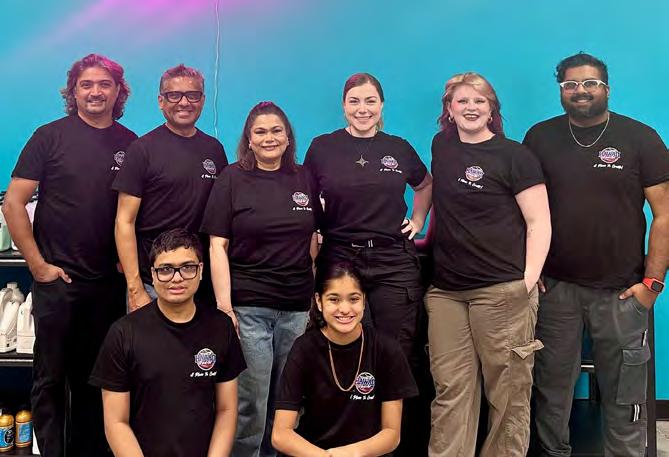
community, entrepreneurship, and hospitality, deeply rooted in our culture. We hope our story inspires others in the Indian American community to embrace their creativity, take bold steps, and build something meaningful of their own.
Seema Govil, a Versatile Leader: Bridging the Worlds of Franchise Consulting, Media, and Philanthropy as the Founder and CEO of Cosmo City Media. For franchising help, contact Seema at Seema@ thefranchiseconsultingcompany.com.









Comprehensive
Unwavering Customer Support

The home remodeling industry is projected to reach $600 billion by 2030, and cabinet painting is at the forefront of this growth. As homeowners seek affordable yet impactful ways to refresh their spaces, cabinet painting has become one of the most in-demand services in the market.
With Joyful Cabinet Painting, you can capitalize on this booming industry and start your own business with ease. We provide everything you need to succeed, from comprehensive training to ongoing marketing support and expert guidance.


Go Go Curry has been proudly serving authentic Japanese Curry to our hungry customers since 2007, and are poised at the forefront of the growing Japanese Curry craze. Over the last decade, Go Go Curry has established itself as the industry leader in this emerging culinary market which brings a unique style and flavor to the fast casual industry. Our menu is simple – we offer housemade curry sauce with the freshest ingredients and served over Japanese premium rice, topped with a choice of pork, chicken, fish or tofu katsu made to order.
Japanese curry is a staple comfort food that is often compared to ramen or sushi. However, there is currently no other QSR franchise offering this type of cuisine. We offer a simple menu, simple operation, great ROI, exceptional customer following, and 15 years of expertise with multiple corporate stores. Our brand originated in Japan in 2003 and has proven successful throughout the US since 2007.
In Japanese, “Go” means the number 5, and it has been our goal to always bring joy to our customers and employees by living our “5 Spirits”: SERVE WITH A SMILE COMMUNICATE WELL AND WORK AS A TEAM HELP AND RESPECT EACH OTHER ALWAYS TRY TO IMPROVE THINK POSITIVE EVERY DAY
HIGHLIGHTS
• Unique niche in QSR industry
• 15 years of proven experience
• Scalable, simple, easily replicated
• Small footprint
• Semi-absentee or owner/operator
• Fast and friendly atmosphere
INVESTMENT RANGE
$456,735 TO $678,905
Franchise Fee: $49,000 Royalty: 6%
Footprint: 1200-1800 sq ft
Required Liquid Capital: $200,000
Required Net worth: $500,000



• Cares about quality food and happy staff
• Enjoys networking in the community
• Good communication skills
• Desire to build a business and follow a system
• Ability to hire staff and build teams as business grows
by India Franchise Council
As someone who works closely with first-generation entrepreneurs, immigrant families, and emerging communities, I’ve seen how Bangladeshi Americans are quietly shaping neighborhoods, businesses, and institutions across the U.S.
With deep cultural pride and a strong drive for education and economic stability, this group is rapidly becoming a vital part of America’s immigrant success story.
In 2023, an estimated 213,000 people in the United States identified as Bangladeshi, according to U.S. Census Bureau estimates analyzed by the Pew Research Center. This makes Bangladeshis the 16th-largest Asian origin group, accounting for approximately 1% of the Asian American population.
Let’s take a closer look at the demographic, educational, and economic profile of Bangladeshi Americans — and how their growth compares with national benchmarks.
POPULATION & IMMIGRATION TRENDS
• 213,000 Bangladeshi Americans as of 2023
• 77% are foreign-born (immigrants), compared to: Asian Americans: 66%
− U.S. overall: 14%
• 46% of Bangladeshi immigrants have lived in the U.S. for over 10 years
• 44% are naturalized U.S. citizens
Takeaway: Like many South Asian communities, the Bangladeshi population is heavily first-generation, though naturalization and community roots are deepening.
Top states:
• New York: ~90,000 (home to nearly 40% of all Bangladeshis in the U.S.)
• Michigan, New Jersey, Texas, and California also host sizable populations
Top metropolitan areas:
• New York City (especially Jackson Heights, Bronx, and Brooklyn)
• Detroit Metro Area
• Paterson–Passaic, NJ
• Dallas-Fort Worth
Takeaway: Bangladeshi Americans have built strong urban communities, with enclaves often anchored by family businesses, mosques, and cultural centers.
• Median Age: ~29.6 years vs. Asian Americans: 34.7
− vs. U.S. overall: 38.9

• Roughly 32% of Bangladeshi Americans are under age 18
• Multi-generational households are common
Takeaway: A youthful population and strong family ties signal long-term community sustainability — and future demand for education, jobs, and housing.
• Bangla (Bengali) is spoken in over 90% of Bangladeshi American homes
• English Proficiency (age 5+):
− Bangladeshis: ~54%
Asian Americans: 74%
− U.S. overall: 91%
Takeaway: English proficiency remains a challenge, particularly for older immigrants — highlighting the need for adult ESL and workforce integration programs.
• 41% of Bangladeshi Americans (25+) hold a bachelor’s degree or higher vs. Asian Americans: 56%
− vs. U.S. overall: 38%
• Among U.S.-born Bangladeshis, education levels are significantly higher than among the foreign-born

Takeaway: Educational attainment is solid but trails other Asian subgroups — especially among older immigrants. However, the second generation is rapidly closing that gap.
Median Household Income (2023):
• Bangladeshi: $70,000
− vs. Asian Americans: $105,600
− vs. U.S. overall: $79,200
Median Personal Earnings (16+):
• Bangladeshi: $34,000
− vs. Asian Americans: $52,400
− vs. U.S. overall: $44,200
Poverty Rate:
• Bangladeshi: 23%
vs. Asian Americans: 10%
− vs. U.S. overall: 11%
Takeaway: Despite strong work ethic and entrepreneurial drive, many Bangladeshi Americans remain in low-wage jobs. There's an urgent need for small business support, access to capital, and workforce training.
Many Bangladeshis operate:
• Convenience stores, gas stations, and restaurants
• Rideshare and delivery businesses
• Real estate, construction, and retail shops
Franchise ownership is emerging — particularly in QSR (Quick Service Restaurant) and convenience-based models
Takeaway: The community is highly entrepreneurial, but often self-financed.
Franchise education, lending partnerships, and mentorship
could unlock scalable success. Homeownership
• Homeownership Rate: ~44%
− vs. Asian Americans: 62%
vs. U.S. overall: 66%
Takeaway: Many Bangladeshi families rent in high-cost cities. As incomes rise, homeownership programs and first-time buyer initiatives can accelerate stability.
• Marriage Rate: 63%
− vs. Asian Americans: 58%
vs. U.S. overall: 48%
• Fertility Rate (women 15–44): 7%
vs. Asian Americans: 5%
− vs. U.S. overall: 6%
Takeaway: Strong cultural values around marriage and family continue to anchor the community — a strength for intergenerational wealth transfer and education focus.
Bangladeshi Americans are a fast-growing, youthful, and determined community. With strong family values and entrepreneurial roots, they are well-positioned to thrive — especially with targeted support in language education, homeownership access, and small business development.
As someone committed to helping first-time business buyers and immigrant entrepreneurs build wealth through franchising and acquisition, I see tremendous potential in this community. Whether it’s owning a franchise, starting a business, or preparing the next generation for leadership — the future of Bangladeshi Americans is filled with opportunity.




by Amy Albiero, Streamline Brands Franchise Owner
Inever expected franchising to be part of my path after competitive swimming, but it turned out to be the perfect fit. It provided the framework, support, and growth opportunities to transform my passion into a career with purpose. Swimming has shaped my life in ways that go far beyond medals. I was a 27-time AllAmerican, 11-time National Champion, NCAA Division II Swimmer of the Year, and I
set the national record in the 100-meter backstroke. Despite those accomplishments, there was always a lingering feeling that something was missing. The thrill of racing was exhilarating, but the deeper fulfillment came from the relationships I built – the support from my coaches, the encouragement from my teammates, and the moments when belief in me made all the difference. That experience sparked a deeper purpose in

me: I realized I wanted to help others reach their potential the same way others helped me.
After years of coaching and being involved in the sport, my focus shifted in 2017. I wanted to make an impact even earlier in a swimmer’s journey, teaching toddlers and preschoolers how to be safe, comfortable, and confident in the water. To bring this

mission to life, I needed the right platform and a partner that shared my values and vision for growth. That’s when I found Streamline Brands, and everything changed.
Opening my first location in 2018 was the start of a completely new chapter, one where I could bring my coaching philosophy to life on a broader scale. Streamline Brands provided more than just a name or a business model. They offered infrastructure, strategic marketing, operational tools, and site selection expertise – all of which allowed me to focus on what I do best: coaching, leading, and creating a positive, nurturing environment for both swimmers and staff. What surprised me most is how franchising didn’t dilute my personal approach to coaching – it supercharged it. We blend the rigor of competitive swimming with the patience and care that little kids need. Whether its toddlers overcoming their fear of water or teenagers digging deep through tough workouts, my core values come through: speak greatness, foster courage, and build character one stroke at a time.
As an athlete, I lived by systems – structured training, clear goals, and measurable progress. Franchising felt familiar. It’s all about quarterly reviews, key performance indicators, team building, and always pushing to improve. Turning that athletic mindset into business muscle helped me grow responsibly, while keeping sight of why we started. My team shares that

vision, and together, we’re creating something bigger than any one of us.
If you’re thinking about franchising, my advice is simple: chase purpose, not brands. Find a brand that aligns with your personal values and gives you room to grow as a leader. Use your own story as your north star and lean into the structure – it’s what makes long-term success possible. Franchising isn’t casual entrepreneurship. It’s a disciplined, intentional form of leadership. It allows you to measure success not just in revenue, but in real, human impact.
Today, I wear many hats – athlete, coach, mom, and business owner – but they’re all part of the same story. A story about using the power of sport to lift others up. A story
about building a business that changes lives, one swimmer at a time.
After years of coaching and being involved in the sport, Amy Albiero’s focus shifted in 2017. Amy wanted to make an impact even earlier in a swimmer’s journey, teaching toddlers and preschoolers how to be safe, comfortable, and confident in the water.
Rick Morgin is a Consultant with The Franchise Consulting Company and alumnus of Santa Clara University. He assists clients with the educational process of researching and selecting available franchise businesses that best suit desired lifestyles and financial goals. Contact Rick at rick@ thefranchiseconsultingcompany.com.











by India Franchise Council
When Jay Shah founded Marigold Academy he was far from an education veteran. With a bachelor’s in Electrical & Computer Engineering and an MBA in Finance & Operations, Shah spent 15 years in corporate America—delving into engineering, supply chain, operations, finance, and accounting before discovering his passion for early childhood education in 2019. At the time it was very unlikely that the next chapter of his journey would be founding and guiding one of the fastest-growing childcare franchises in the U.S.— Marigold Academy.
In 2008, Jay was working in financial services when the financial crisis caused many banks and financial institutions to collapse. He became a casualty of the industry meltdown and was laid off. That was a wake up call for him to control his financial density. Shah’s entry into early childhood education was personal. After immigrating to the U.S. in 1995 and building a solid corporate career, he and his wife Kruti faced the same challenge that plagues many working parents: finding
high-quality, nurturing childcare. Disillusioned by what they found, Jay-alongside Kruti, founded Marigold Academy in 2019.
With a mission to create a “home away from home,” where children from six weeks to six years old could grow in a supportive, balanced environment, Marigold focused on quality from day one. Age-appropriate curriculums blend academics with socialemotional learning to nurture confidence, all delivered in

small-group settings with a low teacher-to-child ratio. Marigold Academy offers highquality care – It’s not just their enriching curriculum and clean facilities. Their real strength is their staff who treat each child like family, so children thrive.
Jay’s vision is to make Marigold Academy a household name in thoughtful childhood education and care nationwide. “I come across many passionate professionals who dream of starting a meaningful business but struggle with uncertainty


about where to begin and feel stuck without proper support to show them the way. We guide aspiring entrepreneurs across that daunting bridge through Marigold Academy's proven system and blueprint”, says Jay. Their comprehensive support to their franchisees, guiding them through every step including site selection analysis, design and construction support, targeted marketing strategies, extensive hiring and operations training, and ongoing mentoring to deliver exceptional enrichment programs in their local communities, sets their franchisees up for success.
“For me, this work is hugely rewarding – significantly benefiting families with high quality care, teachers through advancement opportunities, and professionals pursuing an enriching entrepreneurial legacy,” says Jay.
Jay’s advice for someone considering business ownership – “Start with your passions. Look for areas that genuinely excite you and align with your interests. Despite my engineering and finance background, I discovered my true calling in early childhood education. I wake up every day with purpose - to make Marigold Academy better for our children, teachers, parents, and franchisees”.

“FOR ME, THIS WORK IS HUGELY REWARDING – SIGNIFICANTLY BENEFITING FAMILIES WITH HIGH QUALITY CARE, TEACHERS THROUGH ADVANCEMENT OPPORTUNITIES, AND PROFESSIONALS PURSUING AN ENRICHING ENTREPRENEURIAL LEGACY.”
—
Jay Shah, Founder of Marigold Academy
Jay Shah’s journey shows that passion, when aligned with purpose, can transform careers and industries.
Marigold Academy isn’t just a childcare provider; it's a legacy builder. Teachers find careers, franchisees find purpose, and families find peace of mind.
It's a model that champions community, championing the future—one child, one teacher, one school at a time.
In a world where highquality early education is
more essential than ever, Jay Shah is proving that relentless vision, corporate rigor, and heartfelt compassion can bloom into something truly golden.
Kapil Manocha is a multi-unit franchise owner, a leading franchise coach, a public speaker, and an author. Drawing on years of experience Kapil has helped hundreds of people gain personal and financial independence through franchising. Contact Kapil at kapil@ thefranchiseconsultingcompany.com.




Single Unite Franchise Fee: $50,000
3-5 Employees
7% Royalty
Total Investment $250,000-$550,000
Studio 3000-3500 Sq Ft
Multi-Revenue Stream
Veteran Discounts
SBA Approved
Strong Member Retention
Seasoned Master Athletic Trainer with over three decades of unparalleled expertise
Owner Operator or Semi-Absentee Ownership Jesse
James Leyva Founder Outlaw FitCamp




Our multi-revenue streams approach sets us apart. Offering both group training classes and individual personal training, franchisees maximize their earning potential.
What truly sets us apart is our commitment to filli ng the market gap. We offer individual personal training sessions for those who can't participate in group workouts, ensuring no one is left behind.






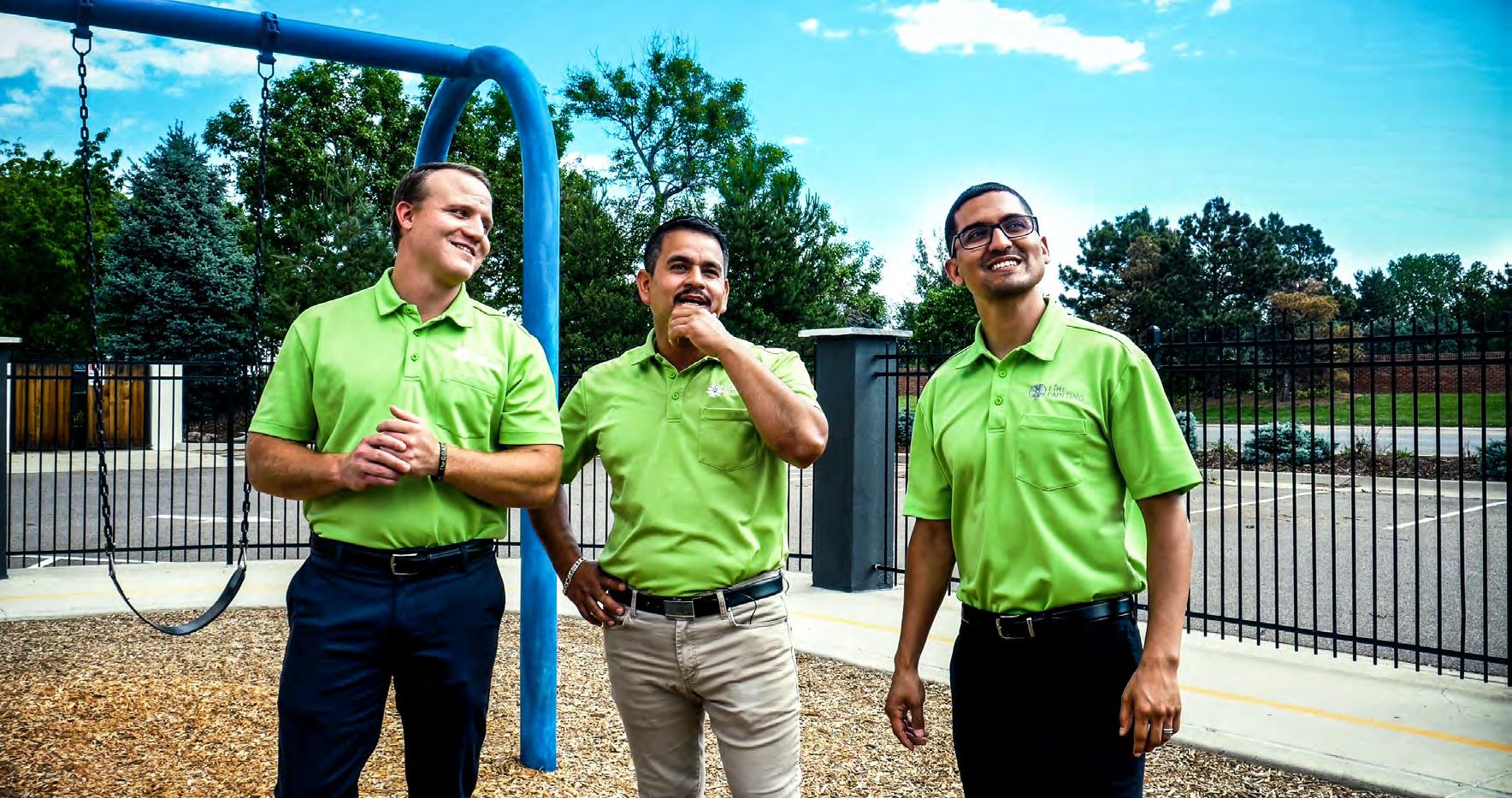







by India Franchise Council

When most people plan a vacation, they’re looking for relaxation. But for Kamil and Janet, their trip to India became something far more transformative—it redefined their relationship, reshaped their approach to wellness, and recharged their vision for AUM Bio, their emerging
holistic therapy franchise based in Chicago. Rooted in Eastern traditions and powered by modern science, AUM Bio offers energy-based therapies designed to support balance and regulation in the body. But before it became a business, it was a deeply personal passion. Their trip to India—chaotic, colorful,

and soul-stirring—gave that passion even greater purpose. I sat down with Kamil and Janet to hear all about the journey that started it all.
THE JOURNEY THAT CHANGED EVERYTHING
Q: What inspired you both to choose India as your vacation destination?
Kamil had just paid off his student loans after five years of nonstop hustle. To celebrate, he planned a dream trip through India, Thailand, and Japan—originally with a friend. But after meeting Janet, he invited her instead. Winning over her protective dad was a challenge—until Kamil offered “half a goat” as a joke. It worked. The trip was on.
Q: Was this your first time in India? What were your first impressions?
Yes! It was hot, loud, and alive. Coming from suburban Chicago, it was a total culture shock—but in the best way. Agra, Delhi, Jaipur—the Taj
Mahal was surreal. But the quiet majesty of the Lotus Temple was Kamil’s favorite.
Q: Did the energy or spirituality of India surprise you?
Absolutely. We were struck by the kindness of the people, the deep spirituality, and how tradition weaves into everyday life. There’s a heart-centered energy that stays with you.
Q: Any challenges or culture shocks?
Definitely. The heat, the spicy food, the fast pace—it was physically demanding. But every challenge became part of the growth. We came back stronger.
Q: Any locals who l eft an impression?
Kamil kept getting asked for selfies—he thought people wanted him to take their picture, but they wanted him in the picture! Janet also connected with a young guide saving up for a PlayStation. So real. So human.
Q: Most unforgettable moment?
Witnessing a full Indian wedding celebration at our hotel—so vibrant and full of joy. That, and seeing elephants walk down city streets like they owned the place.
Q: Any food discoveries? Janet is now obsessed with Chicken Tikka Masala. And Mango Lassi? Life-changing. We had it more than once... okay, more like every day.

Q: Did you try any wellness practices in India?
Yes! Yoga, meditation, and some Ayurvedic treatments. It felt like we were reconnecting with something ancient and intuitive.
Q: How did this trip connect to your work with AUM Bio? It affirmed everything. We saw that in India, healing isn’t a service—it’s a way of life. That’s exactly what we want to bring to the West through AUM Bio.
Q: Did any Ayurvedic ideas resonate?
Yes—daily routines like doshaaligned eating, breathwork, and tongue scraping. Seeing these lived practices reinforced the foundation of our therapy model.
Q: How will India influence your franchise model?
We’re designing each AUM Bio space to reflect that sacred, grounded energy. Earthy tones, subtle rituals, intentional design. A sanctuary for modern souls.
Q: Did you have any big “aha” moments about wellness? We realized wellness isn’t about escaping stress—it’s about learning to move through it. India taught us that healing is both science and spirit.
Q: How did this trip shape your bond as a couple?
Traveling together in such intense conditions helped us grow. We learned how to support each other, laugh through chaos, and trust deeply.

Q: Coming from Polish and Latin cultures, did India feel familiar or foreign?
Surprisingly familiar. The emphasis on family, faith, and tradition—it mirrored a lot of our own upbringing. It felt like a different version of home.
Q: Who adapted faster— Kamil or Janet?
Janet embraced the food first. Kamil navigated the travel grind better. We were a good team.
Q: What did you learn about each other?
That we’re adaptable, resilient, and genuinely love being in each other’s company. That kind of learning only
happens in places that push you.
Q: What’s it like building a wellness brand in a highspeed city like Chicago?
It’s rewarding but challenging. People are seeking healing, but don’t always know where to start. We meet them where they are—with patience, presence, and ancient tools.
Q: How do people respond to AUM Bio?
Most are curious at first, then grateful. They’re tired of quick fixes. Our gentle, intuitive approach resonates— especially once they experience the results.
Q: How do you teach clients about AUM’s Indian roots?
Through storytelling, design, and conversation. We honor the origins of these practices— always. AUM isn’t just a brand; it’s a legacy.
Q: How would you describe AUM Bio in one sentence?
A modern sanctuary that helps the body heal itself—using ancient wisdom, modern tools, and energy-based therapy.
Q: Did India deepen your connection to the brand? Without a doubt. It turned our mission into a movement. It made us feel responsible to preserve and share this sacred knowledge.
Q: If India were a person, how would you describe them?
Wild, wise, generous, intense, spiritual. India doesn’t just welcome you—it transforms you.
Q: What would you tell someone hesitant about going to India?
Don’t wait. Don’t overplan. Just go. You’ll come back changed.
Q: One Indian habit you still keep?
Warm lemon water and tongue scraping. Every morning. It grounds us. It’s simple. It works.
FROM JOURNEY TO FRANCHISE: AUM BIO’S AWAKENING
AUM Bio is more than a wellness franchise. It’s a living testament to what Kamil and Janet discovered in India: that well-being isn’t complicated—it’s ancient, intuitive, and already within us.
As they expand their brand across the U.S., one thing is clear: they’re not just building a business. They’re building a movement grounded in reconnection, reverence, and energetic restoration.
ABOUT THE AUTHOR
Seema Govil, a Versatile Leader: Bridging the Worlds of Franchise Consulting, Media, and Philanthropy as the Founder and CEO of Cosmo City Media. For franchising help, contact Seema at Seema@ thefranchiseconsultingcompany. com.











Focal Point Coaching & Training is a franchise organization of business coaches and trainers who work with entrepreneurs, business owners, and executives to help enhance their companies and their lives by leveraging the coaches’ business experience and our proven content.

FOCAL POINT BUSINESS COACHING FRANCHISE HIGHLIGHTS
Best-in-class training for new f ranchisees plus extensive ongoing support.
Extensive marketing support (Strong Start & QuickStart Programs).
Multiple revenue streams available to f ranchisees.
Proven processes & content developed by founder Brian Tracy , a globally known Business Growth Expert.
Flexible hours & location! Home based or work from an executive shared space.
High margin business to business opportunity and streamlined business model. No specific industry knowledge needed.

Many available territories!

Decades of huge growth potential.
Focal Point is positioned as the next generation of Business Coaching and is a clear market leader in choosing to become a Business Coach.
A seasoned business professional (generally 10-15 years experience in Management and an Executive-level position)
Self-confident with excellent c ommunication skills
Looking for a better work/life balance
with perseverance

The Elements Massage® brand is a holistic massage therapy franchise that offers personalized treatments through a variety of massage therapy modalities, following The Elements Way ®. We exist so clients feel an improved sense of health as they seek to benefit from pain relief, stress reduction and overall wellness. We are committed to The Elements Promise, which means our massage therapy will meet or exceed your expectations, or the next one is on us! Celebrating nearly 20 years of holistic wellness and therapeutic values, Elements Massage® has more than 250 franchise locations across the USA and 75 under development, nationwide.



TOTAL INITIAL INVESTMENT
$322,783 - $517,125*
TARGET MARKETS
650+ territories available! Los Angeles, Bay Area, DFW, Houston, Austin, San Diego, Tampa, Ft. Lauderdale, Jacksonville, Orlando, and more!




by Mike Martuza, Consultant, The Franchse Consulting Company

Everyone seems to be an expert in at least two things: raising your kids and running your life. Let’s add a third: owning your business. People love to give advice—often without being asked. It’s just human nature. Most people offer their opinions with the best of intentions. But that doesn’t make their advice valid. I once spoke to a man who gave up on buying a food franchise because his cousin had failed
running an independent restaurant. His cousin’s experience had nothing to do with his own opportunity— different model, different business, different situation. Still, that single opinion crushed his dream. He was ambushed, and he didn’t even know it.
This
happens all the time. People discover a franchise that excites them—something that finally seems like a real path to business ownership. But within a short time, that excitement fades. Why? They were ambushed—often by others, sometimes by themselves.
Sound silly? Think you’re too smart to fall for it? Don’t be so sure. Ambushes come in many forms—and from many directions. Here are

the most common, and how to defend yourself:
The business seeker claims, 'I've talked it over with my spouse, and they said it’s my call.' It’s all good—until that first detailed conversation about the franchise. Then objections arise, concerns emerge, and what once looked promising now seems out of reach.
SOLUTION: Business ownership is a family decision. Talk early and often. Share what you're learning. Attend meetings together when possible. The more informed both partners are, the smoother the path forward.
You may hear that you must be passionate about your product or service. But passion for the business itself is just as powerful. One successful franchisee I know runs a pet waste removal company. Passionate about scooping dog poop? Probably not. But passionate about building wealth and stability for his family? Absolutely.
SOLUTION: Passion matters— but define it clearly. If you're passionate about owning a business, growing something valuable, or achieving independence, that's more than enough.
Mention your plans, and unsolicited advice will likely follow—often from wellmeaning individuals with little relevant experience. Despite their lack of expertise, their opinions can subtly influence your thinking. Dismissing them outright may feel rude, but failing to filter them critically can lead to poor decisions.
SOLUTION: Accept that advice will come—solicited or not—but evaluate it through a lens of experience and relevance. Give real weight only to feedback from those who understand franchising or have firsthand business ownership experience. Be respectful, but protect your decision-making process from misinformed influence.
THE ENVIOUS ASSOCIATE AMBUSH
Sometimes your ambition stirs discomfort in others. A colleague may subtly discourage you—not because the opportunity is flawed, but because they fear being left behind.
SOLUTION: Stay focused on your goals. Consider advice only when it’s based on facts, not feelings or fears.
THE COLD FEET AMBUSH
Starting a business is frightening. That fear can quietly become the reason you say no. You justify backing out by focusing on perceived risks, rather than your real goals.
SOLUTION: Use fear as a tool to sharpen your research and decision-making—not as an excuse to quit. Compare opportunities carefully and stay anchored to your goals.
You hear one story—good or bad—and make a sweeping judgment. One failure does not mean the concept is flawed. One success doesn’t mean you’ll thrive.
SOLUTION: Look for patterns, not anecdotes. Speak to 15–20 franchisees. Broad data beats single stories.
Some people confuse surface-level searches with research. Googling businesses in your area or reading a few online reviews won’t tell you much about market demand, the business model, or unit economics.
SOLUTION: Use solid data. Get the Franchise Disclosure Document from the franchisor. Talk to multiple franchisees. Consult trusted online sources like IBISWorld, Franchise Times, and Statista. Gather facts, not guesses.
AMBUSH
Too much research can
become a form of avoidance. You tell yourself you're being thorough—but really, you're stalling. Research won’t eliminate all uncertainty.
SOLUTION: Create a complete research plan and follow it. Ask yourself: Do I want to own a business? Do I fit this model? Will it help me reach my goals? If the answers are yes—move forward. If not, keep looking. If you’re unsure, do more focused research. Don’t let caution drown your vision.
Going into business is about owning not just the opportunities, but also the responsibilities. One of your most important responsibilities is to do your business search in the best possible way for you. After all is said and done, remember: if you allow others to scare you away from your dream, you’ve ambushed yourself. And instead of owning your dream, you’ll be working for someone who owned theirs. Avoid the ambushes. Protect your vision. And pursue the dream.
Mike Martuza is a serial entrepreneur, lecturer and author of the best selling book "The Franchise Rules." Mike has over 40 years of business ownership, business creation, franchising, consulting, coaching and management experience. He has been helping people find great "fitting" franchises for more almost two decades. Contact Mike at mikemartuza@ thefranchiseconsultingcompany. com.


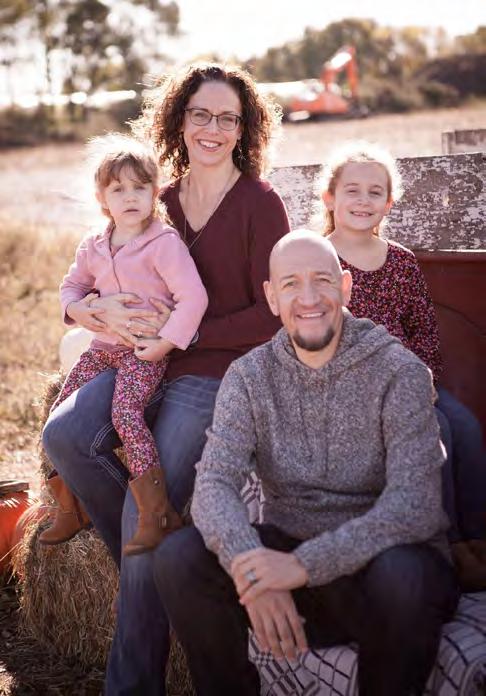

I’D FOUND A PROGRAM AND I’D FOUND THE PEOPLE THAT I NEEDED. THEY ACCEPTED ME AS I WAS. THEY TAUGHT ME, THEY ENCOURAGED ME, AND THEY KEPT ME ACCOUNTABLE.
Peter J. // 2021 $10,000 National Challenge Winner





by Chuck Barson, Consultant, The Franchse Consulting Company
For many military veterans transitioning to civilian life, the next career move usually takes the form of a job or a career. While traditional employment offers a sense of stability, it may not fully leverage the leadership, discipline, and independence veterans developed during their service. After all, with traditional employment, you work for someone else! That’s why franchise ownership is increasingly seen as a betterand more fulfilling option than a job or even a career.
Franchising offers the best of both worlds: the structure of an established business and the autonomy of being your own boss. It’s easy to understand why a franchise is often a stronger fit for veterans compared to working as an employee.
1. VETERANS ARE NATURAL LEADERS—FRANCHISING LETS THEM LEAD
In the military, service members are taught how to lead teams, make decisions under pressure, and take responsibility. In most civilian jobs, those leadership qualities may be underutilized, especially in entry- or midlevel roles.
Owning a franchise allows veterans to take full control of a business, lead a team, and make critical decisions. They’re not just following ordersthey’re building something of their own, using the same leadership skills they refined in uniform.
2. MORE CONTROL OVER YOUR CAREER AND LIFESTYLE
A typical job offers a steady paycheck but often comes with limited flexibility in schedule, work environment, and growth potential. Franchise ownership, on the other hand, allows veterans the opportunity to control their time and make business decisions that are aligned with their personal and life goals. This can be especially valuable for veterans who want to:
• Spend more time with family
• Stay connected to their local communities
• Build long-term financial independence
• Set their own pace for growth and success
With a franchise, you’re not confined to someone else’s career track - you create your own.

3. PROVEN SYSTEMS REDUCE THE RISK OF BUSINESS OWNERSHIP
Starting a business from scratch can be risky, especially without prior business experience. Franchises reduce that risk with tested business models, established brands, and ongoing support. Veterans appreciate the structure and reliability that franchises offer, such as:
• Comprehensive Training programs
• Detailed Operational manuals
• National marketing and local marketing support
• Pre-established supply chains
It’s like receiving a mission briefing before deployment - everything is planned, and your role is clear.
4. FRANCHISE OWNERSHIP BUILDS WEALTH, NOT JUST INCOME
A job provides income, but franchise ownership also builds long-term equity. As a franchisee, veterans own an asset they can grow, sell, or pass on to family members. It’s a long-term investment in
their future, not just a shortterm paycheck.
Many successful veterans have grown their businesses over time – by owning multiple units or investing in other concepts. This kind of wealthbuilding potential simply doesn’t exist in most jobs.
Finding the right franchise and then funding the business – this can be daunting to anyone! But franchising welcomes veterans with open arms. Companies like the Franchise Consulting Company offer:
• Access to hundreds of veteran-friendly brands with discounted franchise fees or reduced royalties for veterans.
• Free search assistance to help veterans find the best franchise for them and their families.
• Veteran franchise grants up to $10,000 through members of the Veterans Franchise Council. >> https://www. theveteransfranchise council.com/
In addition, many franchisors provide startup support specifically for veterans. This makes it easier for veterans to get started as business owners without unnecessary barriers.
After years of serving a purpose greater than themselves, many veterans want to continue making an impact. Franchise ownership allows them to do just that – by bringing needed businesses to their communities and providing jobs for local residents as well as other veterans
Owning a franchise gives veterans the chance to define

their own mission and see the results of their hard work every day. It’s not just a job - it’s a meaningful, purpose-driven career.
While traditional jobs may offer short-term security, they often don’t match the skills, drive, and aspirations of many veterans. Franchise ownership, on the other hand, provides independence, leadership opportunities, financial growth, and personal fulfillment— all within a proven system designed to support success.
For veterans looking to take control of their future, owning a franchise can be more than a career move - it can be a powerful second mission. For additional information on franchises for veterans, or veteran franchise grants you may contact Chuck Barson at cbarson@ TheFranchiseConsulting Company.com
Chuck Barson literally grew up in the franchise business! His father was an early adopter of the franchise model, starting with an AAMCO Transmission and later owning food franchises, including Dunkin Donuts and a Dog ‘n’ Suds (hot dogs & root beer) drive-in restaurant.
After following both the franchise and entrepreneurial paths, he clearly understands how the franchise model can be a faster, and more direct path to your success. After 30 years of successful business and franchise experience, Chuck now works with others that want to create a sustainable income and build wealth through franchising. Contact Chuck at cbarson@ thefranchiseconsultingcompany. com.

During our consultation we will discuss:
• The benefits of owning a Franchise Business Model with national
• The positive impact your location can have on your community.
• The perks of Franchise Corporate Support, additional resources, and our cutting-edge technology.
• Why now is the opportune time to open a Medical Weight Loss Franchise.
• How to get started on this Turn-Key* opportunity.

Gretchen San Miguel, MD Chief Medical Offier

The Drybar® brand is the hair-care blowout category creator and category leader, delivering more than beautiful hair in 45 minutes. It’s the experience, the happiness and the confidence women feel after a fresh dose at a Drybar shop! Celebrating 20+ years as the industry disrupter, Drybar shops aren’t traditional hair salons, it's the answer to the quest to look and feel good. It’s tagline says it best: No cuts. No color. Just blowouts. With more than 155 shops across the USA and 100+ in development nationwide, the Drybar brand has exploded into a nationally-recognized, highly sought-after franchise



Dedicated to serving the growing needs of beauty and wellness-conscious consumers, WellBiz Brands portfolio of brands offers franchise opportunities with recurring revenue membership models, tech-centered infrastructure and light-asset investments.
Explore the brand portfolio today! (WellBizBrands.com)



● Category CREATOR and Category LEADER
● Recurring Revenue Membership Model
● Appointment-Based Service
● Proprietary Process and Styles
INVESTMENT
$490,166 - $856,824*
$1,508,396* (Top 10 2022)

500+ available territories! 46 states – Ask today! Pacific Northwest, Northeast, South & Midwest 155+ Locations Worldwide! 100+ Under Development
by India Franchise Council
Indian spirituality taught us discipline. Indian food taught us connectedness. Indian cinema? It taught us how to dream — and how to turn those dreams into reality
Often dismissed as escapism, Indian films are far more than entertainment. They are modern-day epics — emotional classrooms that teach us resilience, identity, and unity. And over the past decade, a remarkable shift has occurred: the rise of panIndian cinema. No longer dominated by one language or region, Indian cinema today speaks across boundaries.
In this new cinematic landscape, five legends have reshaped not only the industry — but the collective habits, values, and vision of millions. Their stories model a new kind of success: one built on focus, humility, consistency, and cultural pride.
FIVE ICONS WHO RESHAPED CINEMA — AND CULTURAL DISCIPLINE
1. Rajinikanth – The Living Myth of Indian Cinema
Rajinikanth is not just a superstar — he is a phenomenon, a force, and a philosophy. As he enters his
50th year in entertainment, he remains India’s highest-paid actor, beloved by audiences across generations and respected by everyone from heads of state to global CEOs. Entering the film world at a time when fair-skinned actors dominated the screen, Rajinikanth carved his own path. He studied what worked for him, what didn’t, and — most importantly — what his audience needed from him. With laser-sharp focus, he repeated it with passion and reinvented it with each generation.
What inspires me most is not his stardom, but his authenticity. He speaks from the heart, uplifts more talented peers, and praises newcomers with genuine admiration. He has no appetite for gossip, no desire for showmanship, and never forgets those who helped him rise.
Habit Lesson: Discipline is more than repetition — it’s knowing your path, honoring your roots, and staying grounded in service to others.
2. S. S. Rajamouli – The Architect of the Epic
With Baahubali and RRR, Rajamouli didn’t just make

films — he built universes His storytelling evokes myth, emotion, and identity on a grand scale, capturing the imagination of a global audience.
What sets him apart is his patient obsession with quality. He spends years crafting a single film, demanding excellence from every contributor. His visionary direction proves that true scale requires deep focus and disciplined execution
Habit Lesson: Greatness isn’t rushed. It’s designed, refined, and delivered with conviction.
THIS IS MORE THAN STARDOM.
IT’S A UNIFYING CULTURAL RHYTHM, WHERE REGIONAL PRIDE AND NATIONAL IDENTITY NO LONGER COMPETE — THEY COEXIST AND CONVERGE.
3. Prabhas – The Reluctant Leader Who Chose Focus Prabhas captured the nation’s heart with Baahubali, but his success was years in the making. He turned down dozens of film offers to focus entirely on the franchise — a rare act of long-term thinking in an industry built on momentum.
Quiet, reserved, and deeply dedicated, Prabhas shows that real leadership doesn’t always shout. It listens, commits, and follows through with loyalty and grace.
Habit Lesson: Focus is a form of discipline — the courage to say no to anything that dilutes your mission.
4. Allu Arjun – The Stylish Craftsman with Substance Pushpa wasn’t just a blockbuster — it was a cultural reset. With his signature swagger and raw emotionality, Allu Arjun captured hearts across demographics. But behind that on-screen energy is a relentless commitment to craft.
From dance to dialogue, he fine-tunes every detail. His rise proves that style, when backed by preparation, becomes enduring substance.
Habit Lesson: Charisma alone fades. Charisma with consistency creates icons.
5. Yash – The Dreamer Who Built an Empire Yash’s journey with KGF is the blueprint for modern ambition. Hailing from modest roots, he believed Kannada cinema could lead the nation
— and then willed it into reality. His discipline showed up in the unseen hours: teambuilding, strategy, and brand development.
Yash didn’t just deliver a film — he delivered belief to a generation that dreams big but doubts often.
Habit Lesson: Dreaming is free. Delivering takes structure, stamina, and service.
These five icons didn’t just find success — they redrew the map of Indian cinema. Today, a dubbed Telugu film plays to packed houses in Hindi-speaking belts. A Tamil blockbuster gets dubbed in Japan, making Japanese fans speak Tamil — a regional Indian language. A Tamil icon like Rajinikanth unites audiences from South India to Gujarat to Singapore, to Japan, to the U.S.
This is more than stardom. It’s a unifying cultural rhythm, where regional pride and national identity no longer compete — they coexist and converge.
In a chaotic world seeking inspiration, peace, and acceptance, Indian cinema has quietly been offering all three. These stars — and the stories they bring to life — remind us that:
• Success takes time.
• Popularity doesn’t fade when it’s built on purpose — it grows, spreads, and deepens.
• Discipline isn’t about being rigid — it’s about being anchored
• And storytelling — when done with heart — builds more than fans. It builds values
As an entrepreneur and a seeker, I’ve drawn immense inspiration from these legends. Their success may look impossible, but their journey is grounded in truth, consistency, and service. And in that, they give us not just films to watch — but lives to learn from
K G LeRoy is a purpose-driven serial entrepreneur and seasoned data and technology leader with over 25 years of experience across some of the world’s most respected organizations — including Tata Consultancy Services, Merrill Lynch, the Federal Reserve Bank of New York, and Deloitte Consulting. An MBA graduate of the prestigious NYU Stern School of Business, K G has built an illustrious career in both the corporate and entrepreneurial arenas — leading high-impact teams, delivering strategic transformations, and cultivating trusted relationships across a vast network of professionals from all walks of life. In parallel with his professional success, K G has undergone a profound personal transformation — evolving into a spiritual and business leader with a higher mission: To help individuals and families transform their lives through purposedriven collaboration and financial professional, real estate, and franchise services, starting with their own. He is now dedicated to enabling others to align with their inner calling or reconnect with long-lost dreams, create meaningful income streams, and co-build a caring and prosperous world for all. Many others with a similar purpose are now joining him on this journey to fulfill his higher mission. Contact K G LeRoy at kg@ thefranchiseconsultingcompany. com.










As the only irrigation franchise with a focus on water conservation, Conserva Irrigation is transforming the $7.1 billion irrigation industry. Featured in the Inc. 5000 FastestGrowing Companies list for two years in a row, the Conserva Irrigation franchise is a thriving business model that provides rapid client acquisition, reoccurring revenue streams, and scalable growth opportunities. Ready to gain professional and financial freedom with one the fastest growing eco-friendly franchises? Consider a future with Conserva Irrigation.
• Low Initial Investment
• Reoccurring Revenue Streams
• Award-winning, Eco-Friendly Franchise
by India Franchise Council
The story of Aruna Miller, Maryland's current Lieutenant Governor, is a powerful testament to the American dream, intertwined with her rich Indian heritage. Her journey, from a young immigrant arriving in the United States to becoming the first South Asian woman and immigrant elected to statewide office in Maryland, is an inspiring narrative of growth, resilience, and unwavering commitment to public service, resonating deeply with both Indian and American audiences.
Born Aruna Katragadda on November 6, 1964, in Andhra Pradesh, India, Aruna Miller immigrated to the U.S. at the age of seven. This early experience profoundly shaped her perspective, instilling in her a unique understanding of the challenges and opportunities faced by immigrant communities. She pursued a Bachelor of Science in Civil Engineering from the Missouri University
of Science and Technology, a field often dominated by men, showcasing her determination to excel and break traditional molds.
Her career in public service began as a civil and transportation engineer for Montgomery County's Department of Transportation, where she dedicated 25 years to improving public safety and accessibility. This practical experience on the ground provided her with invaluable insights into the daily lives of Marylanders, shaping her future policy priorities.
Miller's political ascent began in 2010 when she was elected to the Maryland House of Delegates, representing District 15. For eight years, she championed legislation focused on investing in STEM education, streamlining regulations for small businesses, and advocating for working families and environmental protection. Her work in the House laid the groundwork for her future
statewide role, demonstrating her ability to navigate complex legislative processes and deliver tangible results for her constituents.
Her most significant leap came in 2022 when she was chosen as the running mate for then-gubernatorial candidate Wes Moore. Their historic ticket secured a landslide victory, propelling Miller into the Lieutenant Governor's office. This achievement marked a pivotal moment, not only for Maryland but for the nation, as she became the first South Asian woman and first immigrant to hold such a high-ranking statewide position in the U.S. Her swearing-in on the Bhagavad Gita underscored her pride in her cultural roots while embracing her American identity.
As Lieutenant Governor, Miller has continued to champion policies that foster growth and opportunity for all Marylanders. Her portfolio LIEUTENANT GOVERNOR MILLER'S POLITICAL WORK IS DEEPLY ROOTED

includes critical areas such as transportation, mental health, and STEM equity, leveraging her engineering background to position Maryland as a hub for innovation. She serves as chair of the Governor's Work Zone Safety Work Group, dedicated to making highway work zones safer. She also leads Maryland's first Council on Interfaith Outreach,
fostering understanding and bridging divides across diverse faith communities.
Beyond these specific roles, Lieutenant Governor Miller's political work is deeply rooted in the Moore-Miller administration's vision of a Maryland where no one is left behind. She actively strives to advance Maryland's STEM workforce, expanding
STEM equity to ensure all Marylanders, especially women and minorities, have access to opportunities in growing fields. Drawing on her extensive experience, she is focused on improving transportation and infrastructure, aiming to modernize Maryland's systems for enhanced safety and equitable access. Confronting mental health and addiction challenges is another core priority, as she advocates for increased access to services and comprehensive support. Miller is also a vocal proponent for supporting small, minority, and womenowned businesses, working to ensure they have the tools and opportunities to thrive. Furthermore, she actively promotes an environment of innovation, fostering collaboration to position Maryland as a national leader in emerging technologies like Artificial Intelligence.
Aruna Miller's remarkable journey is a beacon of hope and a powerful illustration of how diverse backgrounds strengthen the fabric of American democracy. For the Indian diaspora, she embodies the boundless potential of their community in the U.S., proving that cultural heritage and immigrant experiences are assets that contribute to the nation's progress. For all Americans, her story is a reminder that dedication, hard work, and a commitment to public service can lead to unprecedented achievements, shaping a more inclusive and prosperous future for everyone.







The Plunge House® Difference
The first franchise exclusively focused on contrast therapy for physical recovery and mental wellness
Science backed modalities of contrast hydro-therapy that improves recovery, reduces inflammation, boosts mental wellness
Membership, retail, and event revenue opportunities
Community centric, driving sticky member retention
The Plunge House® Opportunity
First mover advantage | Wide open territory
Recurring revenue, fixed cost, low staffing
Seasoned franchisor leadership team




1,100% increase in mold-related insurance claims over the past decade.
5 million Americans experience a water damage emergency yearly.
365,000 households report a fire loss yearly.
Source: The Insurance Information Institute


Restorable



by India Franchise Council
The Bhutanese American story is complex, powerful, and underrepresented. It includes two distinct groups, both shaped by very different paths of migration — yet both working to build stability and opportunity in the United States.
• On one side: ~85,000 Nepali-speaking Bhutanese refugees, resettled through one of the largest U.S. refugee programs since the Vietnam War.
• On the other: ~14,000 Bhutanese immigrants, who identify as “Bhutanese alone” in Census surveys, typically arriving through education, employment, or family visas.
Both communities share heritage from Bhutan — yet face different economic, linguistic, and generational challenges. This article breaks down their profiles side by side, illuminating the need for tailored outreach and opportunity.

Arrival Type
Ethnic Identity
Nepali-Bhutanese Refugees (85,000)
Refugee resettlement (2008–2015)
Lhotshampa (ethnic Nepali from Bhutan)
Bhutanese Immigrants (14,000)
Skilled, family, or student immigration
Ethnic Bhutanese (Sharchop, Ngalop, etc.)
Primary Language Nepali, English (2nd gen) Dzongkha, English
English Proficiency (5+) ~50% ~85%
Self-Identification (Census)
Often identify as Nepalese or mixed origin
Population Geography Ohio, Pennsylvania, Georgia, New York
Identify as Bhutanese alone
California, New York, Virginia
Median Age ~24 years (very young) ~36 years
Median Household Income ~$49,000 ~$94,000
Educational Attainment (BA+) ~18% (due to refugee background) 51%
Homeownership Rate ~42% ~64%
Top Industries Warehousing, cleaning, delivery, healthcare Healthcare, education, business
Citizenship Status 80–90% naturalized
Majority naturalized or green card holders
THE COUNTRY, I BELIEVE THE NEXT CHAPTER FOR THIS COMMUNITY LIES IN OWNERSHIP — OF BUSINESSES, OF HOMES, AND OF LEGACY.
1. Population Data Explained
While 85,000 Nepalispeaking Bhutanese refugees were resettled in the U.S. since 2008, only ~14,000 individuals currently identify as “Bhutanese alone” in the U.S. Census. Many refugees, due to cultural affinity and community networks, now identify as Nepalese Americans — explaining the lower Bhutanese-alone figure.
Important distinction: The Bhutanese-origin population in the U.S. is significantly undercounted if you only rely on “Bhutanese-alone” data.
2. Different Paths, Shared Barriers
Refugees often arrive with:
• Limited formal education
• Language barriers
• Trauma and healthcare needs
• Low initial income
In contrast, Bhutanese immigrants tend to be:
• College educated
• Middle-income earners
• Fluent in English
• Professionally oriented
Yet both groups require support:
• For economic mobility
• For franchise and business ownership
• For homeownership and succession planning
3. Entrepreneurship & Opportunity
Both groups are showing growing interest in:
• Small business ownership (restaurants, trucking, convenience stores)
• Franchise entry points (cleaning services, food service, non-emergency medical transport)
• Youth-led tech and service ventures
However, NepaliBhutanese refugees often face:
• Capital access barriers
• Credit history limitations
• Lack of mentorship
That’s where targeted education, lending programs, and franchise coaching can change the game.
The Bhutanese American story is one of resilience, adaptation, and quiet achievement
Whether arriving through humanitarian pathways or as professional immigrants, both groups have demonstrated a strong commitment to education, work ethic, and community building.
As a consultant working with immigrant entrepreneurs across the country, I believe the next chapter for this community lies in ownership — of businesses, of homes, and of legacy.
Let’s create pathways that meet each group where they are — and support them in becoming leaders, job creators, and franchise founders in America’s economic future.
Jack Tiwari is a seasoned business consultant, community leader, and cultural advocate. With a deep understanding of the franchise industry, he helps entrepreneurs achieve success in franchise sales and acquisitions, business development, and social impact. Contact Jack at jack@ thefranchiseconsultingcompany. com.




Clean Eatz has a lower investment cost than most fast casual concepts.

Stores can be run with great labor percentages.
At the heart of t he restaurant / mea l plan model s tir s an unwavering p ass ion to help individuals
and families cha nge their lives. Through providing better nutrition o ptio ns, a steady do se of
h ealth and wellnes s education – as well as a diverse sup port community – C le an Eatz
c o ntinues to gain f ans around the n at ion. In fact, our fo otprint curren tly c onsists of mor e than
80 cafes in dozens o f states… and another 100 lo ca tions in the pipelin e!


Clean Eatz operates in smaller spaces than most fast casual concepts.


Clean Eatz offers flexible hours for franchisees, with most cafes closing at 7pm.

Our menu is streamlined and easy for anyone to reproduce whether you have food service experience or not!

FIVE to be exact! These include our café menu, Grab ‘N’ Go options, weekly meal plans, Marketplace products, and catering.
We continue to get praise and coverage, from a devoted online social media fanbase to high-profile publicity outlets!

by Bhavana Taneja, India Franchise Council
Indian fashion has long been a reflection of the country's rich cultural tapestry, blending history, regional diversity, and craftsmanship. From intricately woven Banarasi saris to the mirror work of Kutch, India’s fashion heritage is deep and diverse. But in recent years, this heritage has made a confident leap from tradition to trendsetting, from local to global.
The sari, one of the oldest garments still in contemporary use, has transcended its traditional role. While Indian women have worn saris for centuries, this six to nine yards of elegance has recently become a canvas for reinvention. Designers like Sabyasachi Mukherjee, Raw Mango, and Anita Dongre are reinterpreting saris with modern cuts, bold prints, and luxe fabrics.
Global celebrities including Oprah Winfrey, Gigi Hadid, and Beyoncé have donned saris and lehengas, elevating these garments onto international red carpets. Younger generations are also embracing the sari in unconventional ways, teamed with crop tops,
belts, or sneakers, showing its adaptability as a modern, global fashion statement.
Indian fashion designers have gained prominence on the world stage. At Paris, Milan, and New York Fashion Weeks, names like Rahul Mishra, Falguni Shane Peacock, and Naeem Khan are making waves with collections that balance traditional embroidery with global silhouettes. Their designs draw on ancient techniques such as zardozi, chikankari, and bandhani, once the preserve of royal ateliers, now dazzling a global audience.
Indian inspired collections by international labels like Chanel, Dior, and Hermès further underscore the global fascination with India’s textile traditions. Dior’s Fall 2023 show in Mumbai, staged in front of the historic Gateway of India, was a landmark moment celebrating Indian craftsmanship on a global fashion stage.
India’s emphasis on handloom, slow fashion, and eco-conscious textiles aligns with the global shift toward sustainability. Fashion-conscious consumers are increasingly drawn to Indian
fabrics like khadi, cotton, silk, and jute, not just for their beauty but for their low carbon footprint and ethical production.

Fashion initiatives like Fashion Revolution India and the Handloom Project are helping artisans reach international markets, preserving traditional techniques while providing sustainable livelihoods. These efforts also highlight how Indian fashion is not just about aesthetic appeal, it’s about values and legacy.
The international popularity of the Indian Film Industry has played a vital role in exporting Indian fashion. Whether it’s Deepika Padukone in Cannes, Priyanka Chopra Jonas on Met Gala steps, or Alia Bhatt as the face of Gucci, Indian celebrities are cultural
THE SARI, ONE OF THE OLDEST GARMENTS STILL IN CONTEMPORARY USE, HAS TRANSCENDED ITS TRADITIONAL ROLE.
ambassadors showcasing the beauty of Indian design.
Costume designers from the Indian Film Industry often set the tone for wedding fashion worldwide. Elaborate bridal lehengas, sherwanis, and jewelry seen in Indian films are now part of global South Asian weddings and even adopted by non-Indian fashion enthusiasts.
As Indian fashion rises in visibility, there is growing concern over cultural appropriation versus appreciation. Several global brands have adopted Indian design elements, from mirror work and sequins to Kolhapuri chappals and paisley motifs, without proper credit to their cultural origins. Kolhapuri sandals were recently seen in luxury fashion lines, and traditional Indian sequin embroidery has adorned global runways, often with no reference to its source.
This raises important questions about acknowledgment, representation, and equity. As Indian craftsmanship influences global trends, it is vital that the artisans and cultures behind these aesthetics are recognized and respected. Acknowledging the roots of Indian fashion not only honors its heritage but ensures the sustainability of the communities keeping these traditions alive.
As we celebrate India Heritage

Month, Indian fashion reminds us that cultural pride and global relevance are not mutually exclusive. From handmade weaves to highstreet collaborations, India’s influence is seen in the way the world dresses, shops, and defines beauty.
The rise of Indian fashion on
the global stage is not just about glamour, it’s about honoring generations of craftsmanship, redefining identity, and creating space for inclusive, bold, and expressive style. Whether in a sari or streetwear, Indian fashion is not following trends, it’s setting them.
Bhavana Taneja is a franchise consultant who helps aspiring entrepreneurs navigate the complex world of franchising through strategic guidance tailored to their goals and strengths. With over a decade of experience in business development and client engagement, she is passionate about empowering individuals to make confident, informed decisions that lead to sustainable business ownership. Contact Bhavana at bhavana@ thefranchiseconsultingcompany.com.

City Wide is an award-winning, recession-resistant, essential business. There’s no better time to make City Wide your first choice


P E R F O R M I N G A R T S A N D A C A
E M
C S A R E I N O U R D N A
OWN A PRESCHOOL FRANCHISE THAT IS RECESSION RESILIENT AND PANDEMIC PROVEN
MATURE SCHOOL AVERAGES, 2021
AUV: $989,347
EBIDTA: $305,627
EBIDTA MARGIN: 28.21%
Close to double industry average margins

Now is the Best time in the past two decades to open a Building Kidz preschool.
7 out 10 homes with children have both parents working
Our nation is supply constrained and we offer the most flexible business model in the industry
Commercial lease rates have not reached pre-pandemic levels nationally


by India Franchise Council

Manjit Minhas, a Canadian entrepreneur of Indian origin, has become a household name through her dynamic presence on CBC’s *Dragons’ Den*, Canada’s version of *Shark Tank*. But her journey to becoming one of North America’s most successful businesswomen is a story of grit, vision, and family-rooted values.
Born and raised in Calgary, Alberta, Manjit comes from
a Sikh Dogra family that immigrated from India. Her father, an engineer, and her mother, a homemaker turned businesswoman, instilled in her the values of hard work, adaptability, and financial prudence. Initially pursuing petroleum engineering at the University of Calgary, Manjit made a bold pivot toward entrepreneurship, a decision that would redefine her future.
Manjit’s business journey began at the age of 19 when she sold her Toyota RAV4 for $10,000 to fund her first venture. Alongside her brother, Ravinder, she started importing private-label spirits for their parents’ chain of liquor stores in Alberta. This hands-on exposure to retail operations and customer behavior laid the groundwork for their deeper dive into the beverage industry. Her parents played a pivotal role—not just by providing a platform but by modeling entrepreneurial resilience. After her father was laid off during an economic downturn, he and her mother built one of Alberta’s most successful liquor store
chains. Manjit and Ravinder grew up watching business decisions unfold at the dinner table, absorbing lessons in branding, finance, and negotiation.

In 2002, the siblings expanded into beer, launching Mountain Crest Lager. By 2006, they acquired the historic Joseph Huber Brewing Company in Wisconsin, the secondoldest brewery in the U.S., and renamed it Minhas Craft Brewery. This move made them the youngest brewery owners in the world at the time.
Today, Minhas Breweries & Distillery is a global powerhouse:
• Minhas Craft Brewery (Wisconsin)
• Minhas Micro Brewery (Calgary)
• Minhas Distillery and Minhas Winery
• Minhas Kitchen, which produces ready-to-drink beverages and culinary products
Their portfolio includes over 90 brands of beer, spirits,
liqueurs, and wines sold across Canada, the U.S., and 16 other countries. Products are stocked by major retailers like Costco, Trader Joe’s, Tesco, and Walgreens.
In 2015, Manjit joined “Dragons’ Den’, bringing her sharp business acumen and no-nonsense approach to the screen. Over the years, she has invested in dozens of startups across industries—from tech and fashion to food and sustainability. Her presence on the show has not only elevated her personal brand but also inspired countless women entrepreneurs to pursue their dreams.
She also co-owns “Spotlight TV and Film Production”, which creates documentaries and lifestyle content for platforms like Amazon, CBC, and Telus.


In 2024, Manjit became the first woman owner of a Canadian Elite Basketball League (CEBL) team, the Edmonton Stingers. This move reflects her growing interest in sports entrepreneurship and community engagement.
Manjit’s future vision is rooted in sustainability, empowerment, and innovation:
• She’s committed to reducing environmental impact through ecofriendly packaging and production methods.
• She champions women in business, frequently mentoring and speaking at global forums.
• Her philanthropic efforts include co-chairing a $60 million United Way campaign and funding an engineering school for girls in India.
She also serves on the boards of Enbridge, ATB Financial, and the Calgary Airport Authority, influencing policy and strategy at the highest levels.
Manjit Minhas’s journey— from a liquor store clerk to a multimillion-dollar mogul—is a testament to the power of resilience, family values, and fearless ambition. Her story is not just about brewing beer; it’s about brewing change, opportunity, and inspiration for generations to come.
With two decades of leadership in business development and management, Jatinder Taneja brings a powerful blend of entrepreneurial insight and strategic expertise to help individuals achieve success through franchise ownership. As a trusted consultant and coach, he delivers personalized guidance that aligns each candidate with the right opportunity, tailored to their goals, strengths, and lifestyle.

R E A D Y T O
D O M I N A T E
Y O U R P A R T O F A $ 2 2 0 B I L L I O N I N D U S T R Y ?

A d v a n t a g e s o f O u r F r a n c h i s e
W h y J o i n N E S T P r o t e c t i o n P l a n ® ?

G r o w W i t h U s
W e h a v e a p r o v e n s u c c e s s s y s t e m
B y p r o v i d i n g o n g o i n g t r a i n i n g ,
c o a c h i n g , a n d o p e r a t i o n a l s u p p o r t
i n a r e a s t h a t a r e c r i t i c a l t o e a c h
l o c a t i o n ’ s s u c c e s s , w e g u a r a n t e e
y o u w i l l h i t t h e g r o u n d r u n n i n g !

M a r k e t i n g S u p p o r t
W e c o o r d i n a t e d e v e l o p m e n t o f a d v e r t i s i n g m a t e r i a l s a n d s t r a t e g i e s , a l o n g w i t h c o n s u m e r m a r k e t i n g
p l a n s a n d m a t e r i a l s t o p r o v i d e
c o m p l e t e m a r k e t i n g s u p p o r t t o a l l o u r f r a n c h i s e l o c a t i o n s F r o m i n i t i a l
l a u n c h t o a d v e r t i s i n g a n d m a r k e t i n g , w e a r e a l w a y s t h e r e t o g u i d e a n d
s u p p o r t y o u


B r a n d R e c o g n i t i o n

O u r b r a n d h a s b e e n b u i l t o n a t r u s t e d , s t r o n g f o u n d a t i o n a n d w e ’ r e n o w s e e k i n g c a n d i d a t e s f o r t h i s o n e - o f - a - k i n d b u s i n e s s o f f e r i n g ! W i t h e x c e l l e n c e a n d i n t e g r i t y , w e w a n t t o m a k e a l l h o m e s h e a l t h i e r a n d h a p p i e r f o r a l i f e t i m e R E E A P

C o m p r e h e n s i v e T r a i n i n g
W e p r o v i d e c o m p r e h e n s i v e , u n m a t c h e d c o a c h i n g a n d t r a i n i n g t o e n s u r e a l l o u r f r a n c h i s e l o c a t i o n s h i t
a g r a n d s l a m . F r o m t h e i n i t i a l t r a i n i n g w e e k a t o u r N E S T P r o t e c t i o n
O u r “ R e a l E s t a t e E n v i r o n m e n t a l
A w a r e n e s s P r o g r a m ” c r e a t e d f o r r e a l t o r s , b y r e a l t o r s , i s a C E p r o g r a m
t a u g h t t o r e a l t o r s a c r o s s t h e U S o n t h e i m p o r t a n c e o f p r o p e r l y a d d r e s s i n g i n d o o r e n v i r o n m e n t a l i s s u e s O u r e x c l u s i v e a b i l i t y t h r o u g h t h i s a w a r e n e s s p r o g r a m g i v e s u s a s t r o n g p a r t n e r s h i p f o r h e l p i n g b u i l d i n g s s t a y h e a l t h y

P l a n t r a i n i n g c e n t e r , t o o u r o n s i t e v i s i t s t o y o u r l o c a t i o n , w e d o n ’ t r e s t u n t i l e a c h p a r t n e r r e a c h e s s u c c e s s ! B u i l t - i n C u s t o m e r B a s e
W e l e a d f r o m e x p e r i e n c e a n d o u r s t a f f , t e c h n o l o g y , a n d m a r k e t i n g h a s c o n t i n u e d t o b e a d r i v i n g f o r c e b e h i n d o u r w i d e l y b u i l t - i n c u s t o m e r b a s e W h e n y o u j o i n u s y o u b e n e f i t f r o m r a p i d g r o w t h a n d e x c l u s i v e r e a l e s t a t e r e l a t i o n s h i p s !
by India Franchise Council

When I visited the restaurant Bungalow with my family, I expected a great meal—but what we experienced was something far deeper. From the moment we stepped
inside, we were enveloped in the soft fragrance of incense and marigold, the warmth of curated lighting, and the quiet hum of reverence in the air. It wasn’t just dinner—it was a journey through memory, culture, and emotion. What touched us most was seeing Chef Vikas Khanna himself—humble, kind, and present—serving dishes with his own hands, many of them rooted in his beloved grandmother’s recipes. Every plate told a story. Every flavor held a memory. And every corner of the space—from the artwork to the utensils— whispered a piece of India’s rich soul.
And as I learned, this isn’t just his project—it’s his sister Radha’s dream that he is living, honoring her spirit with each ritual, each recipe, and each story. That made the experience all the more profound.
In a quiet corner of New York City, there’s a place that doesn’t just serve food—it serves

memory, ritual, and reverence. That place is Bungalow. And at its heart stands Vikas Khanna—Michelin-starred chef, filmmaker, humanitarian, and above all, a humble storyteller of India.
Bungalow is not a restaurant. It is a sacred space.
A living, breathing tribute to India’s soul—crafted with devotion and detail.
Every marigold petal, every lit incense stick, every dish kissed with heritage—nothing is by chance. Vikas has poured his heart, discipline, and poetry into Bungalow. From saffronlaced ladoos to cold coffee mousse inspired by rangolis, every element is steeped in personal memory, mythology, and artistry.
BUNGALOW IS NOT A RESTAURANT. IT IS A SACRED SPACE. A LIVING, BREATHING TRIBUTE TO INDIA’S SOUL— CRAFTED WITH DEVOTION AND DETAIL.

“I don’t want to just serve food,” he says. “I want to serve stories.”
And he does. Each morning begins with 8 drops of holy Mother Ganges water at the threshold. Each tasting menu is a soulful journey through forgotten lanes of Banaras, Amritsar, and Chettinad.
Bungalow is Vikas’s India—the
one he was raised in, the one he carries with him, the one he’s quietly reintroducing to the world.
This is why he rarely steps away from it.
“Bungalow is my calling,” he says. “Not a job. A sacred offering.”
But when he does step out— like in his upcoming, once-in-

a-lifetime workshop inspired by a conversation with Mrs. Nita Ambani—it becomes a moment of national pride. Because Vikas Khanna isn’t just plating dishes. He’s preserving traditions. He’s building legacies. He’s placing India on the global map— with humility, grace, and unmatched precision.
Vikas Khanna doesn’t just cook. He remembers.
And through Bungalow, he makes sure we remember too.
Seema Govil, a Versatile Leader: Bridging the Worlds of Franchise Consulting, Media, and Philanthropy as the Founder and CEO of Cosmo City Media. For franchising help, contact Seema at Seema@ thefranchiseconsultingcompany. com.




by India Franchise Council
Nestled in the heart of Silicon Valley, Sourov and Tuli are not just adding another childfriendly activity to the region—they’re pioneering a powerful movement to inspire the next generation of innovators. As parents, statisticians, and now franchisees of Club SciKidz, this dynamic duo brings both technical expertise and heartfelt passion to their venture.
Before launching their franchise, Tuli held a PhD in Statistics while Sourov earned a master's in the same discipline—a powerful combination of analytical rigor and quantitative depth. Sourov spent over 20 years shaping data science, ML, and AI solutions at leading global companies. Similarly, Tuli spent 15 years advancing medical science at a major clinical research organization that supported countless clinical breakthroughs. Together, their careers gave them a front-row seat to technology’s power. But amidst all the algorithms and data, one truth stood out: shaping future problem-solvers begins in childhood. Sourov explains, “We always dreamed of
doing something purposeful for the next generation, combining our love for science with giving back to the community that has given us so much.”
They saw Club SciKidz not just as a business, but as a platform to root knowledge, build confidence, and prepare blooming minds to drive innovations in the future. “Beyond corporate milestones, we always felt a calling to do something meaningful. We wanted to build something that would outlast corporate titles, a venture that touches lives and sparks future innovators”, says Sourov.
For Sourov and Tuli, it’s more than business— it’s mission. They champion equity in STEM, spotlighting the urgent need to diversify the pipeline: more girls, more under-represented voices in engineering and data science. Their

goal is to make every STEM topic, from coding, physics, chemistry, robotics, to medical science, engaging and accessible for every child, breaking barriers, and inspiring young minds to

dream big. They believe children thrive when curiosity is cultivated early, and their offering reflects that: week-long science camps featuring robotics, coding, virtual reality, forensic science, astronomy, and more—all hands-on, all aligned with academic standards.
“We love seeing parents trust us year after year, sharing how their kids feel safe, valued, and excited to return. The joy on kids’ faces and the confidence they gain are priceless. It’s rewarding to run a business that stays true to our values, embraces inclusivity, and reflects that in our reviews — even if that sometimes means choosing impact over profit”, says Tuli. Club SciKidz, founded in 1997 by educators Bob and Sue Hagan, began as a single summer science camp. It is a low-overhead, home-based model—with camps hosted at schools, community centers, churches—that makes STEM entrepreneurship accessible. Being part of this franchise gave Sourov and Tuli a strong foundation with structure and proven ideas.
Owning a business also comes with its challenges. It means wearing many hats — “you need an eye for detail and a mindset that leaves no stone unturned. There’s always the unexpected, so we try to embrace setbacks as part of growth”, says Sourov.
Their advice to aspiring entrepreneurs – “Choose a purpose that truly lights you up, not just a product or service. Surround yourself with people who believe in your dream. Expect the unexpected and be ready to learn from every setback. Always keep your community at the heart of what you do. Remember: real impact creates the most rewarding legacy.”
In Silicon Valley—the land of start-ups and unicorns—Sourov and Tuli's Club SciKidz franchise blends entrepreneurial spirit with educational impact. As their camps unfold, each build-a-robot session and coding challenge does more than spark curiosity: it nurtures critical thinkers and future problem-solvers. And with every small success—a code that runs, a rocket that

launches, a student’s eyes lighting up—they reinforce something profound: today’s playful curiosity can become tomorrow’s groundbreaking discovery.
Sourov and Tuli aren’t just running a franchise—they’re empowering futures. And in a place defined by forward thinking, that mission has only just begun.
Kapil Manocha is a multi-unit franchise owner, a leading franchise coach, a public speaker, and an author. Drawing on years of experience Kapil has helped hundreds of people gain personal and financial independence through franchising. Contact Kapil at kapil@ thefranchiseconsultingcompany.com.















by India Franchise Council
As a business consultant working with first-generation immigrants and new American entrepreneurs, I’ve seen the tremendous contributions of the Pakistani American community across the United States. Rooted in family, faith, and an entrepreneurial spirit, Pakistani Americans are quietly shaping the professional, economic, and social fabric of the country.
According to the latest U.S. Census Bureau estimates and Pew Research Center analysis, approximately 624,000 people in the U.S. identified as Pakistani in 2023, making them the 7thlargest Asian origin group in the country. This community represents about 2.8% of the Asian American population
Below, I explore key demographic, economic, and cultural trends within the Pakistani American community — comparing them with Asian American and U.S. national averages to put their progress in perspective.
POPULATION AND IMMIGRATION
• 624,000 Pakistani Americans in 2023 (up from ~500,000 in 2015)
• 65% are foreign-born (immigrants), compared to:
- Asian Americans: 66%
- U.S. overall: 14%
• 55% of Pakistani immigrants have lived in the U.S. for more than 10 years
• 53% are naturalized U.S. citizens
Takeaway: Pakistani Americans are a wellestablished and growing immigrant community, balancing roots in Pakistan with long-term integration in the U.S.
GEOGRAPHIC DISTRIBUTION
TOP STATES WITH PAKISTANI POPULATIONS:
• Texas: ~100,000
• New York: ~75,000
• Illinois: ~70,000
• California: ~65,000
• New Jersey: ~50,000
Major metropolitan areas:
• New York–New Jersey
• Chicago

• Houston
• Dallas–Fort Worth
• Los Angeles
Takeaway: Pakistani Americans are highly concentrated in major urban areas, with growing visibility in business, medicine, academia, and real estate.
AGE & FAMILY DEMOGRAPHICS
• Median age: ~33 years
- vs. Asian Americans: 34.7
- vs. U.S. overall: 38.9
• Nearly 30% of Pakistani Americans are under age 18
• Strong emphasis on multigenerational households and family-based immigration
Takeaway: A young, familyoriented population structure positions Pakistani Americans for long-term community building and leadership development.
LANGUAGE & ENGLISH PROFICIENCY
• Urdu is the most spoken language at home, followed by Punjabi and English
• English Proficiency (age 5+):
- Pakistani Americans: ~70%
- Asian Americans: 74%
- U.S. overall: 91%
Takeaway: Language fluency is above average for new immigrant groups and continues to improve, especially among younger generations.
• 60% of Pakistani Americans (age 25+) hold a bachelor’s degree or higher
- vs. Asian Americans: 56%
- vs. U.S. overall: 38%
• High concentration of professionals in:
• Healthcare
• Engineering
• Business & Finance
• Academia
Takeaway: Education is a cornerstone of upward mobility for Pakistani Americans, helping them overperform in competitive job markets.
Median Household Income (2023):
• Pakistani: $96,000
• Asian Americans: $105,600
• U.S. overall: $79,200
Median Personal Earnings (16+):
• Pakistani: $47,000
• Asian Americans: $52,400
• U.S. overall: $44,200
Poverty Rate:
• Pakistani Americans: 12%
• Asian Americans: 10%
• U.S. overall: 11%
Takeaway: While household income is strong, individual earnings show a modest gap — likely due to high student populations and dual-earner households.
Homeownership Rate: 56%
• vs. Asian Americans: 62%
• vs. U.S. overall: 66%
Pakistani Americans are twice as likely to be self-employed compared to the general population, with growing presence in:
• Retail franchises
• Gas stations
• Medical practices
• IT consulting firms
• Real estate ventures
Takeaway: Small business and self-employment are central to the Pakistani American economic story — an area ripe for more support, financing, and franchise guidance.
Marriage Rate: ~64%
• vs. Asian Americans: 58%
• vs. U.S. overall: 48% Fertility Rate (women 15–44): 7%
• vs. Asian Americans: 5%
• vs. U.S. overall: 6%
Takeaway: A strong commitment to family values, marriage, and cultural preservation defines much of the community’s social structure.
The Pakistani American community continues to grow as a vital contributor to the American landscape — in business, healthcare, education, and civic engagement. With aboveaverage educational attainment and a robust entrepreneurial foundation, this group is positioned for continued success.
Yet challenges remain: income disparities, homeownership gaps, and representation in executive leadership are areas needing attention. As a business advisor and immigrant advocate, I believe there is untapped potential within the Pakistani American community — especially among first-generation entrepreneurs and their second-generation successors.
Whether it’s helping launch a franchise, secure small business financing, or develop a succession plan, my team and I are committed to empowering communities like this one with the resources to grow, scale, and lead.
Jack Tiwari is a seasoned business consultant, community leader, and cultural advocate. With a deep understanding of the franchise industry, he helps entrepreneurs achieve success in franchise sales and acquisitions, business development, and social impact. Contact Jack at Contact Jack at jack@ thefranchiseconsultingcompany. com.

Home office based and family friendly
Flexible scheduledefined by you Offer cool products that improve and protect lives ‘Executive’ or ‘no employee’ business models








There are 10,000 Baby Boomers in the US who are turning 65 every day. Hearing loss is one of the most prevalent issues people experience with advancing age. Only about one-third of adults with hearing loss find adequate hearing healthcare. 1 in 3 people in the US between 65 and 74 have hearing loss. Nearly half of those older than 75 experience difficulty hearing.
Hear Again America’s methods for addressing hearing loss benefit overall health, quality of life and emotional fitness. Our priority is to help our patients enjoy their customized journey to a lifetime of better hearing.


“ 1 in 3 people in the US between 65 and 74 have hearing loss.”


• One of the largest Audiologist-owned hearing aid practices.
• Over 30 locations throughout Florida, Georgia, Maryland & South Carolina.
• Established processes, procedures and programs intended specifically to lead your business and employees to remarkably rewarding success.
by India Franchise Council
Over the last few decades, the world has increasingly turned to India in search of balance, healing, and self-discovery. At the heart of this global wellness movement lie three profound and interlinked gifts from Indian civilization: Yoga, Ayurveda, and Mindfulness. These practices, grounded in thousands of years of philosophy and holistic science, have transformed millions of lives around the world. And yet, as they become more popular, they are also becoming more vulnerable to commodification, dilution, and cultural misrepresentation.
This India Heritage Month, as we celebrate the contributions of Indian culture to global wellness, it is equally important to acknowledge how these sacred practices are often misunderstood, misappropriated, or stripped of their original meaning.
YOGA: BEYOND THE MAT AND BACK TO ITS ROOTS
Yoga, which originated in India more than 5,000 years ago, is a spiritual discipline deeply rooted in the Vedas, the Yoga Sutras of Patanjali, and other
ancient texts. It is not merely a physical workout, it is a path to self-realization, combining ethical practices (yamas and niyamas), breath control (pranayama), physical postures (asana), meditation (dhyana), and ultimately, liberation (moksha).
Today, yoga is practiced by more than 300 million people worldwide and celebrated with events like the International Day of Yoga. But it's explosion in the global market has also given rise to questionable trends. Practices like goat yoga, beer yoga, and glow-in-the-dark yoga distort the purpose of yoga, reducing it to gimmickry. These commercialized versions emphasize entertainment over enlightenment and profit over philosophy.
Respecting the roots of yoga means more than striking a pose, it means understanding its spiritual intent, acknowledging its lineage, and resisting the urge to reinvent it for trendiness.
AYURVEDA: FROM ANCIENT WISDOM TO WELLNESS FAD?
Ayurveda, the “science of life,” is one of the oldest systems of medicine in the world.

With a holistic approach that balances body, mind, and spirit, Ayurveda offers personalized treatment through diet, herbal medicine, detoxification, and lifestyle modifications.
Its principles are more relevant than ever in today’s world of chronic stress and imbalanced lifestyles. Yet, its global image is often reduced to product marketing: turmeric lattes, ashwagandha capsules, and oil-pulling kits sold with little to no context about their origins or deeper significance.
The true essence of Ayurveda lies in its systemic, preventative approach to wellbeing, something far deeper than a shelf full of “natural” supplements.
MINDFULNESS: ANCIENT INDIAN PHILOSOPHY, MODERN MISUSE
Mindfulness practices, although often associated with Buddhist traditions, are deeply embedded in Indian spiritual and philosophical texts like the Upanishads and the Bhagavad Gita. These teachings emphasize self-

awareness, stillness, and ethical living as paths to inner peace. While mindfulness is now widely used in therapy, education, and corporate training, its secular adaptation often omits its ethical and spiritual dimensions. It becomes a performance metric rather than a spiritual pursuit, serving capitalist productivity instead of personal liberation.
What’s troubling is not just the oversimplification of these practices, but the frequent erasure of their Indian roots. Western practitioners are often hailed as “gurus” while Indian teachers and philosophies are overlooked. The irony is sharp: during colonial times these very practices were suppressed or deemed inferior. Today, they are celebrated globally, often without credit or compensation to the cultures that nurtured them.
The global wellness industry, now worth over $4 trillion, thrives on these appropriated traditions, but rarely returns value, economic or cultural, to
India. As a result, what began as sacred knowledge became commercial novelty.
Celebrating Indian wellness traditions means honoring their complexity and their cultural context. Here’s how we can do better:
• Acknowledge the Origins: These practices are India’s gifts to the world, not modern inventions or trendbased fads.
• Educate Authentically: Learn from Indian-origin teachers and scholars. Dive into original texts and philosophies.
• Avoid Trivialization: Say no to reductive versions that turn sacred traditions into spectacle.
• Give Back: Support Indian
wellness institutions, educators, and grassroots healers.
India’s wellness traditions are not just cultural exports, they are profound systems of knowledge, born of millennia of inquiry into the nature of life and consciousness. As we celebrate India Heritage Month, let us move beyond surface level admiration and toward meaningful respect. Let’s not just do yoga, let’s understand yoga. Let’s not just sip turmeric lattes, let’s appreciate Ayurveda. Let’s not just practice mindfulness, let’s live by it.
The world has embraced India’s gifts. Now it’s time to honor them with integrity, humility, and gratitude.
Bhavana Taneja is a franchise consultant who helps aspiring entrepreneurs navigate the complex world of franchising through strategic guidance tailored to their goals and strengths. With over a decade of experience in business development and client engagement, she is passionate about empowering individuals to make confident, informed decisions that lead to sustainable business ownership. Contact Bhavana at bhavana@ thefranchiseconsultingcompany.com.


W N A P R


.
o w n e r s h i p .
N O R O Y A L T Y F E E S 1

2 3

L O W S T A R T U P C O S T S
H I G H - M A R G I N B U S I N E S S
M O D E L
P R E M I U M B R A N D A C C E S S
T o p n a t i o n a l m a t t r e s s &
f u r n i t u r e b r a n d s + e x c l u s i v e
p r i v a t e l a b e l s c u s t o m e r s t r u s t .
P R O V E N S Y S T E M S
L a u n c h w i t h c o n f i d e n c e
u s i n g o u r t e s t e d s a l e s ,
m a r k e t i n g , a n d
m e r c h a n d i s i n g m o d e l
C o a c h i n g , t r a i n i n g , a n d a
n a t i o n a l c o m m u n i t y t h a t h a s
y o u r b a c

by India Franchise Council
If you had told me twenty years ago that yoga studios would become one of the most bankable assets in lifestyle franchising, I’d have been skeptical. The industry was a patchwork of independent studios, rich in passion but light on business acumen. Yet, the transformation has been undeniable. While many brands have contributed to this evolution, no single entity is more responsible for writing the modern playbook for yoga-as-a-business than CorePower Yoga.
CorePower’s journey from a single Denver studio to a national fitness powerhouse is the definitive case study in how to professionalize a niche practice for mass-market success. It didn't just join the market; it fundamentally reshaped it.
THE JOURNEY: AN INDUSTRY PRIMED FOR DISRUPTION
To understand CorePower’s impact, we must remember the landscape it entered. The

original yoga studio model was fragile. It was typically built around a single charismatic owner, making the business difficult to scale, manage, or sell. The customer experience was unpredictable, and the operational burden on owners often led to burnout.
Simultaneously, public demand for wellness and mindful fitness was skyrocketing. A massive gap emerged between what millions of new consumers wanted—a professional, consistent, and resultsoriented fitness experience— and what the fragmented industry could offer. This environment was primed for a disruptor, a brand that could bring the discipline of a modern business to an ancient practice.
SUCCESS: THE COREPOWER BLUEPRINT
CorePower Yoga’s success wasn’t just about offering yoga; it was about strategic problem-solving on a grand scale. They systematically solved every core weakness of the old model.
1. They Expanded the Market:
The first stroke of genius was the decision to target

fitness consumers, not just traditional yogis. By creating signature classes like Yoga Sculpt—a high-intensity fusion of vinyasa, free weights, and cardio—CorePower created a "gateway" product. It brought people into a yoga studio who were seeking a challenging workout, dramatically widening the customer base and de-risking the entire business model.
2. They Engineered Brand Trust:
The CorePower name became synonymous with a predictable, high-quality experience. This wasn't by accident. They implemented an ironclad playbook that standardized everything: the clean, modern aesthetic of the studios; the specific structure and music of the classes; and the energetic, athletic teaching style. This consistency eliminated consumer uncertainty and built the trust necessary to command a premium price.
3. They Built a System for Owners:
A CorePower franchisee isn't just buying a name; they're buying a meticulously refined

business system. This includes:
• A Proven Operational Playbook: Removing the guesswork from everything from site selection and pre-launch marketing to daily operations and staff management.
• A Vertically Integrated Talent Pipeline: Their renowned in-house Teacher Training program acts as a quality control engine, ensuring a steady supply of instructors who are already experts in the CorePower method.
• World-Class Support: Franchisees are backed by the franchisor’s national marketing muscle, sophisticated booking
technology, and the collective knowledge of a national network.
This comprehensive support structure empowers passionate owners to focus on building their local community, knowing the complex machinery of the business is already optimized for them.
The journey of a CorePower franchisee is a world away from the struggle of the solo owner. They begin day one with an iconic brand, a line of customers eager for the product, and a clear roadmap for profitability. They are leveraging a proven system to build a valuable asset.
CorePower’s triumph
provided the ultimate "proof of concept," demonstrating that yoga could be a highly profitable and scalable franchise. They professionalized the industry, and in doing so, created a pathway for hundreds of entrepreneurs to build successful businesses centered on a practice they love. Their playbook—blending an innovative product with ruthless consistency and robust franchisee support— remains the gold standard for success in the wellness space.
Contact Sadishkumar Jayachandran at sadish@ thefranchiseconsultingcompany. com.


















by India Franchise Council
Though often overlooked due to its size, the Maldivian American population plays an important role as part of the growing South Asian American mosaic in the U.S. With strong cultural identity tied to Islam and the close-knit Dhivehi language heritage, this group merits tailored support and engagement.
POPULATION SNAPSHOT
• U.S.-based Maldivians (2020 Census): 733 individuals Wikipedia+3Wikipedia+ 3Profil Baru+3
- Growth: 51 in 2000 → 127 in 2010 →
733 in 2020 EPFL Graph Search+ 5Wikipedia+5Profil Baru+5
• Geographic concentration: Primarily in California, with smaller communities elsewhere
• Languages: Dhivehi (Maldivian) and English
• Religion: Predominantly Sunni Muslim
1. Very Small Scale – Fewer than 1,000 individuals, all holding strong Maldivian cultural identity.
2. Under the Radar –Too small for separate demographic statistics like

income or education, but likely mirroring broader patterns of first-generation immigrant settlement.
3. Niche Opportunities – Ideal for targeted engagement at cultural centers, interfaith initiatives, or South-Asian diaspora events.
4. Positioning for Growth
– As a budding community, Maldivian Americans could benefit from inclusion in broader regional strategies alongside other South Asians.
STRATEGIC VIEWS
While not large enough to support standalone

community programs, Maldivian Americans are promising candidates for inclusion in South Asian outreach, Islamic cultural programming, or small-
business integration efforts, especially in California. If your work includes franchise development, faith-based financial education, or first-time
homebuyer workshops, this group has the potential to participate—fueled by tight-knit community ties and a desire to maintain cultural legacy.
Jack Tiwari is a seasoned business consultant, community leader, and cultural advocate. With a deep understanding of the franchise industry, he helps entrepreneurs achieve success in franchise sales and acquisitions, business development, and social impact. Contact Jack at jack@thefranchiseconsultingcompany.com.





My City All Stars is a proven, successful Summer Sports Camp model. This isn’t your average sports day camp. It integrates creative elements along with traditional and non-traditional sports that makes kids want to return week after week and year after year. We seek to provide a camp that allows kids to experience sports they wouldn’t otherwise have access to.
Why start from scratch, when we have a proven formula for success? • Low










by India Franchise Council
In the heart of North Carolina’s Research Triangle, a region synonymous with cutting-edge technology and innovation, three IT professionals were excelling in their fields. Harisha Gunna, Smitha Suravaram, and Ratnakar Pingili had built
successful careers navigating the complex, data-driven worlds of information technology. Their expertise lay in logic, systems, and intangible assets. Yet, they found themselves drawn to a completely different calling—one grounded in the


tangible, sensory experience of a neighborhood bakery. Their journey from the certainty of corporate tech to the dynamic, hands-on business of franchising is a modern masterclass in strategic career-pivoting. Today, they are the proud, thriving multiunit owners of Paris Baguette, the globally renowned bakery café, proving that the analytical rigor of an IT background can be the secret ingredient to conquering the competitive world of food and beverage franchising.
The decision to trade stable careers for the entrepreneurial path wasn't born from a fleeting whim. For Gunna, Suravaram, and Pingili, their success in technology was a foundation, not a final destination. Connected through their professional backgrounds and community, the trio found themselves united by a mutual desire for a new venture. They wanted to build something tangible, a legacy that would allow them to engage directly with their community. They were drawn to the idea of creating a physical space where people could gather and have a joyful experience, a stark contrast to their rewarding but often screen-based work in tech. Recognizing the steep learning curve of entering the
food industry from scratch, they saw franchising as the ideal bridge. It offered a proven system and a support structure that would mitigate the risks of starting a new enterprise in an unfamiliar field.
True to their backgrounds, their analytical IT mindset immediately kicked in. They didn't just fall in love with an idea; they began a meticulous process of research and due diligence. They approached the search for a business with the same precision they once applied to software systems, evaluating franchise disclosure documents, market trends, and brand key performance indicators. This exhaustive search, guided by logic and data, consistently led them back to one standout brand: Paris Baguette.
The choice was a strategic one, based on a trifecta of compelling factors that appealed to their analytical minds. First was the exceptional and distinct product. They identified that the increasingly sophisticated palates of the Research Triangle community were ready for a premium, yet accessible, café experience. "The quality is undeniable," noted Smitha Suravaram, explaining that Paris Baguette was not just another bakery or coffee shop but a unique space in the market. The artistry of the handcrafted cakes, the freshness of the pastries, and the quality of the coffee filled a significant gap in their local market.
Second, the brand’s robust
operational and supply chain model was a non-negotiable factor for the newcomers to the food industry. As tech professionals accustomed to scalable systems, Paris Baguette’s comprehensive franchisee support was critical. The franchisor provided a clear roadmap and extensive training for everything from site selection and construction to marketing and daily operations. "That level of support was essential," Harisha Gunna stated, giving them the confidence to make the leap.
Finally, the trio had ambitions beyond a single storefront; they were building a new enterprise and were not interested in a hobby business. They saw clear potential for multi-unit growth with Paris Baguette, a brand on an aggressive and successful expansion trajectory across the United States. In a testament to their confidence and ambition from day one, they signed a multi-unit agreement from the outset.
A cornerstone of their rapid success is their synergistic partnership. Leveraging their individual strengths, they have created a well-oiled operational machine. While they collaborate on major strategic decisions, they have divided key responsibilities to ensure efficiency and focus on different facets of the business—from financial oversight and inventory management to marketing and team leadership. This clear and respected allocation of roles is a powerful lesson for any franchise partnership.

Their first location in Morrisville, North Carolina, was an immediate sensation, with lines forming out the door. A second successful launch in nearby Cary soon followed, cementing their presence in the region. The community’s enthusiastic response affirmed their initial market analysis. This success is rooted in an unwavering commitment to operational excellence— maintaining brand standards with IT-like precision—and a deep focus on creating a warm, welcoming customer experience through handson community engagement. The journey of Gunna, Suravaram, and Pingili is a powerful testament to the transferability of skills. They proved that the discipline, analytical thinking, and process-oriented mindset cultivated in the tech industry are invaluable assets in the world of franchising. Their story serves as an inspiring blueprint for any aspiring entrepreneur, demonstrating that with meticulous research, a strong partnership, and a calculated leap of faith, it is possible to successfully rewrite your own professional code.
ABOUT THE AUTHOR
Contact Sadishkumar
Jayachandran at sadish@ thefranchiseconsultingcompany.com.

•


Want your franchisees to focus more on growing their business and not worry about the non-revenue generating, tedious task of bookkeeping? Would you like to see...


Customized Reports on a Timely Basis?
Simplified Bookkeeping Process?
Hours of Data Entry & Errors Eliminated?
Affordable Flat Monthly Fees?
How about Owners better focused on growing their business and maintaining a healthy work / life balance??
No doubt you have a great training process for new owners, but once they get up and running, their primary task should be to SELL, SELL, SELL... to get their business on solid footing so they can grow.
Don’t let them get caught in the trap of trying to handle bookkeeping themselves, it’s not the best use of their limited time, talent, and resources.
We have franchise packages for both new and is not your typical bookkeeping firm... We provide affordable outsourced bookkeeping services to many Entrepreneurs and Small Business Owners across the county using SaaS technology most accounting firms haven’t even heard of, let
& Emerging Franchises
www.bookwerks.io/franchise info@BookWerks.io 513-373-7488 x 2
by Rhonda Sanderson, CEO, Sanderson & Associates

Doug Steinmetz, a seasoned leader with three decades of experience in project management, healthcare, and security operations
within the U.S. Navy and government contracting, has joined the Pillar To Post Home Inspector™ family. Steinmetz is just one of many Veterans who join this growing
system each year to become part of the booming home improvement segment. His new business serves Chesapeake, Hampton, Newport News, Norfolk, Portsmouth, Suffolk, and Virginia Beach Virginia.
Steinmetz Home Inspections aims to bring trusted, thorough home inspection services to homebuyers and sellers across this vibrant region.
With a background grounded in operational discipline, risk assessment, and client-focused communication, Steinmetz is uniquely positioned to lead this business. “Owning a franchise allows me to apply my skills in project management and leadership to a business that directly helps people during one of the most important decisions they make: buying a home,” said Steinmetz.
“Pillar To Post’s commitment to professionalism, advanced technology, and customer trust aligns perfectly with my values and
“I SAW A CLEAR BRIDGE BETWEEN WHAT I’VE DONE—LEADING ASSESSMENTS, MANAGING RISK, DELIVERING ACCURATE, ACTIONABLE INFORMATION—AND WHAT PILLAR TO POST REPRESENTS. IT’S NOT JUST INSPECTIONS, IT’S TRUST, CLARITY, AND SERVICE. THAT MISSION INSPIRED ME TO MAKE THE LEAP, AND I HAVEN’T LOOKED BACK.”
experience. What stood out was their reputation for professionalism, support, and systems that empower veterans and leaders like me to thrive as business owners. The franchise model aligns perfectly with my background—structured operations, a clear mission, and a commitment to excellence. But more than that, Pillar To Post gave me a way to transition my skills into a business that helps people every day, providing peace of mind during one of the biggest decisions of their lives: buying a home,” Steinmetz shared.
“I saw a clear bridge between what I’ve done— leading assessments, managing risk, delivering accurate, actionable information—and what Pillar To Post represents. It’s not just inspections, it’s trust, clarity, and service. That mission inspired me to make
the leap, and I haven’t looked back.”
Steinmetz Home Inspections offers The Ultimate Home Inspection™, a comprehensive service that includes detailed evaluations supported by digital reporting and photos. The business leverages innovative technology introduced by Pillar To Post including contactless inspections and client portals, ensuring safety and convenience in today’s market. These innovations not only enhance the inspection process but also connect customers with local vendors for repair and maintenance, providing unmatched value.
“After serving 24 years in the U.S. Navy and completing multiple deployments, I reached a point where I wanted to create something lasting for my family. Business ownership offered the opportunity not only to spend more meaningful time with


my wife and son, but also to build a legacy we could share. My goal is to establish a business where my son and I can work together, and more importantly, one that imparts the values of entrepreneurship, independence, and selfreliance. Whether or not he chooses to take over the business in the future, he will gain a foundation in what it means to lead, build, and grow something of your own,” said Steinmetz.
The Hampton Roads franchise is part of a growing trend of veterans and professionals transitioning to entrepreneurship through Pillar To Post’s proven systems and support. Steinmetz’s venture reflects a broader movement toward transparency and education in real estate, empowering buyers with clear, actionable information.
FOR MORE INFORMATION about Steinmetz Home Inspections go to https:// dougsteinmetz.pillartopost. com/
Rhonda Sanderson is a franchise expert who has owned and operated Sanderson & Associates and Sanderson PR, both specializing in, traditional, social media and crisis PR in the franchise space since 1986. She has authored many articles, helped grow numerous franchise chains is considered one of the Top 30 Small Business Influencers (Fit Business) in the U.S. Find her at Rhonda@ sandersonpr.com or on LinkedIn where she is the author of Franchise Stars at https://www.linkedin.com/in/rhonda-sanderson-a6b658/




by India Franchise Council
In a city that thrives on reinvention, Dylan Chatterjee is crafting something genuinely refreshing—one handcrafted milkshake at a time. As the proud Dallas franchisee of The MilkShake Factory, Dylan’s journey is anything but conventional. Born to Indian parents who immigrated to the U.S. but were living in Saudi Arabia, he spent his early childhood in the Middle East before moving to Houston at age 11. Since then, his life has zigzagged across the country and across industries—from film to tech to entrepreneurship—with one constant: a desire to do meaningful work on his own terms.
Dylan cut his teeth in the film industry, working on blockbuster sets like I Am Legend and The Dark Knight After earning his MBA, he pivoted into tech, joining leading product teams at companies like Codecademy and Hulu. For many, this

resume would be enviable— but for Dylan, something was missing.
“I always had an entrepreneurial bent,” he reflects, “but it started out in that romantic TechCrunch kind of way—big dreams, massive scale. Over time, I realized I wanted something more grounded. Something with fewer moving parts and more connection to my community.”
That realization led him

to leave his partnership in a software services business and pursue franchise entrepreneurship—a path that brought him to The MilkShake Factory. For Dylan, the brand checked every box: quality product, a simple and elegant operating model, and a rich legacy. Originating from a fourth-generation chocolatemaking family, The MilkShake Factory is known for its superpremium ice cream shakes, gourmet chocolates, and old-fashioned dedication to customer delight.
“I was drawn to the craftsmanship,” he says. “There’s something special about working with real ingredients, rooted in tradition, and serving joy in a cup. It’s a physical, feel-good business where the impact is immediate—you see smiles every day.”
Now settled back in Texas, Dylan is building his own legacy in the Lone Star State.

His Dallas location is a vibrant space where nostalgia meets novelty—signature milkshakes like Salted Caramel Pretzel, Chocolate Raspberry Truffle, and Campfire S’mores are fan favorites, while the artisan chocolates offer an elevated indulgence. Whether it’s a date night, post-game treat, or afternoon hangout, Dylan’s store aims to become a community staple.
But it’s not just about dessert—it’s about lifestyle. For Dylan, owning his time and energy is a core motivation.
“After years in tech and startups, I wanted more autonomy—not just over my schedule, but over how I show up in the world,” he says.
As a business owner, Dylan wears many hats— from brand ambassador to hiring manager to customer experience lead, “and when you add the level of
accountability that you have – debt, equity, operations, marketing, real estate, personal guarantees, relationships, all of it – it can be taxing”, says Dylan. But the throughline in his career remains clear: a blend of creativity, discipline, and a love for stories. And now, he’s telling a new one—this time through scoops, swirls, and the sweet joy of doing what he loves.
Dylan’s advice to someone who might be looking to jump into business ownership –“Think carefully on what you want your day to look like. Do you want to be on the phone, in the field, behind a desk, talking to people, lots of clients or just a few. Think about that

kind of daily activity and that will give you a heuristic of what kind of business might be a good fit for you.”
“I’ve gone from coding platforms to crafting milkshakes,” he laughs. “But honestly, this feels like the most authentic chapter yet.”
And for Dallas, it’s the perfect mix: a founder with a film director’s eye, a product manager’s precision, and a milkshake maker’s heart.
Kapil Manocha is a multi-unit franchise owner, a leading franchise coach, a public speaker, and an author. Drawing on years of experience Kapil has helped hundreds of people gain personal and financial independence through franchising. Contact Kapil at kapil@ thefranchiseconsultingcompany. com.




Attractive business model with custom IV therapy cocktails, vitamin injections, cryotherapy, and more

Minimal staff requirements, small real estate, medical supplier discounts, and furnishing partnership allows for a low startup cost and quick breakeven timeframe




Hydralive Franchisees are able to open locations under Owner/Operator, General Manager, and Executive Franchise Ownership models
OWNERSHIP MODEL PARTNERSHIP WITH MCKESSON
Hydralive's partnership with McKesson give franchisees incredible medical supply discounts and plentiful supply volumes.
EXPERIENCED CORPORATE SUPPORT TEAM
Franchisees gain extensive support at the Corporate level for their supplier, operational, marketing, training, and business coaching needs
HIGH STANDARD OF CARE

Well-established medical director protocols and regulatory expertise, as well as a commitment to bridging the gap between research and practice




Range $231,499 - $341,249

Estimated Earnings $195,883 (28 6%)
Breakeven Timeframe 2 to 6 Months




T
651.315.0305
Trisha@repmgroup.com
Storm
cary@repmgroup.com

by India Franchise Council
As a first-generation immigrant and business leader who has worked closely with diverse communities across the United States, I’ve witnessed firsthand the growth of the Nepali American population - one of the fastest-emerging Asian origin groups in the country.
According to the U.S. Census Bureau and a detailed analysis by Pew Research Center, an estimated 225,000 Nepali Americans resided in the U.S. in 2023. This makes us the 15th-largest Asian subgroup, accounting for roughly 1% of all Asian Americans - and reflects a significant increase of 24% since 2019
But beyond numbers, the Nepali American story is one of resilience, education, family, and upward mobility. Below, I break down key facts and comparisons to provide context on how our community is evolving relative to broader Asian American and U.S. national trends
POPULATION GROWTH & IMMIGRATION
• 225,000 Nepali Americans in 2023 (up from 180,000 in 2019)
• 77% are foreign-born (immigrants), compared to:
- Asian Americans: 66% foreign-born
- U.S. overall: 14% foreign-born
Among immigrants:
• 47% are naturalized U.S. citizens
• 46% have lived in the U.S. for 10+ years
Takeaway: The Nepali American population is still heavily first-generation, but naturalization and longterm settlement trends are accelerating.
WHERE NEPALI AMERICANS LIVE
Top states by population:
• Texas: 35,000
• Ohio: 24,000
• California: 21,000
• New York: 19,000
• Pennsylvania: 13,000
Top metros:
• Dallas-Fort Worth: 22,000
• New York City: 18,000
• Washington, D.C.: 15,000
Takeaway: While often overlooked in traditional immigrant centers, Nepali Americans are establishing significant communities in emerging metros and midwestern states.

AGE & GENERATIONAL SHIFT
• Median age of Nepali Americans: 31.2 years
- vs. Asian Americans: 34.7 years
- vs. U.S. overall: 38.9 years
• U.S.-born Nepali: median age of 5.7 - 82% are under 18
• Nepali immigrants: median age of 34.7
Takeaway: The community skews young, especially among second-generation youth, representing a generational opportunity for long-term social and economic impact.
LANGUAGE & ENGLISH PROFICIENCY
• 61% of Nepali Americans (age 5+) speak English proficiently
- vs. Asian Americans: 74%
- vs. U.S. overall: ~91%
• Nepali is spoken at home by 85%
• Other languages: Hindi, other Asian languages, Japanese (small percentages)
Takeaway: English proficiency is improving, but targeted ESL programs can further
accelerate integration and career access, especially for adult immigrants.
• 51% of Nepali adults (25+) have a bachelor’s or higher degree
- vs. Asian Americans: 56%
- vs. U.S. overall: 38%
• Among Nepali immigrants: also 51%
Takeaway: Education levels are strong and above the U.S. average - signaling potential in fields like healthcare, IT, engineering, and entrepreneurship.
• 70% of Nepali adults are married
- vs. Asian Americans: 58%
- vs. U.S. overall: 48%
• Fertility rate (women 1544): 8%
- vs. Asian Americans: 5%
- vs. U.S. average: 6%
Takeaway: Strong family structures and marriage rates are a hallmark of the Nepali diaspora, which may support multi-generational living and long-term stability.
Median Household Income (2023):
• Nepali: $94,800
• Asian Americans: $105,600
• U.S. overall: $79,200
Median Personal Earnings (16+):
• Nepali: $40,000
• Asian Americans: $52,400
• U.S. overall: $44,200
Full-time Workers (Median Income):
• Nepali: $54,100
• Asian Americans: $75,000
• U.S. overall: $60,300
Takeaway: While household income is above the national average, personal earnings are still catching up — suggesting dual-income households and room for upward mobility.
• Poverty Rate:
- Nepali: 9%
- Asian Americans: 10%
- U.S. overall: 11%
• Homeownership Rate:
- Nepali: 55%
- Asian Americans: 62%
- U.S. overall: 66%
Takeaway: The community
THE NEPALI AMERICAN POPULATION, THOUGH STILL COMPARATIVELY SMALL, IS GROWING RAPIDLY AND MAKING A REAL IMPACT IN BUSINESS, EDUCATION, AND CIVIC LIFE.
is doing well relative to other immigrant groups, though homeownership and wealthbuilding are areas that deserve more support.
The Nepali American population, though still comparatively small, is growing rapidly and making a real impact in business, education, and civic life. From student visas to skilled workers, family-sponsored immigrants to new American-born generations, our community is dynamic and full of promise.
As someone who advises entrepreneurs and franchise buyers dailymany of whom are Nepali immigrants - I believe we’re entering a defining era of empowerment. But to ensure sustained growth, we must invest in education, financial literacy, English proficiency, business mentorship, and generational leadership development.
Let’s continue building a future where every Nepali American - regardless of background or immigration path - has a fair shot at the American dream.
Jack Tiwari is a seasoned business consultant, community leader, and cultural advocate. With a deep understanding of the franchise industry, he helps entrepreneurs achieve success in franchise sales and acquisitions, business development, and social impact. Contact Jack at jack@ thefranchiseconsultingcompany. com.






- Stella W. Multi-Owner Lake Mary & Ormond Beach, FL



by India Franchise Council
Indian cuisine is far more than a collection of recipes or a palate of flavors, it is an embodiment of community, memory, identity, and storytelling. Each dish carries with it a narrative shaped by centuries of history, trade, tradition, and familial love. From the smoky richness of tandoori meats to the tangy warmth of tamarind-based curries, Indian food is a cultural force that unites people across generations, geographies, and backgrounds. For Indian communities across the globe, food is more than sustenance; it is a link to heritage, a vehicle for storytelling, and a powerful tool for connection.
India’s culinary landscape is one of the most diverse in the world. With over 29 states and hundreds of linguistic and ethnic communities, the range of food traditions is staggering. Indian cuisine is not a single entity but a constellation of regional and cultural expressions. The thali itself, a platter offering a balance of flavors, colors, and nutrients, is a metaphor for India’s worldview: wholeness, diversity, and harmony.
From the creamy gravies
of Punjab, the coconut-laden stews of Kerala, the spicy chettinad fare from Tamil Nadu, the mustard-infused fish dishes of Bengal, the sweetsavory balance of Gujarat, and the fiery meat preparations of Telangana, each region reflects a unique geography, climate, and cultural ethos. Even within one dish, such as biryani, dozens of regional styles exist. Staples like dal (lentils) and roti (flatbread) differ vastly in preparation and seasoning across regions.
Indian food is known for its bold flavors, intricate spice blends, and deeply rooted cultural rituals. But beyond the spices and the regional distinctions lies a deeper cultural significance. The unifying thread is the role food plays in community and connection. Meals in Indian households are rarely solitary. They are events, gatherings of family, neighbors, and friends, often imbued with ritual and care. Whether it’s a humble dalchawal dinner or an elaborate wedding thali, food serves as a symbol of hospitality, celebration, and tradition.
For Indians living abroad, food becomes a vital bridge

to their roots. The aroma of cardamom-infused chai or the crackle of mustard seeds in hot oil can evoke powerful emotions of nostalgia, belonging, and identity. Diaspora communities across the U.S., U.K., Canada, and beyond have not only preserved Indian food traditions but enriched them with local influences, birthing fusion favorites like tikka tacos or butter chicken poutine. Cooking also becomes a form of storytelling. Recipes are passed down like heirlooms. The act of teaching a child how to roll out perfectly round rotis or grind masalas by hand is a rite of passage in many Indian households. Food binds generations together, even across continents and time zones.
Indian cuisine has emerged as a powerful tool for cultural diplomacy. Once considered too spicy, too oily, or too unfamiliar, Indian food has now gone mainstream. Michelin-starred chefs like Gaggan Anand and Vikas Khanna have introduced global audiences to the

artistry behind Indian dishes. Television personalities like Padma Lakshmi have used food as a lens to explore issues of identity, migration, and justice.
Today, Indian cuisine is served in a variety of forms, from high-end tasting menus in New York to street food pop-ups in London. Vegan and gluten-free eaters are embracing Indian cooking for its naturally inclusive ingredients. Cooking classes, food festivals, and community kitchens have become avenues for cross-cultural connection. In the U.S., Indian cuisine has evolved from being exoticized to being celebrated.
One cannot speak of Indian food without mentioning spices. But these aren’t just flavor enhancers, they are carriers of history, trade, and medicinal wisdom. Turmeric, long before it became a Western health trend, was a cornerstone of Indian Ayurvedic healing. Cumin aids digestion; asafoetida reduces bloating; fennel cools the body. Indian spice blends
(masalas) are customized by families and passed down like sacred knowledge.
The very process of preparing Indian food with its grounding, roasting, fermenting, and tempering, is an act of patience and presence. In a fastpaced world, this culinary philosophy offers a meditative counterpoint.
- THE SOUL OF INDIAN FOOD Indian cuisine teaches us that food is not just fuel, it’s a means of communion. It brings people to the table not only to eat, but to share, listen, laugh, and remember. Whether it’s the community meals served at a Sikh langar, the abundance of sweets exchanged during Diwali, or a simple Sunday lunch with family, Indian food nourishes both body and soul.
The idea of “anna daan” (the gift of food), is considered one of the highest forms of service in Indian philosophy. Rooted in the ancient scriptures, anna daan is not just about charity; it is a spiritual act of offering nourishment, love, and dignity to another person.
In the Bhagavad Gita and other sacred texts, feeding someone is seen as an act of great virtue, believed to generate punya (spiritual merit) and foster a sense of collective well-being.
This ethos is reflected in everyday Indian life. It’s why no guest ever leaves an Indian home hungry. It’s why tiffins are shared with co-workers, meals are packed for neighbors, and strangers are welcomed with a warm plate. You’ll see it in temples that serve prasadam to thousands, in community kitchens like the Sikh langars that feed people of all faiths, and in homes where the first roti is set aside for a cow, or for a person in need.
In a world often marked by division, anna daan is a quietly radical act of inclusion, a reminder that food is one of the simplest, yet most profound, ways to care for one another.
As we celebrate India Heritage Month, let us also honor the kitchens, cooks, and cultures that have made Indian cuisine a global love language. In every spoonful of sambar or bite of biryani lies a story waiting to be told and shared.
Bhavana Taneja is a franchise consultant who helps aspiring entrepreneurs navigate the complex world of franchising through strategic guidance tailored to their goals and strengths. With over a decade of experience in business development and client engagement, she is passionate about empowering individuals to make confident, informed decisions that lead to sustainable business ownership. Contact Bhavana at bhavana@ thefranchiseconsultingcompany. com.




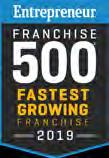





At Limitless Franchise Growth, our mission is to transform exceptional emerging franchisors into iconic brands, empowering them to achieve national expansion and market dominance. We are dedicated to unlocking their growth potential and enhancing the lives of small business owners and their communities with integrity and excellence.

PEOPLE
W e l e v e r a g e a t e a m w i t h
a p r o v e n t r a c k r e c o r d o f
s u c c e s s , c o m b i n i n g
e x p e r i e n c e a n d e x p e r t i s e
r e s u l t s .


by India Franchise Council
In the bustling world of SaaS innovation, few stories are as inspiring and as human as that of Hippo Video. What began as a series of lunchtime conversations among three colleagues at Zoho has evolved into a global AI-powered video platform that’s transforming how businesses communicate.
Founded in 2016 by Karthi Mariappan, Nilamchand Jain, and Srinivasan Krishnan, Hippo Video is not just a tech success story; it’s a testament to vision, resilience, and the power of purpose-driven innovation.
Originally envisioned as a Learning Management System, Hippo Video quickly pivoted to become a video-first SaaS platform. The founders recognized a growing demand for video content, especially content that could be personalized, scaled, and made interactive. This pivot wasn’t just strategic; it was visionary. It positioned Hippo Video at the forefront of the Generative AI revolution, where video is no longer optional; it’s essential. Today, Hippo Video is a Series B-funded AI video platform headquartered in Newark, Delaware, with teams in Texas, India, and the UAE. It has raised $14 million from
investors including Dallas Venture Capital, Alpha Wave Incubation, Exfinity Venture Partners, Sequoia Surge, and KAE Capital.
Karthi Mariappan, the CEO, is a product strategist with a rare blend of technical depth and market intuition. After 16 years at Zoho, where he built multi-million-dollar products, Karthi brought his engineering background and management acumen to Hippo Video. His leadership is grounded in a deep understanding of product-market fit and a relentless focus on user experience.
Nilamchand Jain, or Nilam, is the operational backbone. Having scaled Zoho Sheet and other Office Suite products, he brought a systems-level view to Hippo Video’s growth. Raised in a small village near Jaipur and later moving to Chennai, Nilam’s journey is a testament to adaptability and ambition. His business instincts, shaped by both formal education and family entrepreneurship, have been instrumental in scaling operations.

Srinivasan Krishnan, or Srini, is the technical architect. A data scientist and search technology pioneer, Srini led the development of Zoho Mail’s search infrastructure. At Hippo Video, he continues to push the boundaries of AI, building the platform’s core capabilities in video automation and personalization.
Together, they bring nearly 50 years of product development experience, a foundation that has enabled Hippo Video not only to survive but also to thrive in a competitive SaaS landscape.
While Hippo Video is often described as a video platform, that’s only the surface. At its core, it’s an AI automation engine designed to streamline operations in industries where human interaction is critical, none more so than hospitality.
Hotels face a unique challenge: delivering personalized, high-touch service at scale, across multiple locations, languages, and staff shifts. Hippo Video solves this by automating key workflows using AI-generated avatars and contextual video layers.
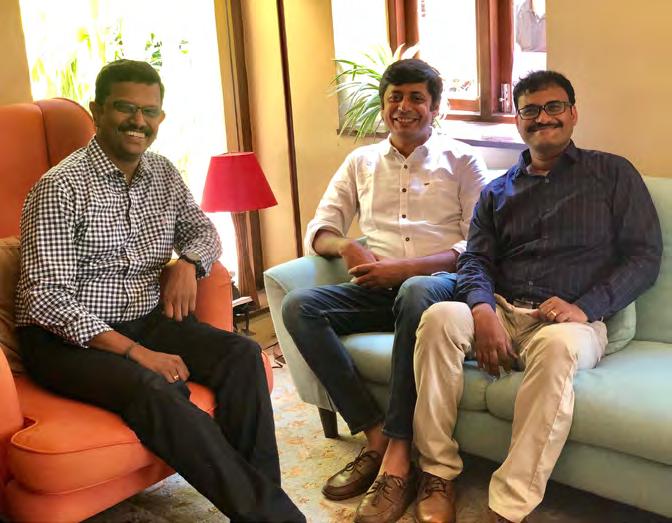
1. Proposal Automation for Events and Groups: Hippo Video automates the creation of personalized video proposals. Sales teams can respond to RFPs with interactive walkthroughs of event spaces, pricing, and logistics, cutting down clarification cycles by 80% and increasing conversion rates.
2. AI Concierge and FAQs: Front-desk teams are often overwhelmed with repetitive queries. Hippo Video automates this with AI-powered video FAQs that address common questions, check-in times, amenities, local attractions, 24/7, in multiple languages, without human intervention.
3. Guest Engagement Automation: Hotels can now automate personalized welcome messages, room upgrade offers, and loyalty nudges using full-body avatars that speak in the guest’s preferred language and tone. These aren’t generic videos; they’re AI-generated, contextaware, and tailored to each guest profile.
4. Staff Training at Scale: With attrition rates in hospitality often exceeding 100%, training is a constant operational burden. Hippo Video enables hotels to convert SOPs and manuals into interactive, avatarled modules. These can be accessed on-demand, include embedded assessments, and ensure consistent service delivery across properties.
SCALING AUTOMATION ACROSS FRANCHISES
Beyond hotels, Hippo Video is transforming franchise systems in fast-food, retail, and service chains.
Franchisees use the platform to:
• Automate onboarding and compliance training
• Localize marketing campaigns with AIgenerated videos
• Deliver consistent brand messaging across locations Franchisors benefit from centralized control, while franchisees gain access to tools that enable them to operate independently and efficiently. In industries where staff turnover can exceed 130%, this level of
automation is not just helpful, it’s essential.
Hippo Video holds a U.S. patent for its method of building interactive webpages narrated by avatars using auto-generated scripts. This isn’t just a feature, it’s a defensible moat. The platform’s AI engine automates everything from scripting to avatar generation, allowing users to create human-like video interactions from simple text prompts.
PHILOSOPHY THAT DRIVES IT ALL
What sets Hippo Video apart isn’t just its technology; it’s the mindset behind it. This is a company built by product people, for operations people. Every feature is designed to solve a real problem. Every innovation is grounded in user feedback. And every milestone reflects the founders’ belief that automation should feel personal, not robotic.
Eight years in, Hippo Video is still founder-led, still productobsessed, and still pushing boundaries. In a world where attention is fleeting and expectations are rising, Hippo Video is helping hotels

Seema Govil, a Versatile Leader: Bridging the Worlds of Franchise Consulting, Media, and Philanthropy as the Founder and CEO of Cosmo City Media. For franchising help, contact Seema at Seema@ thefranchiseconsultingcompany. com.



We remediate & mitigate. We don’t repair, maintain or replace. We educate our customers about what plagues their homes and we train our franchise owners to do so with the same confidence and compassion. REAL BENEFITS FOR OUR FRANCHISE OWNERS
From 2020 to 2021, revenue was up by 23%
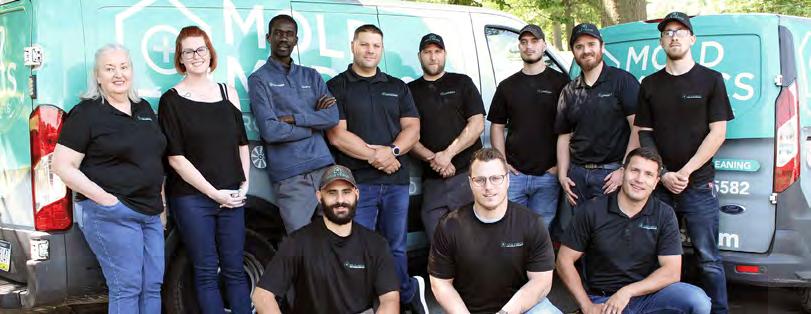
When I saw no negative reviews, I thought they were faked. No company can be that good. They are the exception to the rule. 5 stars are not enough to rate the professionalism, honesty, helpfulness and knowledge. It’s an industry where the homeowner really doesn’t know much and it easy for the company to scare you into spend more than you need...NOT Mold Medics. I highly recommened them to the degree that you’d be foolish to use anyone else.
Mold & radon don’t take winter off, so nither do we


• Full-service Wellness Studio offering mind/body recovery
• First franchise to offer “Contrast Therapy” (Sauna/Cold Plunge) with EIGHT unique revenue streams: Cryotherapy, IV Drip, Cold plunge, Float, LED light therapy, Sauna, Normatec & Retail
Minimal employee ownership model
Four corporate units open in Los Angeles with a fifth in development
Broad retail offerings focused on Sleep, Stress/Anxiety, Clean Beauty, Detoxification and Immunity, brands include Moon Juice, Bee Keepers, Osea, Quick Silver Scientific
• Top performing studio revenue: $1,975,984 in 2022
• Top performing Net Margin: 35% (After a 7% royalty deduction)
• 2,600-3,000 sq.ft
40+ licenses awarded with markets available: San Diego, San Francisco, Houston, and New York. Jen Rieck
VP of Fran Dev

for further detail. Past performance is not a guarantee of future results. Individual results may vary.
(720) 245-1252
by India Franchise Council
India is often described as a land of paradoxes: ancient yet futuristic, spiritual yet scientific, rooted yet cosmopolitan. These dualities are not contradictions but living proof of how India’s timeless traditions continue to shape the country’s evolving identity. From language and philosophy to food, festivals, and family values, ancient Indian culture remains a vibrant force in the modern world, not only within India but also across the global Indian diaspora.
ANCIENT
At the heart of Indian identity is its philosophical foundation systems like Vedanta, Yoga, and Ayurveda, which emphasize harmony, self-realization, and interconnectedness. These are not abstract concepts reserved for saints or scholars; they form the backdrop of everyday Indian life.
Morning prayers (puja), meditation, lighting of lamps, and even the ritual of removing shoes before entering a home are all practices passed down over centuries. These small, daily acts reflect a worldview that
respects purity, mindfulness, and the sanctity of space; values just as relevant today as they were in ancient times.
Even in India’s booming tech cities, many families still begin their day with Sanskrit mantras or yoga sessions. The ancient ideal of “Vasudhaiva Kutumbakam”—the world is one family—continues to inspire both personal ethics and India’s international diplomacy.
“Tradition is not the worship of ashes, but the preservation of fire.” — Gustav Mahler (and lived by India daily)
India’s festival calendar is a testament to its cultural continuity. Whether it’s Diwali, Holi, Navratri, Eid, or Pongal, these festivals are not merely events but immersive experiences that blend food, fashion, music, and stories rooted in sacred texts and historical tradition.
Even second and third generation Indians abroad find themselves returning to these traditions. Diwali lights up homes from Toronto to Tokyo, and Holi color runs are now global phenomena. These

celebrations act as cultural anchors, reconnecting people to their roots and providing a sense of belonging in a rapidly changing world.
More than nostalgia, they offer an intergenerational bridge, grandparents share legends and rituals with grandchildren, sustaining memory through experience.
India’s oral and literary traditions, from the epics of the Mahabharata and Ramayana to the fables of the Panchatantra, have long served as moral compasses. These stories are not static; they’re reimagined in comic books, web series, school plays, and even business seminars on leadership and ethics.
In a time of information overload, these age-old narratives provide clarity. Concepts like dharma (duty), karma (consequence), and seva (selfless service) remain powerful tools for making sense of the world.
“We don’t just inherit culture; we carry it forward, reshape it, and pass it on.”

In classrooms in Mumbai and living rooms in Melbourne, the resonance of these stories lives on, because they speak to universal human questions in a deeply Indian voice.
From Banarasi silk to Madhubani paintings, India’s traditional arts are enjoying a revival. Young designers are reinterpreting classical motifs for global runways. Artisans are using social media to sell directly to customers worldwide. This resurgence isn't about preserving relics; it's about celebrating relevance.
Handlooms, once considered old-fashioned, are now symbols of sustainability and slow fashion. Traditional crafts like block printing or terracotta pottery are being integrated into modern homes, not as exotic curios but as functional art.
In doing so, Indians are rejecting the binary between “modern” and “traditional.” Instead, they’re creating a fusion that reflects both pride
in heritage and openness to innovation.
While urban India embraces nuclear families and fastpaced life, the essence of joint-family valuesinterdependence, respect for elders, collective decisionmaking, still informs how many Indians navigate the world.
Arranged marriages coexist with dating apps; WhatsApp family groups preserve a sense of kinship across continents. Even in a digital age, the Indian instinct for community, consultation, and shared responsibility continues to guide personal and professional life.
For millions of Indians living abroad, tradition is a lifeline. Language classes, temple visits, cultural associations, and Indian grocery stores are more than conveniences, they’re vital nodes of identity.
What’s remarkable is how
younger generations are not just inheriting culture passively but actively curating it. They blend bhangra with hip hop, serve chai at pop-up cafes, and wear kurtas with sneakers. In doing so, they embody the continuity of tradition with the creativity of modernity.
“You can take an Indian out of India, but not India out of an Indian.”
India’s ancient traditions are not frozen in time, they are living, breathing forces that adapt, evolve, and inspire. In a world hungry for meaning, connection, and rootedness, Indian culture offers answers that are both timeless and timely.
As we mark Indian Heritage Month, let us remember that heritage is not just what we remember from the past, it is what we live in the present and protect for the future. From the sacred to the everyday, India's traditions are not just part of history; they are part of what makes us whole today.
Bhavana Taneja is a franchise consultant who helps aspiring entrepreneurs navigate the complex world of franchising through strategic guidance tailored to their goals and strengths. With over a decade of experience in business development and client engagement, she is passionate about empowering individuals to make confident, informed decisions that lead to sustainable business ownership. Contact Bhavana at bhavana@ thefranchiseconsultingcompany. com.


Affordable, scalable and profitable // Multi-unit retail/service opportunity // Legendary brand, category leader
Martinizing employs a unique real estate approach that seeks out existing dry cleaning business owners who are ready for an exit, allowing new franchisees to open quickly and minimize their initial investment.




Spanning Eight Countries Open for Business Quickly
Total Investment: $419K-$736K Net Worth Requirement: $700K

Existing Cleaner Acquisition Assistance // On-Going Operations & Marketing Support On-going. corporate support and education puts Martinizing owners on a path to success.
Site Selection // Financial Analysis // Store Design & Buildout // Comprehensive Training
*Individual financial results may differ from results stated in Item 19.
< Kira Kusky // kira.kusky@thinkhuntington.com (Jo Gonzalez // jo.gonzalez@thinkhuntington.com)
by Harold Montgomery, Global Growth CEO, iBuy App

In the ever-evolving world of digital marketing, the iBuy App stands out not just for its effectiveness in connecting local retailers with nearby shoppers— but also for the lucrative, recurring revenue it offers to franchise owners.
Designed specifically for cities with populations between 100,000 and 500,000, the iBuy App fills a gap in the advertising world: a hyperlocal, transparent, and results-driven platform that small businesses
actually understand and benefit from. But behind the scenes, iBuy’s real magic lies in its business model— especially for franchisees who operate the app in their territory.
Local retail stores constantly struggle to find advertising solutions that truly deliver value. Print ads are outdated. Social media is crowded and complicated. Paid search and

display ads are expensive, often with unclear results. That’s where the iBuy App comes in.
Retailers who advertise on the iBuy App pay a monthly subscription fee to list on the app. But what sets the app apart is its transparency: every month, advertisers receive a detailed report showing:
• The names of everyone who clicked on their ad
• A list of every customer who made a purchase using the app
This accountability builds trust—and results. Businesses see real foot traffic and real sales, all traceable back to the app. That kind of return on investment leads to high customer satisfaction and, more importantly, high advertiser retention.
For iBuy franchisees, this
model translates directly into predictable, recurring monthly income.
Let’s break down a sample scenario:
• A franchisee operates the iBuy App in a city with 250,000 residents
• They onboard 100 local businesses as advertisers
• 50% of them regularly hit the $300 monthly maximum charge
That’s $15,000/month in recurring revenue (50 advertisers × $300), plus variable income from those not yet at the cap. And because iBuy delivers value, those businesses stay on the platform.
This recurring model is built into the DNA of iBuy. It's not one-off campaign work or speculative ad sales. It's monthly, recurring, performance-based billing—a dream for any entrepreneur looking for sustainable income.
Unlike brick-and-mortar franchises or productbased businesses, an iBuy franchise has minimal overhead. There’s no inventory, no physical location, and no large staff required. The core responsibilities of a franchisee include:
• Building relationships with local business owners
• Onboarding new advertisers to the platform
• Providing monthly performance reports (automated by the app)
• Offering basic support and campaign guidance
Most of this can be done remotely or on a flexible schedule, making it ideal for solo entrepreneurs or small teams. And as each new advertiser joins, monthly revenue grows steadily.
One of the most powerful elements of the iBuy model is advertiser retention. Because the app shows clear results and only charges for actual ad engagement (with a hard cap), businesses don’t feel like they’re gambling their ad budget—they feel like they’re investing it. Franchisees benefit from this directly. Once a business is on board and seeing results, the monthly revenue becomes consistent, predictable, and sticky. That means less churn, lower acquisition costs, and better margins over time.
In a world where passive income and recurring revenue are buzzwords, the iBuy App offers something tangible: a real business that generates

real, repeatable cash flow.
• Recurring Monthly Revenue: The more businesses you onboard, the higher your predictable income.
• Proven Value to Clients: High retention means less time chasing new customers.
• Scalable Territory Model: Franchisees can expand their reach and income within their protected cities.
• Automated Reporting & Transparent Metrics: Less admin, more results.
The iBuy App isn’t just an advertising platform—it’s a franchise model for the modern economy. It combines the best of local commerce, digital marketing, and recurring revenue into one powerful package.
For entrepreneurs looking for a low-barrier, high-upside business opportunity with recurring monthly income, the iBuy App is more than just a good bet—it’s a smart



Craving a professional shift? Your career and life deserve a boost. Learn how a Boost Home Healthcare franchise can elevate the next steps in your professional journey.
Support includes:
• a proven business model
• attractive territories nationwide
• data-focused marketing partnership
The senior care industry, a robust and competitive market, generates $300 billion dollars a year. With a proven franchise that will inspire you and fulfill your entrepreneurial spirit, this Best Life Brands company will enable you to reach your career goals.




Ourmodelallowsmedicalprofessionalstoescapecorporate structuresandinsurancebilling, non-medicalinvestorstoinvestin thehealingartsandgeneratewealth,andsuccessfulpractitioners toaddadditionalrevenuestreams.
WeoperateclinicsinMississippi,Texas,andHawaii.Ourtraining, bothclassroomandon-siteatyourlocation,willbeconductedby peoplewho DO whattheyareteaching.
OurMississippiclinicgeneratedover$350KEBITDA* inits secondyearinbusiness,andourHawaiiclinicgeneratedjust under$300KEBITDA* itsfirstyearinbusiness!Combinedwithan initialinvestmentaslowas$170K*,NexGenEsisisinaclassofits own!
SeeourFranchiseDisclosureDocumentforacompleteinvestmentand earningsdisclosure.









by Vernon Gonsalves, Franchise Development Officer – Mad Science ® Group and Crayola ® Imagine Arts Academy™
For over 25 years, I have had the pleasure of supporting small business owners, mostly in the education franchise industry. These aspiring entrepreneurs identified with various cultures, but notably, many of them were of Asian or South Asian descent. As a person of Indian heritage, myself, one would think that I could identify with the customs and traditions, but having been raised with primarily Western influences, I found that my knowledge of my own culture by birthright was, ironically, lacking and quite foreign to me.
Today, we see how South Asian culture has garnered mainstream attention around the world, whether it be via the proliferation of Bollywood fans outside of India, Pakistan, Sri Lanka and other South Asian nations; increased awareness of cultural celebrations; or the influx of international students, who then became permanent residents or citizens and retained their rich cultural heritage in their new countries. Many of these enterprising individuals
established local businesses of their own, and throughout my corporate career, not just in franchising, I observed a growing trend: many entrepreneurs are seeking opportunities that combine meaning, impact, and cultural richness. Crayola Imagine Arts Academy is a business that does exactly that.
This is a franchise that does not just teach children to paint or draw - it invites them to explore the world, connect with global stories, and become thoughtful, creative problem-solvers. As part of Indian Heritage Month, we are proud to spotlight how our programming is uniquely aligned with themes of cultural diversity and global citizenship, especially through its inclusion of South Asian content.
Crayola Imagine Arts Academy has built rich, globally-inspired programming that does more than develop artistic technique. For example, one of our most vibrant themes is centered around the truck art of Pakistan. Children learn

how and why truck and bus drivers in Pakistan began adorning their vehicles with elaborate hand-painted designs—bold colors, intricate borders, jingling chains, and symbolic patterns and people. These decorated trucks and buses are not just mobile works of art; they are an expression of identity and pride.
PAKISTANI TRUCK/BUS ART
“A real-life example of truck art from Pakistan, where bold colors and handcrafted details turn everyday vehicles into storytelling canvases.”
In our class, students are introduced to these traditions through maps, real-life visuals, and handson creative projects. They assemble their own model buses, then add their own unique designs using patterns, borders and accessories inspired by South Asian imagery. Students practice the art technique of patterning, enhance their fine motor skills, and develop their multicultural awareness, all at once.

PAKISTANI BUS CLASSROOM PROJECT
“Students engage in handson learning during the Pakistani Bus Art class—one of Crayola® Imagine Arts Academy™’s most vibrant and culturally immersive after school classes.”
REAL ANIMALS. REAL STORIES. REAL EMPATHY. Another standout theme is Slithering Snakes, which features legendary herpetologist and conservationist, Romulus Whitaker, often called “The Snake Man of India.” His fascinating story—from catching his first snake in New York to founding the Madras
Snake Park in India—teaches children about conservation, biodiversity, and the importance of preserving global ecosystems. It’s a compelling way to build curiosity while developing art skills and environmental consciousness and compassion.
Beyond snakes, students explore other animals from South Asia, such as the endangered Asiatic lion, and the majestic Asian elephant
“The Asiatic lion once roamed across Asia. Only about 500 Asiatic lions remain in the wild in India. Students explore what makes these lions unique— and how conservation helps protect endangered species.” – Lion Sculptures Curriculum
“Children are introduced to the Asian elephant, and its ‘India-shaped ears’. Through factual descriptions and creativity, they learn about these gentle giants and how art can inspire others to protect these creatures.” – Elephant Silhouettes Curriculum
Through comparisons with their African counterparts, children learn about environmental challenges,

biological diversity, and how conservationists are working around the world -including in India -to protect these species. It’s education that builds empathy and awareness, not just knowledge.

GLOBAL CITIZENSHIP THROUGH CREATIVE LEARNING
At its core, Crayola® Imagine Arts Academy™ is about helping children become global citizens. Through art, geography, environmental science, and cultural appreciation, our programming helps students:
• Understand and respect other cultures
• See the world from multiple perspectives
• Approach challenges creatively and collaboratively

This holistic model is what makes it such a strong fit for entrepreneurs looking for purpose-driven ventures. Whether a franchisee has a personal connection to South Asia or simply believes in raising culturally aware children, the program provides a unique, meaningful foundation to build a business upon.
Franchisees don’t need to be artists or educators to succeed in this model. What they need is a desire to make a difference -and a willingness to engage with their local community. Crayola® Imagine
Arts Academy™ provides training, operational guidance, marketing support, and flexible business structures that allow franchisees to run programs in schools, community centers, and camps - without requiring a physical storefront. With a relatively low investment and the backing of a globally trusted brand, the franchise is accessible, inclusive, and adaptable. It’s ideal for those seeking a creative outlet, a career change, and a mission-driven business.
By integrating authentic
South Asian cultural content into our sessions - not as decoration, but as a meaningful part of the educational journey –Crayola® Imagine Arts Academy™ fosters pride, recognition, and mutual respect. As we celebrate Indian Heritage Month, we also celebrate the children who are discovering these traditions for the first time - and the entrepreneurs who make it all possible. This is what modern franchising can look like: inclusive, impactful, and rooted in storytelling. For those seeking a business that both honors heritage and shapes the next generation, Crayola® Imagine Arts Academy™ is a canvas full of possibility.
To learn more about bringing Crayola® Imagine Arts Academy™ to your community, visit https://www. imagineartsacademy.com/ franchising sales@imagineartsacademy. com Phone 1-833-204-6777
Vernon James Gonsalves is a Franchise Development Officer and Realtor based in Ontario, Canada. With over two decades of experience in franchising, education, and real estate, Vernon is passionate about helping entrepreneurs succeed while making a lasting impact in their communities.

Simplified model with potential to operate remotely
Only 1-3 employees
No CDL license requirements
Recession Resistant industry, classified as "essential"
Exclusive, patent pending DumpStor Pro container
100% Equipment Financing options available
All-in-one, user friendly business operating system
Versatile and streamlined product lineup for efficiency
Over 40 years industry experience for Franchisee support
No brick and mortar buildout requirements
Great territories available, inquire today!

DumpStor is a dumpster rental company with a unique edge Hitting the sweet spot in the market with their efficiently sized open top and enclosed dumpster products, DumpStor took it a step further by merging the dumpster and mobile storage industries into one patent pending product, The DumpStor Pro. Learn more about the exciting franchise opportunities before your territory is taken!


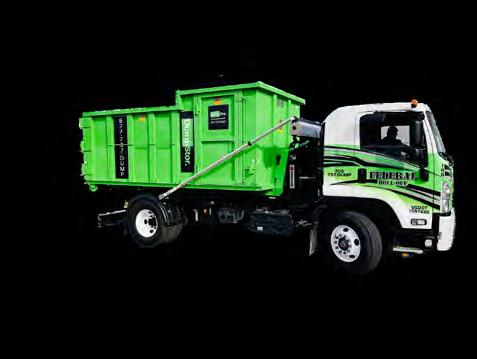
•Caring and compassionate
•Wants to give back and make a difference
•Strong networking skills
•Sales/marketing experience helpful
•Owner-operator, home-based business model
•Low start-up cost low overhead
•Top 1/4 of owners earn over $567,750 annually
•Recession resilient of franchisees had their highest-producing year in 2020 during COVID-19 crisis
•Scalable / high growth potential
• 2022 top franchisee earned over $2.2M (6 years in business)
Franchisee Fee
Average Investment
$40K – $80K (based on population)
$65K – $110K
•Self-motivated







Minimum Liquid Capital
Minimum Net Worth
Referral Fee
$40K
$150K
$38K ($24K or 10% [greater of] for Resales)
•Driven to build a strong and successful business!
•Business management skill set: time management and organization
Paul Young
Tim Evankovich
Executive Officer
•Zero to few employees
•Exclusive and large territories awarded
•National account relationships
•Comprehensive proprietary software
•Full service, in-house, robust marketing team for national and local marketing support
•Great franchisee validation
Oasis gave me a structure to build my business and the freedom to make it my own. Corporate is very supportive and always there to help with an issue or marketing support. Together we are building a sustainable, scalable business at a great time for growth in senior care. John H. // Central Ohio
The best part of being an Oasis Franchisee is truly making a difference in the lives of families at a critical time in their journey. I’ve learned so much about life from having the privilege to serve the wisest people on earth. In addition, it’s a pleasure to work with a network of franchisees that are equally passionate about to help people. Crystal D. // Fort Worth, TX
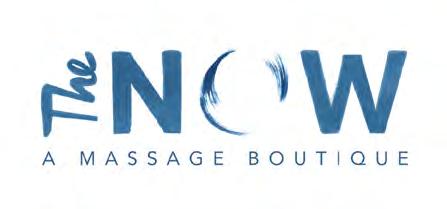

The NOW Massage, a new concept massage boutique, was founded on the principle that self-care is a necessity, not a luxury.
Designed to serve as an oasis from today’s digitally driven society, The NOW offers high-quality, affordable massage services in an inspired setting. The brand has recently signed franchise agreements representing 100+ locations in over 25 cities.

by Tony Jeary, The RESULTS Guy™
We recently invested time with our partners at Pet Planet in Edmonton, Canada, touring several of their standout franchise stores. What started as a routine visit quickly turned into something more eye-opening. Walking those locations reminded us of a powerful truth—signage matters. It sets the tone. It creates clarity. And when done right, it drives engagement and reinforces brand confidence.
Signage isn’t just something you check off when launching a location. It’s one of the most visible, impactful tools you have to communicate who you are and what you stand for. It shapes perception, influences decisions, and speaks volumes before your team ever says a word. That’s why signage deserves intentional focus. A signage audit isn’t about appearances—it’s about execution, alignment, and results.
Q: Tony, what should franchisors and franchisees be thinking about when it comes to signage?
Start with this question: Is our signage helping us
win? If your signage doesn’t reflect your brand standards, enhance customer experience, or guide action, you’re missing an opportunity.
Consistency is critical. Whether a customer is visiting your original flagship store or a new franchise in a different region, their experience should feel familiar. That starts at the curb and carries through every visual touchpoint. Signage is not a one-time install. It’s a key element in creating trust, clarity, and momentum.
Q: How should brands approach improving signage across multiple locations?
We encourage a structured, repeatable signage audit. It’s something you should build into your regular operational rhythms. Our team developed a 15-point signage review checklist that franchisees can walk through themselves or with a field support team (email info@tonyjeary.com if you’d like a copy).
Things like visibility from the street, alignment with brand colors and logos, message clarity, lighting conditions, and the condition of materials all matter. Even floor mats, window clings, and directional signs can either elevate or

distract from your customer experience.
One of the best practices we recommend is documenting each location with photos— before and after updates—and reviewing that imagery side by side. The visual comparison can spark powerful discussions and uncover small adjustments that lead to big improvements.
Q: What are some common challenges you see?
Often, it’s not about negligence—it’s about not having a system. Some locations may be doing things really well, and others might have slight inconsistencies that go unnoticed. The key is to create a common standard and then inspect what you expect.
Signage should reflect the clarity, quality, and professionalism of your brand. That means no outdated promotions, no clutter, and no guesswork for the customer. Lighting is another detail that’s easy to miss. If your signage looks great during the day yet disappears at night, that’s something worth improving.




Q: What’s the real payoff for getting signage right?
Strong signage builds alignment and enhances the customer experience. It supports branding, increases visibility, and reinforces the feeling that your business is well-run and trustworthy.
More than that, when signage is intentional and consistent, it makes your whole organization look sharp. Customers notice. Team members notice. Prospective partners notice. It’s a detail
that says, “We’re aligned. We care. We operate with excellence.” Most importantly, it gets people in the door. I saw it in action with Pet Planet, and I saw how it’s worked to strengthen their already stellar organization.
If it’s been a while since you’ve done a signage audit, take the time to walk through your locations with fresh eyes. Use the checklist, capture photos, talk with your team, and look for ways to raise the bar.

When signage is aligned with your brand, clear in its messaging, and visually sharp, it elevates everything else. And that’s the kind of clarity that drives results.
Tony Jeary is a strategist, keynoter, coach to the world’s top CEOs and prolific author of over 100 titles. Tony lives in Flower Mound and works out of his think tank, the RESULTS Center, where he and his team encourage and inspire all those he touches, resulting in their enhanced sales and profitability and raising their companies’ value.










































• Professional B2B Payroll & Workforce Management Services Business
• Low Capital Investment <$100K
• Recurring Revenue/Exceptional ROI
• No Retail Build Out & Quick 90 Start Up
• Full Training & Ongoing Support Leveraging Top Technology





















BENEFITS OF MAACO
5DAYS OF OPERATION 8AM - 5PM PURCHASING POWER
200+ NATIONAL FLEET ACCOUNTS
DEDICATED SUPPORT SYSTEMS
QUALIFICATIONS

by India Franchise Council
While much attention is paid to larger immigrant groups in the United States, the Sri Lankan American community stands out as a highly educated, professionally accomplished, and civically engaged population — despite its relatively small size.
According to the U.S. Census Bureau and analysis by Pew Research Center, there were an estimated 61,000 Sri Lankan Americans in 2023. Though this places them among the smaller Asian origin groups in the U.S., their contributions — especially in education, healthcare, and technology — far exceed their numbers.
As someone working with first-generation entrepreneurs and professionals from across South Asia, I’ve had the privilege to observe the excellence and potential within the Sri Lankan diaspora. Here's an in-depth look at this community’s demographics, strengths, and opportunities for growth — compared to Asian Americans and the U.S. at large.
• Estimated Population (2023): 61,000
• 68% are foreign-born, compared to:
- Asian Americans: 66%
- U.S. overall: 14%
• Over 60% of Sri Lankan immigrants have lived in the U.S. for more than 10 years
• A majority are now naturalized U.S. citizens Takeaway: The Sri Lankan American population is wellestablished and relatively settled, with strong roots in U.S. society and institutions.
Top states with Sri Lankan American populations:
• California
• New York
• Texas
• New Jersey
• Florida
Top metro areas:
• Los Angeles
• New York City
• San Francisco Bay Area
• Dallas-Fort Worth
Takeaway: Like many professional immigrant

communities, Sri Lankans tend to cluster in diverse, opportunity-rich metro areas where healthcare, tech, and academia flourish.
AGE & GENERATIONAL PROFILE
• Median Age: ~37 years
- vs. Asian Americans: 34.7
- vs. U.S. overall: 38.9
• The community includes both longterm immigrants and a growing U.S.-born second generation
• A high share of workingage professionals (25–54)
Takeaway: A mature, professional population wellpositioned for leadership, mentorship, and generational business transition.
LANGUAGE & ENGLISH PROFICIENCY
• English Proficiency (ages 5+): ~85%
- vs. Asian Americans: 74%
- vs. U.S. overall: 91%
• Home languages include:
- Sinhala
- Tamil
- English
Takeaway: English fluency is a strength — helping the community integrate into mainstream business, education, and civic life with relative ease.
• 75% of Sri Lankan Americans age 25+ hold a bachelor’s or higher degree
- vs. Asian Americans: 56%
- vs. U.S. overall: 38%
• High representation in:
• STEM fields
• Healthcare
• Academia
• Engineering & IT Takeaway: This is one of the most highly educated groups in the country — a strong foundation for leadership in medicine, research, entrepreneurship, and policy.
Median Household Income (2023):
• Sri Lankan: $109,000
- vs. Asian Americans: $105,600
- vs. U.S. overall: $79,200
Median Personal Earnings (16+):
• Sri Lankan: $57,000
- vs. Asian Americans: $52,400
- vs. U.S. overall: $44,200
Poverty Rate:
• Sri Lankan Americans: 5%
- vs. Asian Americans: 10%
- vs. U.S. overall: 11%
Takeaway: High education translates into high earnings and low poverty — a model
example of immigrant upward mobility.
• Sri Lankan Americans are active in:
- Healthcare professions (especially physicians and nurses)
- University faculty and research
- Engineering and IT leadership roles
- Entrepreneurship in consulting, retail, and franchising
• Small but growing interest in franchise investment, particularly among second-generation professionals seeking diversification
Takeaway: This community has the human capital and financial resources for greater ownership — especially in multi-unit franchising, professional services, and real estate portfolios.
• Homeownership Rate: ~70%
- vs. Asian Americans: 62%
- vs. U.S. overall: 66%
Takeaway: Sri Lankan Americans outperform both Asian and national averages — a sign of stability, wealthbuilding, and long-term commitment to the U.S.
• Marriage Rate: ~66%
- vs. Asian Americans: 58%
- vs. U.S. overall: 48%
• Community organizations, religious temples, and cultural festivals (especially Sinhala & Tamil New Year) play key roles in preserving identity
Takeaway: Family values and cultural cohesion remain vital — providing a strong foundation for the next generation.
Though smaller in number, Sri Lankan Americans represent one of the most accomplished, educated, and financially secure Asian origin groups in the U.S. With high English proficiency, strong household incomes, and a deep commitment to education, they are uniquely positioned for sustained upward mobility and business leadership.
As a consultant and advocate working to help immigrants build legacy businesses and wealth through franchising, I believe the Sri Lankan community is ripe for greater engagement in multi-unit ownership, real estate ventures, and succession planning. With the right access to capital and mentorship, their future impact can be far greater than their current visibility.
Jack Tiwari is a seasoned business consultant, community leader, and cultural advocate. With a deep understanding of the franchise industry, he helps entrepreneurs achieve success in franchise sales and acquisitions, business development, and social impact. Contact Jack at jack@ thefranchiseconsultingcompany. com.



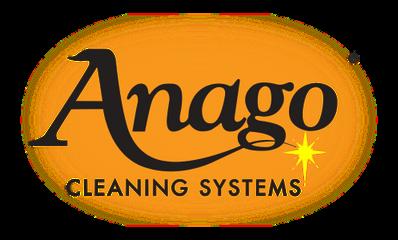
by Mevlut Hilmi Cinar, Consultant, The Franchise Consulting Company
I’m a first-generation immigrant. I know the grind of starting over in a new country. The language may be foreign, the rules unspoken, and the networks nonexistent. But you find a way. You build. You contribute. You make it home. That’s why I hold deep admiration for the Indian-American community.
Across the United States, Indian immigrants and Indian-Americans have emerged as some of the most influential leaders in business, politics, and media. As a franchise consultant with decades of experience, I believe their journey offers powerful lessons—not just for those of Indian heritage, but for anyone striving to turn legacy into leadership.
Let’s explore what this community continues to accomplish—and how the franchising world can both learn from—and serve—them.
Indian-Americans are among the most entrepreneurial communities in the country. You’ll find them leading Fortune 500 companies (think Satya Nadella at Microsoft, Sundar Pichai at Google), founding tech unicorns, investing in innovation—and above all, owning and scaling


franchises into multi-unit empires.
What sets them apart? A combination of education, discipline, and intergenerational grit. Many arrived in the U.S. with STEM degrees and a deep respect for learning. They embrace systems—exactly why franchising is a natural fit. A franchise offers a proven model, but still rewards initiative and strategic thinking. That synergy is where Indian-American franchise owners shine.
In sectors like hospitality, education services,
convenience retail, and healthcare support, they consistently outperform. They scale efficiently, reinvest wisely, and often involve family— transforming single-unit shops into multi-generational businesses.
In fact, the Indian-American contribution to the U.S. franchise ecosystem is both immense and genuinely applaudable. Their entrepreneurial leadership has quietly—yet powerfully— helped build some of the nation’s most successful franchise networks.
If entrepreneurship was the first frontier, politics is now the next. Indian-Americans are increasingly visible in U.S. governance. Their rising presence is not just symbolic— it’s fundamentally strategic.
The current Director of the FBI is Kash Patel, an Indian-American confirmed by the Senate on February 20, 2025 to lead the Bureau. His appointment marks a significant moment in national leadership—and underscores greater representation at the highest levels.
Meanwhile, Vice President Kamala Harris, with Indian roots, made history with her election. In Congress, leaders like Ro Khanna and Pramila Jayapal continue to bring Indian-American perspectives to federal policy.
In Illinois—where I used to live—my own congressman was Raja Krishnamoorthi, a proud graduate of my alma mater, Harvard University. I witnessed firsthand his impact: helping small businesses grow, supporting franchise operators, and personally advocating for immigrant families navigating complex legal and business challenges. Now running for the U.S. Senate, I’m confident he will carry that same integrity and effectiveness to the next level.
Another political star rising fast is Zohran Mamdani, a Ugandanborn Indian-American raised in Queens, New York. At just 33 years old, he won the 2025 New York City Democratic mayoral primary, defeating a slate of landmark figures including
former Governor Andrew Cuomo. Mamdani’s story is the classic American dream: the son of immigrants who worked his way up through community organizing, was elected to the New York State Assembly, and is now one step away from becoming the first IndianAmerican mayor of New York City. His campaign—centered on working-class uplift, housing reform, and equitable transit— has energized a new generation of civic leaders.
Their rise in federal and local leadership matters for every small business owner. Public policy—from immigration access to tax regulation and small-business support—shapes the world of franchising. Indian-American leaders are not just participating—they are helping shape a more inclusive and business-forward economy.
Representation isn’t just politics—it’s storytelling. Indian-Americans are increasingly shaping the national narrative—from journalists to filmmakers to authors. Their stories reposition what leadership looks like in America. When IndianAmerican success is featured on TV, in print, or online—it signals cultural belonging across every American space.
That representation amplifies confidence among aspiring Indian-Americans exploring franchise ownership. It also challenges franchise brands to evaluate how inclusive their hiring, marketing, and community engagement truly are.
As a first-generation immigrant myself, I see this story in my own life. My journey was built on sacrifice, long hours, and relentless optimism. I arrived with few connections, yet a clear vision for my family’s future. I worked, studied, and pushed harder than most.
Indian-American families share this experience: education became a bridge; discipline became an engine; opportunity became a mandate. That ethos mirrors franchising: you invest in a proven system, you commit to excellence, and over time, you build something that lasts.
For franchisors looking to build meaningful networks, the Indian-American community presents both alignment and opportunity:
Education Franchises: STEM centers, tutoring services, enrichment programs align well with strong cultural emphasis on learning.
System-Aligned
Entrepreneurs: Many IndianAmerican franchisees prefer structure—they thrive in a
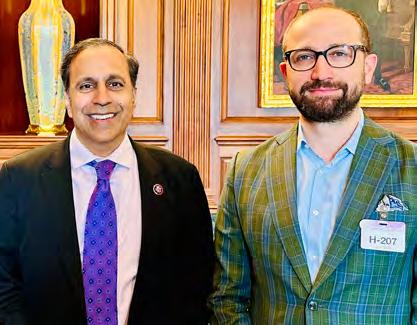
THE
process-driven environment.
Family Businesses: Multigenerational operation is common, and single units often evolve into scaled ventures.
Long-Term Visionaries: They tend to play the long game— not quick flips—making them ideal partners for franchise development.
This article isn’t simply a celebration of Indian-American success. It’s a testament to what happens when ambition meets
structure—when proven systems meet community energy.
The contributions to business, politics, and media are plentiful. But more importantly, they reflect the potential of a community that has turned first-generation ambition into generational leadership.
To those in the franchise world: these are not just stories. They are partners, operators, advocates, and co-builders. And if you're an Indian-American professional considering business
ownership—consider this your invitation. You already have what it takes. Now it's time to own it—literally.
Mevlut “Hilmi” Cinar is a first-generation Turkish immigrant who arrived in the U.S. 23 years ago and worked his way up from modest beginnings to become a Harvard graduate, successful entrepreneur, and well-respected franchise consultant. Having built, scaled, and exited multiple businesses, he now advises professionals at the beginning of their journeys—helping them chart paths to freedom, purpose, and prosperity through proven franchise models.Contact Mevlut at Hilmi@ thefranchiseconsultingcompany.com.

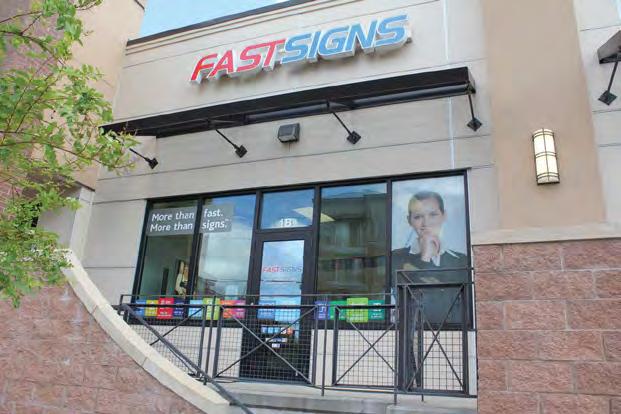
FASTSIGNS provides candidates with an Item 19 including full profitability information. And you’ll enjoy owning a business with these compelling features:
• Business-to-business hours
• Low staffing requirements
Franchising Since: Founded 1985

• Professional business clientele
• Attractive margins
Total Franchise Operating Units: Over 700 in 9 countries
Minimum Liquid Capital: $80,000
Minimum Net Worth: $300,000
Total US Investment: $218,596 - $298,679
Total Canadian Investment: $257,626 - $338,718 CAD
Franchise Fee: $49,750
VetFran & First Responders Discount: $24,875 Franchise Fee
Royalty (per unit): 6% (Reduced to 3% for 12 months)
Advertising Fund (per unit): 2% (Reduced to 1% for 12 months)
FASTSIGNS has over 400 markets approved for development in the US and Canada and is also seeking Master or Area Developer expansion in markets worldwide
• Site selection and build-out
• Four weeks of training, including one week of training in a FASTSIGNS center, followed by two weeks at our Dallas Headquarters, and one week of onsite training in your new center
• Pre-opening marketing blitz to drive your sales and reduce ramp time
• Grand opening support and guidance from an Outside Sales Manager and Brand Ambassador
• Dedicated Business Consultants to assist with business/finances training, marketing and sales, production and staff management
• Franchisee Mentor Program to guide you and lend support in every aspect of your business
• 24-hour web-based learning management system that keeps you and your staff up-to-speed and in-the-know in this fast-paced market











